
130 Excellent Economics Research Topics To Consider
Table of Contents
Are you an economics student searching for good topics for your research paper? If yes, then keep on reading this blog. To make the topic selection process easier for you, here we have suggested a list of the best economics research topics on various areas associated with the subject. In addition to that, we have also presented a brief overview of economics research paper topic selection and writing.
Quickly explore the entire list and choose any ideal topic for composing your economics thesis or dissertation.
Economics Research Paper Topic Selection and Writing
Have your professor asked you to submit an economics research paper? If yes, then topic selection is the first step you should do. In case, your supervisors had not suggested any research ideas, make sure to choose a unique economics research topic that you are interested in. The topic you choose should be understandable for you and your readers, and it should also have a wide research scope with the necessary information for crafting a comprehensive research paper or essay.
After you have selected a research topic for your economics assignment, sketch an outline with the research ideas that you have gathered. Then, with the help of the essay outline you have prepared, draft the research paper in a well-structured manner by including the essential elements such as the introduction, body, and conclusion.
The introduction paragraph of your research paper should have a catchy opening sentence, brief background information on the topic, and a strong thesis statement addressing the purpose of your research paper. After the introduction, in the body paragraphs, you should include innovative topic sentences and explain your arguments with supporting evidence in a way to persuade your reader. Then, you should finally close your research paper with an engaging conclusion that contains a brief summary of the main points.
List of the Best Economics Research Paper Topics
You may think that it is easy to choose a research topic for your economics research paper. But actually, it is not. As economics is a complex and broad subject, choosing a perfect research topic from it is a daunting task.
If you are asked to write an economics research paper or essay, then you can prefer to choose a topic from economics research areas such as macroeconomics, microeconomics, behavioral economics, agricultural economics, development economics, financial economics, and so on.
Here, we have sorted different categories of economics topics and have recommended a list of excellent economics research topic ideas for you to consider. Go through the entire list and pick a topic that is ideal for writing academic papers as per your instructor’s requirements.
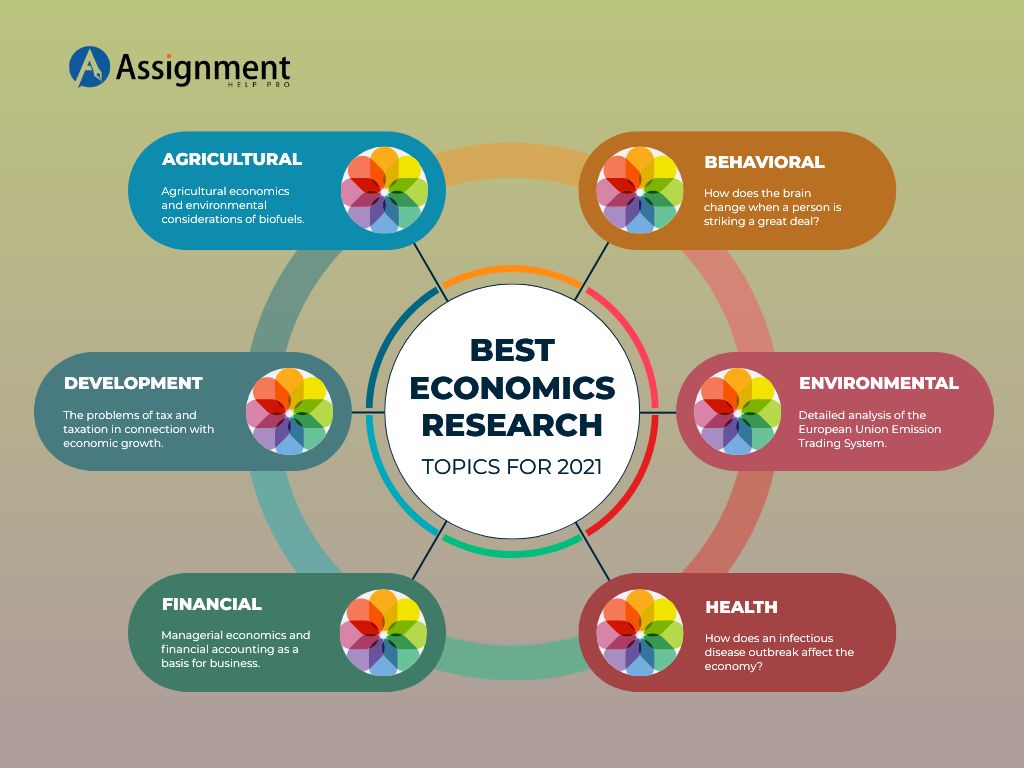
Agricultural Economics Research Topics
- Farmer’s contribution to agricultural social capital.
- Agricultural economics and agribusiness.
- An analysis of economic efficiency in agriculture.
- Agricultural and resource economics.
- Agricultural economics and environmental considerations of biofuels.
- Analysis of food security and poverty status among households in Ehime Mbano
- Role of bank loans and credit facility in financing Nigerian agriculture sector: a case study of Nigeria agricultural cooperative and rural development bank
- Evaluation of the impact of micro-finance banks on the South African agriculture sector
- How poultry farming is becoming a veritable tool for the economic empowerment of South Africa?
- Critical analysis of the problems and prospects of agriculture financing in rural India
Behavioral Economics Research Paper Topics
- What does the economy of trust mean?
- How does the brain change when a person is striking a great deal?
- The impact of economic stability on the social life of a person
- The buying capacity and gender
- How does race relate to economic power?
- Big data and its implications for behavioral economics
- The impact of behavioral finance on investment decisions.
- Cognitive and behavioral theories in economics.
- Behavior implications of wealth and inequality.
- Using behavioral economics to help in reducing substance abuse
Development Economics Research Topics
- The relation between development and incentive for migration.
- The economic consequences of population growth in developing countries.
- The determinants of high-performing institutions in emerging economies
- The impact of globalization on income distribution in emerging economies
- The problems of tax and taxation in connection with economic growth.
- The economic impact of terrorism on developing markets.
- Investigate the relationship between family planning, labor force, and income fluctuations.
- The impact of natural disasters on the economy and political stability of emerging markets.
- Budgeting and decision-making by low-income earners in emerging economics
- The impact of multinational commodity trading through the development of economic perspective.
- Compare and contrast the impact of demand-pull inflation and cost-push inflation on a country’s economy
- Discuss the impact of multinational commodity trading through the perspective of development economics
- Discuss the concepts of mercantilism, linear stages of growth model, economic nationalism, and structural-change theory
- Investigate the relationship between unemployment and fluctuations in national income
- Compare and contrast the economic patterns of villages across Papua New Guinea
Environmental Economics Research Paper Topics
- Explain the energy markets’ economic potential.
- How does global warming affect economic growth?
- How technological advancement leads to economic growth
- Evolution of economic institutions concerning climate change
- Cost-benefit analysis of the regulation of the environment
- The economic perspectives of the distribution of natural resources across boundaries
- The relationship between financial subsidies and the generation of eco-friendly products
- Detailed analysis of the European Union Emission Trading System
- Why it’s important to analyze the economics of clean drinking water
- How wildlife protection affects the economy
Read more: Outstanding Environmental Science Topics for You to Consider
Financial Economics Research Topics
- Risk-taking by mutual funds as a response to incentives.
- Financial economics for infrastructure and fiscal policy.
- Managerial economics and financial accounting as a basis for business
- The analysis of the global financial crisis of 2020
- Stock market overreaction.
Health Economics Research Ideas
- How do chronic diseases affect the workforce and the economy?
- How can public hospitals optimize their revenue collection?
- The economics of the pharmaceutical industry
- How an unhealthy country translates into a poor country
- Is the world’s hunger affected by economics?
- How does perfect competition work in the pharmaceutical world?
- How does an infectious disease outbreak affect the economy?
- Is health insurance important?
- How is the economy affected by a smoking ban?
Research Paper Topics on International Trade
- What are the gains and losses of international trade for developing countries?
- The importance of international trade in developing countries
- The relationship between economic growth and international trade
- The impact of Brexit on small and middle businesses in the UK
- To what extent does a currency union affect trade?
- The roles of exchange rate and exchange rate regime in the US export.
- To what extent are the gains of less developed countries from trade liberalization exaggerated?
- Foreign direct investment in the United States: Determinants and impact
- The relationship between foreign direct investment and wages
- The effects of the banana crisis on the Jamaican and British economies
Macroeconomics Research Topics
- Global recession and factors that contribute to it.
- The relationship between Internet connectivity and productivity in the workplace.
- The relationship between economic growth and unemployment in your country.
- Income Dynamics and demographic economics.
- What should our government do to minimize the risks of future default?
- The connection between politics and economics.
- The world problems through macroeconomic analysis .
- US Market Liquidity and Macroeconomics.
- The structure, history, and activities of the World Bank.
- Economics of education in developing markets.
- Public policies and socio-economic disparities.
- Banks and their role in the economy.
- Problems and possible solutions for Japan macroeconomics.
- State regulation of the economy in foreign countries: main models of regulation.
- The effect of currency devaluation on small and medium firms
- A comparison of the United States unemployment to the rest of the world
- The relationship between common stock prices and inflation in your country.
- Macroeconomics and self-correction of the economy.
- Analysis of Africa’s macroeconomics and its performance.
- The implications of Internet banking on bank profitability.
Read more: Best Macroeconomics Research Topics and Ideas for Students
Microeconomics Research Topics
- Explain how competition influences the price.
- Opportunity costs explained from a microeconomics perspective
- Inflation sources and consequences explained
- The impact of demonetization on small and medium businesses
- The connection between the minimum wage and market equilibrium.
- Perfect competition in microeconomics
- Theories in microeconomics
- The effect of labor force participation on the economy and budget
- Economic inequality as a result of globalization.
- Explain the balance between supply and demand in microeconomics
- Dynamics of the Gini index as a reflection of the problem of inequality in income
- Privatization of Public Enterprises and its implications on economic policy and development
- How does the stock market work?
- The impact of game theory on economic development.
- The changes in oil prices: causes and solutions.
- Marketing uses in microeconomics.
- The economic explanation of political dishonesty.
- How company mergers and dissolutions impact the economy
- The role of tax collection agencies in microeconomics
- Different microeconomic models and how they face the effect of industry conditions
A Few More Microeconomics Research Ideas
- How exactly does Uber fit into the economy of trust?
- How does a person’s brain alter when they hit a big deal?
- missing practical human insights from big data and how this affects the economy.
- explaining how supply and demand are balanced in microeconomics
- Changes in economic institutions with regard to climate change
- Effects of greenhouses on economic growth
- Effects of climate change on economic growth
- Analysis of the European Union Emission Trading System in great detail
- Is resource management for waste scarce? A microeconomics explanation of opportunity costs
- Effects of wildlife protection on the economy
Interesting Economics Research Topics
- What role does entrepreneurship play in economic development?
- How do automation and artificial intelligence affect the labor market?
- Discuss the Economics of healthcare systems and policies in developing countries.
- Explain the effects of trade agreements on income distribution.
- How does foreign aid affect economic development?
- Explain the impact of monetary policy on financial markets and inflation.
- Discuss the effects of income inequality on social mobility.
- How does tax reform impact business investment?
- Explain the role of microfinance in alleviating poverty.
- How does behavioral economics impact personal savings habits?
From the list of economics research topics recommended in this blog, choose any topic of your choice and craft a top-quality research paper or essay. It is not necessary that you need to use the suggested topic as it is, you can also modify the research topic and write your academic paper. In case, you are unsure how to select the right topic and write a persuasive economics research paper, get in touch with us immediately.

Related Post

110 Hard Words to Spell for Students and Adults

Learn How to Avoid Passive Voice in 3 Simple Steps

117 Best Greek Mythology Essay Topics For Students
About author.
Jacob Smith
I am an Academic Writer and have affection to share my knowledge through posts’. I do not feel tiredness while research and analyzing the things. Sometime, I write down hundred of research topics as per the students requirements. I want to share solution oriented content to the students.
Leave a Reply Cancel reply
You must be logged in to post a comment.
- Featured Posts
140 Unique Geology Research Topics to Focus On
200+ outstanding world history topics and ideas 2023, 190 excellent ap research topics and ideas, 150+ trending group discussion topics and ideas, 170 funny speech topics to blow the minds of audience, who invented exams learn the history of examination, how to focus on reading 15 effective tips for better concentration, what is a rhetorical analysis essay and how to write it, primary school teacher in australia- eligibility, job role, career options, and salary, 4 steps to build a flawless business letter format, get help instantly.
Raise Your Grades with Assignment Help Pro
- Privacy Policy

Home » 500+ Economics Research Topics
500+ Economics Research Topics

Economics is a vast and fascinating field that explores how individuals, businesses, and governments make decisions about the allocation of resources. As such, it provides a wealth of research opportunities for those interested in understanding and analyzing the complexities of modern society. From macroeconomic issues such as globalization and monetary policy, to microeconomic topics such as consumer behavior and market competition, there are numerous research topics that economists can investigate. In this post, we will explore some of the most interesting and relevant economics research topics that are shaping our world today.
Economics Research Topics
Economics Research Topics are as follows:
- The impact of technological change on income inequality.
- An analysis of the relationship between exchange rates and foreign direct investment.
- The effects of tax incentives on small business growth and development.
- The determinants of economic growth in developing countries.
- The impact of globalization on economic growth and development.
- An analysis of the effects of the minimum wage on employment and poverty.
- The role of central banks in managing inflation and economic stability.
- An investigation into the factors influencing consumer behavior and spending.
- An analysis of the impact of trade liberalization on economic growth.
- The effects of income inequality on social welfare and economic stability.
- The role of international trade in economic development.
- An investigation into the relationship between education and economic growth.
- An analysis of the effects of corruption on economic growth and development.
- The impact of the gig economy on employment and wages.
- An investigation into the causes and consequences of financial crises.
- The role of innovation in economic growth and development.
- An analysis of the impact of government spending on economic growth.
- The effects of globalization on the environment.
- The impact of climate change on economic growth and development.
- An investigation into the determinants of poverty and inequality.
- The role of entrepreneurship in economic growth and development.
- An analysis of the effects of monetary policy on economic growth and stability.
- The impact of immigration on labor markets and economic growth.
- An investigation into the factors influencing international trade flows.
- An analysis of the effects of foreign aid on economic development.
- The role of financial intermediaries in economic development.
- An investigation into the causes and consequences of income inequality.
- The impact of trade agreements on economic growth and development.
- An analysis of the effects of government regulation on business and economic growth.
- The role of technology transfer in economic development.
- An investigation into the effects of economic sanctions on trade and economic growth.
- The impact of population growth on economic development.
- An analysis of the effects of infrastructure investment on economic growth.
- The role of natural resources in economic development.
- An investigation into the effects of labor market policies on economic growth and employment.
- The impact of financial innovation on economic growth and stability.
- An analysis of the effects of income tax policy on economic growth and income distribution.
- The role of social capital in economic development.
- An investigation into the impact of economic policies on international trade.
- The effects of financial liberalization on economic growth and stability.
- The impact of urbanization on economic development.
- An analysis of the effects of international migration on labor markets and economic growth.
- The role of institutions in economic development.
- An investigation into the effects of exchange rate volatility on international trade.
- The impact of demographic change on economic growth and development.
- An analysis of the effects of government debt on economic growth and stability.
- The role of foreign investment in economic development.
- An investigation into the effects of labor market flexibility on economic growth and employment.
- The impact of intellectual property rights on innovation and economic growth.
- An analysis of the effects of economic inequality on social mobility and economic growth.
- The impact of COVID-19 on the global economy.
- The role of financial markets in economic growth.
- The effectiveness of monetary policy in stabilizing the economy.
- The relationship between income inequality and economic growth.
- The impact of government regulations on business activity.
- The role of technology in shaping the future of the economy.
- The effect of globalization on the labor market.
- The impact of trade policy on economic growth.
- The relationship between education and economic growth.
- The effectiveness of fiscal policy in stimulating economic growth.
- The impact of immigration on the labor market.
- The effect of tax policy on economic growth.
- The role of entrepreneurship in economic development.
- The impact of environmental regulations on economic growth.
- The effect of international capital flows on the economy.
- The relationship between innovation and economic growth.
- The impact of demographic changes on the economy.
- The role of infrastructure investment in economic growth.
- The effect of monetary policy on income inequality.
- The impact of government debt on economic growth.
- The relationship between corruption and economic growth.
- The effect of globalization on income inequality.
- The impact of education on income inequality.
- The role of social welfare programs in reducing poverty.
- The effect of minimum wage laws on the labor market.
- The impact of health care policy on economic growth.
- The relationship between energy prices and economic growth.
- The effect of government subsidies on business activity.
- The impact of exchange rate fluctuations on trade.
- The role of financial innovation in economic development.
- The effect of social media on consumer behavior.
- The impact of consumer confidence on economic growth.
- The relationship between economic growth and political stability.
- The effect of demographic changes on income inequality.
- The impact of government spending on economic growth.
- The role of labor unions in the labor market.
- The effect of natural disasters on the economy.
- The relationship between economic growth and environmental sustainability.
- The effect of corporate social responsibility on business activity.
- The impact of intellectual property rights on innovation.
- The effect of cultural differences on business activity.
- The impact of financial crises on the economy.
- The relationship between economic growth and health outcomes.
- The effect of government corruption on economic growth.
- The impact of demographic changes on the labor market.
- The effect of foreign aid on economic growth.
- The impact of technological change on the labor market.
- The effect of monetary policy on income distribution.
- The impact of trade agreements on economic growth
- The effect of corruption on economic development
- The relationship between financial development and economic growth
- The impact of foreign aid on economic growth in developing countries
- The role of innovation in promoting economic growth
- The impact of globalization on income inequality
- The relationship between inflation and economic growth
- The role of natural resources in economic development
- The impact of government expenditure on economic growth
- The relationship between income distribution and economic growth
- The impact of monetary policy on economic growth
- The role of education in promoting economic growth
- The impact of entrepreneurship on economic development
- The relationship between taxation and economic growth
- The impact of infrastructure on economic growth
- The role of international trade in economic development
- The impact of fiscal policy on economic growth
- The relationship between financial liberalization and economic growth
- The impact of economic integration on economic growth
- The role of institutions in promoting economic development
- The impact of foreign direct investment on economic growth
- The relationship between inequality and economic growth
- The impact of social welfare programs on economic growth
- The role of technology in promoting economic growth
- The impact of political instability on economic growth
- The relationship between corruption and economic growth
- The impact of labor market policies on economic growth
- The role of human capital in promoting economic development
- The impact of health care on economic growth
- The relationship between exchange rates and economic growth
- The impact of foreign trade on income distribution
- The role of entrepreneurship in economic development
- The impact of environmental policies on economic growth
- The relationship between foreign aid and poverty reduction
- The impact of financial sector reforms on economic growth
- The role of social capital in promoting economic development
- The impact of regional integration on economic growth
- The relationship between public investment and economic growth
- The impact of monetary policy on income distribution
- The role of international migration in economic development
- The impact of labor market flexibility on economic growth
- The relationship between trade and technology transfer
- The impact of institutional quality on economic growth
- The role of financial sector development in promoting economic growth
- The impact of regional inequality on economic growth
- The relationship between education and poverty reduction
- The impact of foreign debt on economic growth
- The role of social protection in promoting economic development
- The impact of energy policies on economic growth
- The relationship between foreign trade and environmental sustainability
- The impact of international trade on income inequality.
- The relationship between public debt and economic growth.
- The effect of tax policy on international capital flows.
- The impact of government subsidies on technological innovation.
- The role of financial development in reducing poverty.
- The effect of regulation on market structure.
- The impact of globalization on financial stability.
- The relationship between financial development and income inequality.
- The effect of fiscal policy on long-term economic growth.
- The impact of financial frictions on business cycles.
- The role of international capital flows in financial crises.
- The effect of natural resource abundance on economic growth.
- The impact of fiscal decentralization on economic growth.
- The relationship between institutions and economic growth.
- The effect of financial innovation on market efficiency.
- The impact of international migration on the labor market.
- The role of corporate governance in firm performance.
- The effect of monetary policy on the housing market.
- The impact of environmental policy on the energy sector.
- The effect of competition policy on market outcomes.
- The impact of technology adoption on productivity.
- The effect of regulation on consumer welfare.
- The impact of trade policy on export performance.
- The relationship between social capital and economic growth.
- The effect of labor market institutions on the gender wage gap.
- The impact of financial liberalization on economic growth.
- The role of human capital in technological innovation.
- The effect of trade openness on innovation.
- The impact of natural disasters on economic growth.
- The relationship between inequality and economic growth.
- The effect of exchange rate volatility on international trade.
- The impact of banking regulation on financial stability.
- The role of venture capital in financing innovation.
- The effect of regional trade agreements on economic growth.
- The impact of financial development on economic growth in emerging markets.
- The relationship between government spending and economic growth.
- The effect of monetary policy on credit markets.
- The impact of innovation on firm performance.
- The role of social networks in job search and labor market outcomes.
- The effect of international capital flows on income inequality.
- The impact of natural resource dependence on political instability.
- The relationship between financial development and income mobility.
- The effect of tax competition on fiscal policy.
- The impact of labor market institutions on unemployment.
- The role of infrastructure investment in economic development.
- The effect of monetary policy on financial market volatility.
- The impact of fiscal policy on income redistribution.
- The role of digital currencies in the future of finance.
- The effects of the gig economy on labor markets.
- The impact of artificial intelligence on economic growth.
- The relationship between climate change and economic growth.
- The role of blockchain technology in supply chain management.
- The effects of automation on the labor market.
- The impact of E-commerce on traditional retail industries.
- The relationship between social media and consumer behavior.
- The role of data analytics in business decision-making.
- The effects of globalization on income inequality.
- The impact of digital platforms on the sharing economy.
- The relationship between education and economic growth in the digital age.
- The role of fintech in financial inclusion.
- The effects of trade policies on global supply chains.
- The impact of corporate social responsibility on business performance.
- The relationship between immigration and economic growth.
- The role of venture capital in stimulating innovation and economic growth.
- The effects of the circular economy on sustainable development.
- The impact of cybersecurity threats on the global economy.
- The relationship between gender inequality and economic growth.
- The role of green finance in promoting sustainable development.
- The effects of automation on income inequality.
- The impact of the sharing economy on traditional business models.
- The relationship between human capital and economic growth.
- The role of technology transfer in international trade.
- The effects of regulatory frameworks on innovation.
- The impact of government policies on the growth of start-up companies.
- The role of venture philanthropy in social entrepreneurship.
- The effects of digital disruption on the financial services industry.
- The impact of the circular economy on job creation.
- The relationship between health outcomes and economic growth.
- The role of impact investing in social and environmental sustainability.
- The effects of trade agreements on the global economy.
- The impact of entrepreneurship on economic growth.
- The relationship between innovation and income inequality.
- The role of corporate governance in sustainable business practices.
- The effects of immigration policies on labor market outcomes.
- The impact of international capital flows on economic development.
- The relationship between corporate social responsibility and financial performance.
- The role of innovation clusters in regional economic development.
- The effects of digitalization on productivity.
- The impact of the sharing economy on urban development.
- The relationship between social entrepreneurship and economic growth.
- The role of government policies in promoting sustainable development.
- The effects of demographic changes on the economy.
- The impact of digitalization on economic development in developing countries.
- The relationship between consumer behavior and sustainability.
- The role of private equity in stimulating economic growth.
- The impact of government spending on economic growth
- The effects of minimum wage laws on employment and poverty rates
- The role of government subsidies in promoting renewable energy adoption
- The impact of trade liberalization on economic growth and income inequality
- The effectiveness of monetary policy in managing inflation and unemployment
- The determinants of foreign direct investment flows in emerging markets
- The role of financial markets in economic development
- The impact of globalization on the labor market
- The effects of tax policies on economic growth and income distribution
- The role of human capital in economic growth and development
- The economics of climate change and the environment
- The effects of population aging on economic growth and social welfare
- The impact of social safety net programs on poverty reduction
- The effects of corruption on economic development and political stability
- The impact of technological innovation on labor market outcomes
- The economics of healthcare policy and healthcare markets
- The determinants of entrepreneurship and small business success
- The effects of income inequality on economic growth and social welfare
- The economics of urbanization and regional development
- The role of foreign aid in promoting economic development
- The impact of fiscal policy on economic growth and government debt
- The effects of financial regulation on economic stability and growth
- The economics of education policy and school choice
- The determinants of consumer behavior and market outcomes
- The role of multinational corporations in the global economy
- The effects of immigration on labor markets and economic growth
- The impact of monetary policy on financial markets and stability
- The economics of natural resource management and conservation
- The determinants of industrial competitiveness and productivity
- The effects of trade policies on economic growth and regional integration
- The role of institutional quality in economic development
- The impact of technological change on income inequality
- The economics of innovation and intellectual property rights
- The effects of financial globalization on emerging markets
- The role of infrastructure investment in promoting economic development
- The impact of exchange rate policies on international trade and investment
- The determinants of consumer credit and debt behavior
- The effects of social media and online platforms on market competition
- The role of international organizations in global economic governance
- The impact of natural disasters on economic development and poverty
- The economics of gender inequality and discrimination
- The effects of government regulation on business behavior and market outcomes
- The role of behavioral economics in understanding market behavior
- The impact of public investment on economic growth and social welfare
- The determinants of household saving and investment behavior
- The economics of renewable energy and clean technology adoption
- The effects of economic sanctions on international trade and investment
- The role of information and communication technologies in economic development
- The impact of globalization on income distribution and poverty
- The economics of international migration and remittances.
- The effects of income inequality on economic development
- An analysis of the efficiency of market structures in different industries
- The role of technology in economic growth and development
- The impact of international trade on economic development
- An investigation into the determinants of inflation
- The effects of labor market regulations on employment and productivity
- An analysis of the relationship between economic growth and environmental sustainability
- The role of institutions in economic development
- The impact of foreign aid on economic development
- The effects of taxation on economic growth
- An investigation into the factors that contribute to economic fluctuations
- The effects of globalization on income distribution
- The impact of education on economic growth and development
- The role of infrastructure in economic development
- The effects of trade liberalization on economic growth
- An analysis of the impact of exchange rates on trade and investment
- The relationship between innovation and economic growth
- The impact of government policies on the agricultural sector
- The effects of corruption on economic development
- An investigation into the effects of demographic changes on economic growth
- The impact of financial crisis on economic growth
- The effects of foreign direct investment on economic growth
- An analysis of the effects of natural resources on economic development
- The impact of healthcare on economic growth
- The effects of international migration on the economy
- The relationship between poverty and economic development
- The role of infrastructure in promoting economic growth
- An investigation into the effects of regional economic integration
- The impact of foreign trade on economic development
- The effects of government regulation on economic growth
- An analysis of the role of technology in improving economic efficiency
- The impact of population growth on economic development
- The effects of government spending on income inequality
- The role of the financial system in economic growth
- The impact of energy policies on economic development
- An investigation into the effects of intellectual property rights on economic growth
- The effects of trade on labor markets
- The role of social capital in economic development
- The effects of regional inequality on economic development
- An analysis of the impact of financial market development on economic growth
- The impact of international trade on technological progress
- The effects of financial regulation on economic growth
- The role of institutions in promoting entrepreneurship
- The impact of healthcare policies on economic growth
- An investigation into the effects of income redistribution on economic growth.
About the author
Muhammad Hassan
Researcher, Academic Writer, Web developer
You may also like

200+ Funny Research Topics

500+ Sports Research Topics

300+ American History Research Paper Topics

500+ Cyber Security Research Topics

500+ Environmental Research Topics

500+ Physics Research Topics
The Study Blog : Research topics
50+ Economics research Topics and Topic Ideas for dissertation
The ultimate goal of economic science is to improve the living conditions of people in everyday lives. Economists study how to utilize the available scarce resources to maximize value and thus profits. The concerns of economics today are largely focused on issues such as opportunity cost, consumption and production, borrowing, saving, investments, occupations and employment, trades markets, pricing and human behavior concerning making economic decisions.
Are tight deadlines, clashing assignments, and unclear tasks giving you sleepless nights?
Do not panic, hire a professional essay writer today.
Given that economics covers a lot of issues in society today coupled with the multitude of research studies within the existing literature, many economics students find it difficult to find the most suitable economic research topic for their undergraduate project, master’s thesis, and dissertations. Technological advancement has also increased the pace of transformation and globalization creating new areas in economics that are worth research. Our economics experts have curated a list of research paper topics in economics that you can use to get the perfect research paper topic.

Micro-Economics Research Topics
Microeconomics deals with the economic behavior of individual isolated units of the economy like an individual, a household, a company, and industry. Micro-economists study factors that influence economic choices, markets and their key elements such as demand and supply and analyze markets and determine the prices for goods and services that best allocate the available limited resources. Some of the best research topics in microeconomics that you can use for your thesis or dissertation include:
1. The effect of income changes on consumer choices
2. The effect of labor force participation on the economy and budget – A comparison
3. The impact of marital status on the labor force composition: A case of [your country] economy
4. The difference in the consumption attitude in [your country] over the last decade – Critical analysis of consumer behavior trends
5. The relationship between salary levels and ‘economic convergence’ in [your country]?
6. Analyzing salary inequalities in [your country] and the forces behind such inequalities.
7. The evolution of consumption in [your country] over the last 10 years: Trends and consumer behavior.
8. Dynamics of the Gini index as a reflection of the problem of inequality in income
9. Cashless economy: The impact of demonetization on small and medium businesses
10 Privatization of Public Enterprises and its implications on economic policy and development
Earn Good Grades Without Breaking a Sweat
✔ We've helped over 1000 students earn better grades since 2017. ✔ 98% of our customers are happy with our service

Macroeconomics Research Topics
1. The relationship between economic growth and unemployment in [your country]
2. Global recession and factors that contribute to it.
3. Impact of government expenditure on economic growth in [country]
4. The impact of company income tax revenue on the developing economies- A comparative analysis of Kenya, India, and Nigeria
5. The relationship between common stock prices and inflation in [your country]
6. The relationship between inflation and government spending in [your country] economy.
7. The effect of currency devaluation on small and medium firms- A case study of selected multinationals in [your country]
8. The relationship between internet connectivity and productivity in the workplace
9. The evolution of the stock market in [your country]: Causes and consequences
10 Unemployment and regional mobility of labor in [your country]
11 A comparison of the United States unemployment to the rest of the world
Research Topics on International Trade
1. The relationship between economic growth and international trade
2. To what extent does a currency union affect trade: A case of the United States
3. What are the gains and losses of international trade for developing countries?
4. Foreign direct investment in the United States: Determinants and impact
5. The effects of the banana crisis on the Jamaican and British economies
6. The impact of Brexit on small and middle businesses in the UK
7. The relationship between foreign direct investment and wages- A comparative analysis of USA and China
8. The roles of exchange rate and exchange rate regime in the US export
9. The importance of international trade in developing countries
10 To what extent are the gains of less developed countries from tradeliberalization exaggerated?
Environmental economics research paper topics
Economic activities such as production have a significant impact on the environment such as pollution and depletion of natural resources. Environmental economics studies these impacts and other environmental issues. Below are some of the best research paper topics in environmental economics.
1. An economic examination of waste disposal programs in the United States
2. Man-made environmental disasters: who bears the economic liability?
3. The economics of land- a comparative analysis of land sharing and land sparing in the United States
4. The impact of waste disposal programs to America’s Environmental Policy: An economic evaluation
5. Water management and conservation policies in the United States and the UK- a comparative analysis
6. The economic implications of climate policy changes because of different climate change assessment mechanisms
7. Investigating the cost of organizational environmental analysis in the United States
8. What are the determinants of climate policy formulation in the United States? An economic scrutiny
9. The economic perspectives of distribution of natural resources across boundaries
10 The impact of technological innovation for clean and green products on the environment
11 The impact of work-life balance on social eco-systems: perspectives from the United States
12 The relationship between financial subsidies and generation of eco-friendly products
Research Paper Topics on Behavioral Economics
Behavioral economics examines the psychology behind economic activities and economic decision making. It examines the limitation of the assumption that individuals are perfectly normal. Good behavioral economics topics cover subjects such as bounded rationality, irrational exuberance, and choice architecture.
1. Inducing choice paralysis: how retailers bury customers in an avalanche of options
2. The behavioral economics of discounting- A case study of amazon
3. Pricing and the decoy effect; how corporations ‘nudge’ consumers to spend more
4. Big data and implications for behavioral economics
5. A study of how the United States market benefitted from behavioral economics theory
6. How has behavioral economics influenced the real-world context? A case of online purchase behavior
7. Weight management through behavioral economics: use of incentives
8. What motivates consumers? A behavioral economics perspective
9. Using behavioral economics to help in reducing substance abuse
10 Addressing lifestyle management for diabetes through behavioral analysis- insights from the US healthcare sector
You may also like: The little secret why your friends are earning better grades
Development Economics research paper topics
1. The impact of multinational commodity trading through the development economic perspective
2. The impact of globalization on income distribution in emerging economies
3. Investigating the relationship between migration and development economics
4. Budgeting and decision making by low-income earners in emerging economics
5. Investigating the relationship between family planning, labor force, and income fluctuations
6. The impact of natural disasters on development in emerging economies
7. The impact of population growth on development economics- review of India
8. The determinants of high performing institutions in emerging economies
9. Comparative economic patterns of villages across Virginia
10 Aid and economic growth of developing economies- a review
Popular services
The little secret why your friends are earning better grades.
Hire an Expert from our write my essay service and start earning good grades.
Can Someone Write My Paper for Me Online? Yes, We Can!
Research topics
Essay Topics
Popular articles
Six Proven ways to cheat Turnitin with Infographic
Understanding Philosophy of Nursing: Complete Guide With Examples
50+ Collection of the Most Controversial Argumentative Essay Topics
20+ Interesting Sociology research topics and Ideas for Your Next Project
RAISE YOUR HAND IF YOU ARE TIRED OF WRITING COLLEGE PAPERS!
Hire a professional academic writer today.
Each paper you order from us is of IMPECCABLE QUALITY and PLAGIARISM FREE
Use code PPH10 to get 10% discount. Terms and condition apply.

Ready to hire a professional essay writer?
Each paper you receive from us is plagiarism-free and will fetch you a good grade. We are proud to have helped 10,000+ students achieve their academic dreams. Enjoy our services by placing your order today.

Write my paper
Do my assignment
Essay writing help
Research paper help
College homework help
Essay writing guide
College admission essay
Writing a research paper
Paper format for writing
Terms & conditions
Privacy Policy
Cookie Policy
Money-Back Guarantee
Our services

Copyright © 2017 Paper Per Hour. All rights reserved.
134 Economics Thesis Topics: Ideas for Outstanding Writing

Writing a thesis is not an easy task. For most of the students, it can be even intimidating, especially when you do not know where to start your research.
Here, we have provided an economics thesis topics list. After all, everyone knows that choosing the right idea is crucial when writing an academic paper. In economics, it can combine history, math, social studies, politics, and numerous other subjects. You should also have solid foundations and a sound factual basis for a thesis. Without these elements, you won’t be able to master your research paper.
The issue is:
It is not always clear what could be seen as an excellent economics thesis topic. Our experts can assist you with this challenge. This list contains some outstanding examples to get you started.
- ⭐ Thesis in Economics
- 🔥 Supreme Thesis Topics
- 👍 Bachelor’s Thesis
- 😲 Master’s Thesis
📊 Microeconomics
📈 macroeconomics.
- 🤔 Developmental
- 👨💼 Behavioral
- 💼 Financial
- 🌱 Agricultural
- 🤝 Sociology
- 📚 Ph.D. Topics
- 📝 How to Pick a Topic
⭐ What Does a Thesis in Economics Look Like?
A good thesis in economics is a blend between an empirical paper and a theoretical one. One of the essential steps in choosing a topic in economics is to decide which one you will write.
You may write, research, analyze statistical data and other information. Or build and study a specific economic model.
Or why not both!
Here are some questions you can ask when deciding what topic to choose:
- What has already been written on this topic?
- What economic variables will my paper study?
- Where should I look for the data?
- What econometrics techniques should I use?
- What type of model will I study?
The best way to understand what type of research you have to do is to write a thesis proposal. You will most probably be required to submit it anyway. Your thesis supervisor will examine your ideas, methods, list of secondary and primary sources. At some universities, the proposal will be graded.

After you get the initial feedback, you will have a clear idea of what to adjust before writing your thesis. Only then, you’ll be able to start.
🔥 Supreme Economics Thesis Topics List
- Fast fashion in India.
- The UK housing prices.
- Brexit and European trade.
- Behavioral economics.
- Healthcare macroeconomics.
- COVID-19’s economic impact.
- Global gender wage gap.
- Commodity dependence in Africa.
- International trade – developing countries.
- Climate change and business development.
👍 Economics Bachelor’s Thesis Topics
At the U.S. Universities, an undergraduate thesis is very uncommon. However, it depends on the Department Policy.
The biggest challenge with the Bachelor’s Thesis in economics concerns its originality. Even though you are not required to conduct entirely unique research, you have to lack redundant ideas.
You can easily avoid making this mistake by simply choosing one of these topics. Also, consider visiting IvyPanda essays database. It’s a perfect palce to conduct a brainstorming session and come up with fresh ideas for a paper, as well as get tons of inspiration.
- The impact of the oil industry on the economic development of Nigeria. The oil industry is vital for the economic development of Nigeria. In this thesis, students can discuss the notion of the resource curse. Analyze the reasons why general people are not benefiting from the oil industry. Why did it produce very little change in the social and economic growth of the country?
- Sports Marketing and Advertising: the impact it has on the consumers.
- Economic opportunities and challenges of investing in Kenya .
- Economic Development in the Tourism Industry in Africa. Since the early 1990s, tourism significantly contributed to the economic growth of African countries. In this thesis, students can talk about the characteristics of the tourist sector in Africa. Or elaborate on specific countries and how their national development plans look like.
- Globalization and its significance to business worldwide .
- Economic risks connected to investing in Turkey .
- The decline in employment rates as the biggest American economy challenge .
- The economics of alcohol abuse problems. In this thesis, students can develop several essential issues. First, they can examine how poverty is connected to alcohol abuse. Second, they can see the link between alcohol consumption and productivity. To sum up, students can elaborate on the economic costs of alcohol abuse.
- Causes and solutions for unemployment in Great Britain.
- Parallel perspective on Global Economic Order: China and America. This thesis can bring a comparative analysis of the economies to a new level. China and The US are the world’s two largest economies. These two countries have a significant impact on the global economic order. So, looking at the set of institutions, policies, rules can be constructive.
- The new international economic order after COVID-19
- Financial stability of the banking sector in China.
- New Electronic Payment Services in Russia.
- The influence of culture on different entrepreneurial behaviors.
- The impact of natural cultural practices on entrepreneurial activity.
- The relationships between national culture and individual behavior.
- The main reasons for salary inequalities in different parts of the U.S.
😲 Economics Master’s Thesis Topics
Student life can be fascinating, but it comes with its challenges. One of which is selecting your Master’s thesis topic.
Here is a list of topics for a Master’s thesis in economics. Are you pursuing MPhil in Economics and writing a thesis? Use the following ideas as an inspiration for that. They can also be helpful if you are working on a Master’s thesis in financial economics.
- The impact of visual aid in teaching home economics.
- The effect of income changes in consumer behaviors in America.
- Forces behind socio-economic inequalities in the United States. This thesis can explore three critical factors for socio-economic differences in the United States. In the past 30 years, social disparities increased in the United States. Some of the main reasons are technology, trade, and institutions.
- The relationships between economic growth and international development.
- Technological innovations and their influence on green and environmental products.
- The economics of non-solar renewable energy .

- The economic consequences of terrorism . Terrorism not only takes away lives and destroys property but also widely affects the economy. It creates uncertainty in the market, increases insurance claims, slows down investment projects, and tourism. This thesis can address all of the ways in which terrorism can affect economies.
- Corporate Social Responsibility (CSR) implementation in the Oil and Gas Industry in Africa.
- Use of incentives in behavioral economics.
- Economic opportunities and challenges of sustainable communities .
- Economics of nuclear power plants.
- Aid and financial help for emerging markets. This topic is very versatile. Students can look at both the positive and the adverse effects that funding has on the development. There are plenty of excellent examples. Besides, some theories call international help a form of neocolonialism.
- Multinational firms impact on economic growth in America .
- The effect of natural disasters on economic development in Asia.
- The influence of globalization on emerging markets and economic development.
📑 More Economics Thesis Topics: Theme
For some students, it makes more sense to center their search around a certain subject. Sometimes you have an econ area that interests you. You may have an idea about what you want to write, but you did not decide what it will be.
If that’s the case with you, then these economics thesis topics ideas are for you.
- An analysis of the energy market in Russia.
- The impact of game theory on economic development.
- The connection between minimum wage and market equilibrium.
- Gender differences in the labor market in the United States. This topic can shed light on gender differences in the labor market in the United States. In the past years, the overall inequality in labor in the markets decreased. However, there is still a lot of work that can be done.
- Economic reasons that influence the prices of oil .
- Relationship between the Lorenz curve and the Gini coefficient.
- Challenges of small businesses in the market economy.
- The changes in oil prices: causes and solutions . Universal economic principles do not always apply to the sale and purchase of the oil. The same happens with its cost. In the thesis, talk about what affects the prices. What are the solutions that can be implemented?
- The economic analysis of the impact of immigration on the American economy.

- Economic inequality as a result of globalization . Economic inequality becomes even more apparent on the global level. There is a common belief that globalization is the cause of that. Discuss what can be the solutions to these problems. This topic is vital to minimize the gap between the rich and the poor.
- The economic explanation of political dishonesty .
- Effect of Increasing Interest rates costs in Africa .
- The connection between game theory and microeconomics.
- Marketing uses in microeconomics.
- Financial liability in human-made environmental disasters.
- Banks and their role in the economy. Banks are crucial elements of any economy, and this topic covers why. You can explain how banks allow the goods and services to be exchanged. Talk about why banks are so essential for economic growth and stability.
- Inflation in the US and ways to reduce its impact.
- The connection between politics and economics.
- Income Dynamics and demographic economics.
- US Market Liquidity and macroeconomics.
- Macroeconomics and self-correction of the economy .
- The American economy, monetary policy, and monopolies .
- The importance of control in macroeconomics. One of the central topics in macroeconomics is grouped around the issue of control. It is quite reasonable that control over money and resources should become a topic of discussion.
- Analysis of Africa’s macroeconomics and its performance.
- Economics of education in developing markets.
- Problems and possible solutions for Japan macroeconomics .
- Comparative analysis of British macroeconomics concerning the US .
- Public policies and socio-economic disparities.
- The world problems through macroeconomic analysis. Indeed, macroeconomics is very complicated. There are many influences, details, and intricacies in it. However, it allows economists to use this complex set of tools to examine the world’s leading problems today.

- The connection between employment interest and money.
🤔 Development Economics
- Economics of development . This topic is very rich in content. First, explain what it is. Then pay particular attention to domestic and international policies that affect development, income distribution, and economic growth.
- The relation between development and incentive for migration.
- The impact of natural disasters on the economy and political stability of emerging markets.
- The economic consequences of population growth in developing countries.
- The role of industrialization in developing countries . The industrialization has been connected with the development. It promotes capital formation and catalyzes economic growth in emerging markets. In this thesis, you can talk about this correlation.
- Latin American economic development.
- Gender inequality and socio-economic development .
- Problems of tax and taxation in connection with economic growth.
- The economic impact of terrorism on developing markets.
- Religious decline as a key to economic development. Not everyone knows, but a lot of research has been done in the past years on the topic. It argues that decreased religious activity is connected with increased economic growth. This topic is quite controversial. Students who decide to write about it should be extra careful and polite.
👨💼 Behavioral Economics
- Risk Preferences in Rural South Africa.
- Behavioral Economics and Finance .
- Applied behavioral economics in marketing strategies. If you want to focus your attention on marketing, this topic is for you. Behavioral economics provides a peculiar lens to look at marketing strategies. It allows marketers to identify common behaviors and adapt their marketing strategies.
- The impact of behavioral finance on investment decisions.
- Behavioral Economics in Child Nutrition Programs in North Texas.
- Guidelines for Behavioral Economics in Healthcare Sector.
- Cognitive and behavioral theories in economics .
- Cross-cultural consumer behavior and marketing communication. Consumers are not only affected by personal characteristics, but also by the culture they are living in. This topic focuses on the extent it should determine marketing strategy and communication.
- Behavior implications of wealth and inequality.

- Optimism and pessimism for future behavior.
💼 Financial Economics
- Financial Economics for Infrastructure and Fiscal Policy .
- The use of the economic concept of human capital. Students can focus on the dichotomy between human and nonhuman capital. Many economists believe that human capital is the most crucial of all. Some approach this issue differently. Therefore, students should do their research and find where they stand on this issue.
- The analysis of the global financial crisis of 2020s. Share your thoughts, predictions, ideas. Analyze the economic situation that affects almost everyone in the world. This thesis topic will be fresh and original. It can help to start a good and fruitful conversation.
- The big data economic challenges for Volvo car.
- The connection between finance, economics, and accounting.
- Financial economics: Banks competition in the UK .
- Risk-Taking by mutual funds as a response to incentives.
- Managerial economics and financial accounting as a basis for business decisions.
- Stock market overreaction.
🌱 Agricultural Economics
- Agricultural economics and agribusiness.
- The vulnerability of agricultural business in African countries.
- Agricultural economics and environmental considerations of biofuels .
- Farmer’s contribution to agricultural social capital.
- Agricultural and resource economics. Agricultural and resource economics plays a huge role in development. They are subdivided into four main characteristics which in this topic, students can talk about: – mineral and energy resources; – soil resources, water resources; – biological resources. One or even all of them can be a focus of the thesis.
- Water as an economic good in irrigated agriculture.
- Agriculture in the economic development of Iran.
- The US Agricultural Food Policy and Production .
- Pesticides usage on agricultural products in California.

- An analysis of economic efficiency in agriculture. A lot of research has been done on the question of economic efficiency in agriculture. However, it does not mean there is no place for your study. You have to read a lot of secondary sources to see where your arguments can fit.
🤝Economic Sociology
- Theory, approach, and method in economics sociology.
- Economic sociology of capitalism. While economists believe in the positive effect capitalism has on the economy, the social effect is quite different. The “economic” part of the issue has been studied a lot. However, the sociology of it has been not. This thesis can be very intriguing to read.
- Political Economy and Economic Sociology.
- Gender and economic sociology .
- Progress, sociology, and economics.
- Data analysis in economics, sociology, environment .
- Economic sociology as a way to understand the human mind.
- Economic sociology of money.
- Economics, sociology, and psychology of security.
- Major principles of economic sociology. In the past decade, economic sociology became an increasingly popular field. Mainly due to it giving a new view on economics, human mind, and behavior. Besides, it explores relationships between politics, law, culture, and gender.
📚 The List of Ph.D. Topics in Economics
If you decide to go to grad school to do your Masters, you will likely end up getting a Ph.D. as well. So, with this plan in mind, think about a field that interests you enough during your Masters. Working with the same topic for both graduate degrees is easier and more effective.
This list of Ph.D. Topics in Economics can help you identify the areas you can work on.
- Occupational injuries in Pakistan and its effect on the economy. Injuries are the leading cause of the global burden of disability. Globally, Pakistan was ranked 9th populated country with a large number of unskilled workers. In this dissertation, consider the link between occupational injuries and their effects on the economy.
- The study of the Philippines’ economic development.

- Financial derivatives and climate change .
- Econometric Analysis of Financial Markets.
- Islamic Banking and Financial Markets .
- Health economics and policy in the UK.
- Health insurance: rationale and economic justification. In this dissertation, students can find different ways to explain and justify health insurance. Starting to philosophical to purely economic grounds. In the past years, there was a lot of discussion regarding the healthcare system for all. What are some of the economic benefits of that?
- Colombian economy, economic growth, and inequality.
- Benefits of mergers and acquisitions in agribusiness.
- Methods to measure financial risks when investing in Africa.
- The significance of financial economics in understanding the relationship between a country’s GDP and NDP.
- Network effects in cryptocurrency. Cryptocurrencies are not new anymore. However, it is still an original subject for a dissertation. Students can decide to choose several crypto coins and evaluate the importance of the network effect. This effect is particularly significant for Bitcoin. Explain why.
- The comparison of the Chinese growth model with the American growth model.
- An economic justification versus political expediency.
- Pollution Externalities Role in Management Economics .
📝 How to Select an Economics Thesis Topic
As your academic journey is coming to an end, it’s time to pick the right topic for your thesis. The whole academic life you were preparing to undertake this challenge.
Here is the list of six points that will help you to select an economics thesis topic:
- Make sure it is something you are genuinely interested in. It is incredibly challenging to write something engaging if you are not interested in the topic. So, choose wisely and chose what excites you.
- Draw inspiration from the previous student’s projects. A great place to start is by looking at what the previous students wrote. You can find some fresh ideas and a general direction.
- Ask your thesis advisor for his feedback. Most probably, your thesis advisor supervised many students before. They can be a great help too because they know how to assess papers. Before meeting with your professor, do some basic research, and understand what topic is about.
- Be original, but not too much. You do not want to spend your time writing about a project that many people wrote about. Your readers will not be interested in reading it, but your professors as well. However, make sure you do not pick anything too obscure. It will leave you with no secondary sources.
- Choose a narrow and specific topic. Not only will it allow you to be more original, but also to master a topic. When the issue is too broad, there is just too much information to cover in one thesis.
- Go interdisciplinary. If you find yourself interested in history, philosophy, or any other related topic, it can help you write an exceptional thesis in economics. Most of your peers may work on pure economics. Then, the interdisciplinary approach can help you to stand out among them.

Thank you for reading the article to the end! We hope this list of economics thesis topics ideas could help you to gather your thoughts and get inspired. Share it with those who may find it useful. Let us know what you think about it in the comment section below.
🔗 References
- Economics Thesis Topics List: Seminars Only
- How To Pick A Topic For Your Economics Research Project Or Master’s Thesis: INOMICS, The Site for Economists
- What Do Theses and Dissertations Look Like: KU Writing Center, the University of Kansas
- Writing Economics: Robert Neugeboren with Mireille Jacobson, University of Harvard
- Economics Ph.D. Theses: Department of Economics, University of Sussex Business School, IDEAS_RePEc
- World Economic Situation and Prospects 2018: United Nations
- Undergraduate Honors Theses: Department of Economics, University of California, Berkeley
- Economics Department Dissertations Collection: Economics Department, University of Massachusetts Amherst
- Topics for Master Theses: Department of Economics, NHH, Norwegian School of Economics
- Share via Facebook
- Share via Twitter
- Share via LinkedIn
- Share via email
The dilemma I faced in getting Thesis proposal for my M Phil programme is taken away. Your article would be a useful guide to many more students.Thank you for your guidance.
Thanks for the feedback, John! Your opinion is very important for us!
I wants it for msc thesis
These are very helpful and concise research topics which I have spent days surfing the internet to get all this while. Thanks for making research life experience easier for me. Keep this good work up.
Thank you, Idris!
Glad to hear that! Thank you for your feedback, Idris!
Excellent research
For research
A very well written, clear and easy-to-read article. It was highly helpful. Thank you!
Thanks for your kind words! We look forward to seeing you again!
10 Popular Posts on Economic Topics in 2021
What did people most want to know about the economy in 2021?
Inflation and COVID-19’s effects on the economy were top of mind, judging by the popularity of posts on those topics in our On the Economy blog, which offers frequent commentary, analysis and data from our economists and other St. Louis Fed experts. But examinations of longer-run trends, such as employment growth over 20 years, also attracted attention.
For readers of our Open Vault blog, which explains everyday economics and the Fed, the nuts and bolts of topical subjects like central bank digital currency and Fed “tapering” struck a chord, as did a post about the economic concept of externalities, explained with canine and pandemic examples.
Here’s a look at a few of the posts that were among the favorites published from January through Nov. 30.
Inflation Trends
How covid-19 may be affecting inflation.
The changing of U.S. consumer spending patterns during the pandemic may have affected the measurement of inflation, according to an On the Economy post published in February. The Bureau of Labor Statistics gathers information about prices in the U.S., weights the prices and aggregates them for the consumer price index, or CPI. Inflation is measured as the CPI’s rate of growth over a certain period.
But what happens if a certain category of goods or services becomes a bigger, or smaller, part of consumer spending? Based on spending habits in prior years, the official weights might not be the “true” weights in 2020, when social distancing led to more eating at home and less spending in restaurants.
What Are Risks for Future Inflation?
As U.S. inflation surged in 2021, an October On the Economy post identified some upside and downside risks for future inflation. A follow-up post examined whether higher inflation could “be attributed to a small group of goods and services or whether it is a more generalized event.” Looking at the overall price change over the period of the pandemic, “the role of outliers is greatly diminished, revealing that higher inflation is perhaps a broader phenomenon,” the post said.
Economic and Monetary Policy Explainers
Externalities: it’s what pandemics, pollution and puppies have in common.
Externalities are costs and benefits that impact or spill over to someone other than the producer or the consumer of a good or a service. As a June Open Vault post explained, that applies to everything from pandemics to puppies. In a pandemic, a lack of social distancing by one person creates an externality that is negative: a higher risk of infection for everyone. Puppies that only bark at strangers, meanwhile, could provide a positive externality for neighbors as a warning system.
A June Open Vault blog post highlighted the Economic Lowdown series video “Externalities.” What makes pollution a negative externality is explained in this clip.
Here’s What the Fed Means by Tapering
As anticipation built this fall for a Federal Open Market Committee decision to “taper,” so did curiosity about what tapering is. An Open Vault post answered that question: The Fed can turn to large-scale asset purchases when economic conditions warrant, and tapering means reducing the pace of those purchases. The post, published a week after the Nov. 3 announcement of the FOMC’s decision to start tapering, also explained how tapering works.
What Is the Federal Open Market Committee?
Readers curious about what tapering is could have learned earlier in the year about the committee that makes that and other monetary policy decisions. As a February Open Vault post explained, the FOMC is the main monetary policymaking body of the Federal Reserve and is comprised of leaders from around the Federal Reserve System.
People and Places
Older workers accounted for all net employment growth in past 20 years.
Before there was the “Great Resignation,” there was an employment increase: A February On the Economy post said that a rise in employment of people age 60 and older was responsible for U.S. employment growth of 11.8 million from December 2000 to December 2020. (See chart.) Among those workers, the increase in employment is attributed to the group’s population growth and increased employment-to-population ratio.
Cumulative Net Change in the Number of Employed People since December 2000
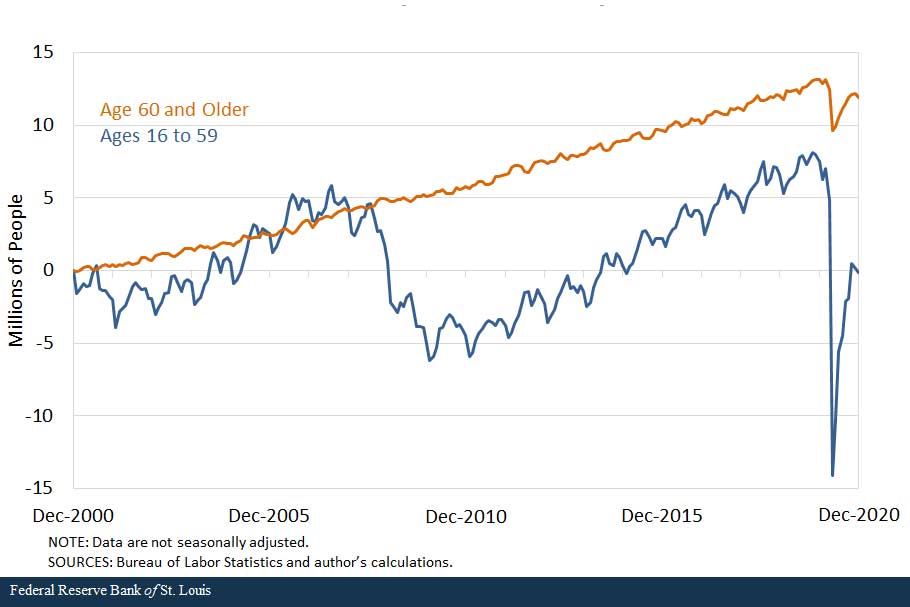
House Prices Surpass Housing-Bubble Peak on One Key Measure of Value
The steady increase of a house price-to-rent ratio “would imply increasing overvaluation” of houses, a May On the Economy post said. That was the case in early 2021 (using data available through March), when an index measuring the ratio of house prices to rent in the U.S. had risen rapidly over the course of a year and reached its highest level since at least 1975.
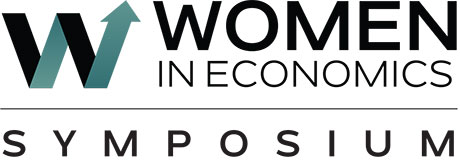
Sign up now for the free symposium, which has the theme, “Leading the Way in Challenging Times.” The event will run 6 to 8 p.m. CT on Feb. 23-24. Participants will hear insights from leading economists.
Inspiring Young Women to Pursue Economics
A January Open Vault post previewed a February 2021 event that is “designed to inspire young women and underrepresented minorities who may be interested in econ—and to encourage those pursuing a degree to persist.” The next Women in Economics Symposium is set for Feb. 23-24, 2022.
Money and Finance
Wealth gaps between white, black and hispanic families in 2019.
Across education, family structure and generations, gaps persist between the wealth of white families and that of Black and Hispanic families, the authors of a January On the Economy post found.
For instance, they wrote: “More education was associated with more wealth for all the racial and ethnic groups considered. However, wide gaps remain at every education level, with Black and Hispanic families having less median family wealth than white families with the same education.”
And Black and Hispanic families are less likely than white families to have financial and other assets like homes and businesses, and when they do, those assets were more likely to have lower values.
Navigating the ABCs of CBDCs—Central Bank Digital Currencies
“You’ve likely heard of Bitcoin, Ethereum, or even Dogecoin, but you may not have heard of ‘Fedcoin,’ an informal name some have used for the idea of a digital currency tied to a central bank, namely the Federal Reserve,” a June Open Vault post said. The post highlighted short videos in which a St. Louis Fed economist answered questions on central bank digital currencies, including about possible effects on privacy and bank lending.

Heather Hennerich is a senior editor with the St. Louis Fed External Engagement and Corporate Communications Division.
Related Topics
This blog explains everyday economics, consumer topics and the Fed. It also spotlights the people and programs that make the St. Louis Fed central to America’s economy. Views expressed are not necessarily those of the St. Louis Fed or Federal Reserve System.
Media questions
All other blog-related questions
Thank you for visiting nature.com. You are using a browser version with limited support for CSS. To obtain the best experience, we recommend you use a more up to date browser (or turn off compatibility mode in Internet Explorer). In the meantime, to ensure continued support, we are displaying the site without styles and JavaScript.
- View all journals
Economics articles from across Nature Portfolio

Going beyond averages
Global projections of the economic impacts of climate change have usually focused on rising average temperatures. Now, two studies depict more complex and gloomier scenarios by incorporating variability in temperature and precipitation.
- Matteo Coronese
Latest Research and Reviews
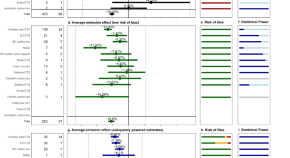
Systematic review and meta-analysis of ex-post evaluations on the effectiveness of carbon pricing
Carbon pricing policies are adopted in many countries around the world to mitigate climate change. This systematic review shows that significant emission reductions of between 5 and 21% are achieved by at least 17 out of 21 reviewed policy schemes.
- Niklas Döbbeling-Hildebrandt
- Klaas Miersch
- Jan C. Minx
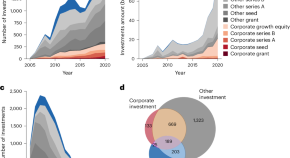
The effects of corporate investment and public grants on climate and energy startup outcomes
Investment in climate and energy startups is growing in the United States. Here the authors show that public grants back high-risk areas, and that publicly funded startups exit at higher rates with corporate backing than with other private investment.
- Kathleen M. Kennedy
- Morgan R. Edwards
- Kavita Surana
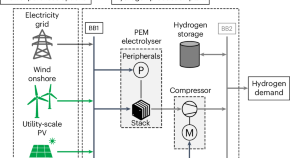
Cost and competitiveness of green hydrogen and the effects of the European Union regulatory framework
The European Commission has set a regulatory benchmark for classifying green hydrogen in the European Union. New research finds that by regulating the power purchase for electrolysers, emission savings from green hydrogen production is ensured, but cost is also affected.
- Jonathan Brandt
- Thore Iversen
- Richard Hanke-Rauschenbach
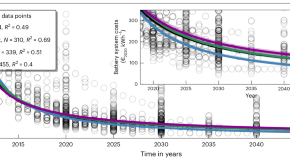
Rapidly declining costs of truck batteries and fuel cells enable large-scale road freight electrification
The costs of battery and fuel cell systems for zero-emission trucks are primed to decline much faster than expected, boosting prospects for their fast global diffusion and electrification of freight transport, with battery-electric trucks probably leading.
- Steffen Link
- Annegret Stephan
- Patrick Plötz
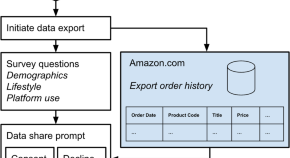
Open e-commerce 1.0, five years of crowdsourced U.S. Amazon purchase histories with user demographics
- Dan Calacci
- Sandy Pentland
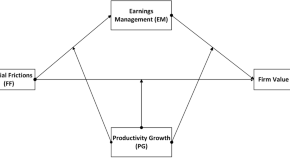
Firm value adjustment speed through financial friction in the presence of earnings management and productivity growth: evidence from emerging economies
- Saifullah Khan
- Adnan Shoaib
News and Comment
Inequality is bad — but that doesn’t mean the rich are.
- Henrik Ekelund

Decent work for all: why multinationals need a helping hand
Moses Ngoze explains why the growth of micro, small and medium enterprises in Africa are key to achieving global economic growth.
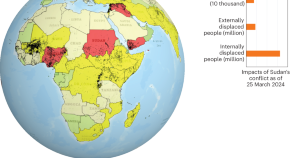
We need to know the economic impacts of Sudan’s ongoing conflict
- Khalid Siddig
- Mohammed Basheer

Daniel Kahneman obituary: psychologist who revolutionized the way we think about thinking
Nobel prizewinner whose insights into the foibles of human decision-making launched the field of behavioural economics and sent ripples through all social sciences.
- Eldar Shafir

Scientists urged to collect royalties from the ‘magic money tree’
By joining a collecting society, researchers can ensure they are paid when copyrighted book content and papers are reproduced.
- Oscar Allan

Should the Maldives be creating new land?
The Maldives are racing to reclaim vast amounts of land to combat rising sea levels. But many are concerned that these efforts risk harming the paradise they aims to protect
- Shamini Bundell
- Jesse Chase-Lubitz
Quick links
- Explore articles by subject
- Guide to authors
- Editorial policies
Take a look at the latest research from MIT Economics faculty, including published work and newly-released working papers.
Working Papers
The simple macroeconomics of ai, learning, diversity and adaptation in changing environments: the role of weak links.

Risky Business: Why Insurance Markets Fail and What To Do About It

Cooking to Save Your Life
Published papers, learning from ricardo and thompson: machinery and labor in the early industrial revolution - and in the age of ai.

Equilibrium Analysis in Behavioral One-Sector Growth Models

Labs and Centers
Research news.

Study finds workers misjudge wage markets

Simon Jäger receives 2024 In_equality Research Award
- Research Paper Guides
- Research Paper Topics
Economics Research Paper Topics: 300+ Ideas for Students
- Speech Topics
- Basics of Essay Writing
- Essay Topics
- Other Essays
- Main Academic Essays
- Basics of Research Paper Writing
- Miscellaneous
- Chicago/ Turabian
- Data & Statistics
- Methodology
- Admission Writing Tips
- Admission Advice
- Other Guides
- Student Life
- Studying Tips
- Understanding Plagiarism
- Academic Writing Tips
- Basics of Dissertation & Thesis Writing
- Essay Guides
- Formatting Guides
- Basics of Research Process
- Admission Guides
- Dissertation & Thesis Guides

Table of contents
Use our free Readability checker
Welcome to our latest blog post on economics research topics! Whether you are an academic seeking inspiration or a student looking for a starting point for your next assignment, you've come to the right place.
With so many areas to explore in economics, it can be difficult to know where to begin. But don't worry, we've got your back. In this post, our online paper writers have shared some of the most interesting and hot economics research paper topics. So, grab a cup of coffee and let's dive in!
What Are Economics Research Topics?
Economics is a social science that studies how people, businesses, and governments make decisions about how to use resources. It deals with issues like production, distribution, and consumption of goods and services.
As a student, you might be given to write a research paper on research topics in economics. These types of social science topics can cover a wide range of subjects, including:
- Macroeconomics
- Microeconomics
- International economics
- Behavioral economics, and more.
Whether you are interested in exploring current trends, global markets or history, or taxes, we collected a bunch of economics topics for a research paper to choose from. Stay with our service to spot the best idea for your upcoming project.
Characteristics of Good Economics Research Paper Topics
When it comes to selecting a research topic related to economics, it is important to decide on a subject that is not only interesting but also appropriate for your academic level. Consider these fundamental characteristics of good economics paper topics to make a wise choice:
- Select a title that is both relevant and is intended to solve a current issue.
- Choose a unique topic that has not been explored too much by other researchers.
- Make sure you can easily access the data or sources needed to create your paper.
- Consider if the topic has the potential to be of practical or social importance.
- Pick an area that genuinely interests you and will keep you motivated throughout your project.
How to Choose an Economics Research Paper Topic?
Choosing between this selection of economics project ideas can be really difficult especially if you are first to this. However, with a little bit of guidance, you will see that there is nothing challenging about picking a proper topic for a research paper in economics. Take a look at these step-by-step instructions to make the right decision:
- Brainstorm potential economics research topics that sound interesting to you in the first place. After all, you don’t want to work with boring aspects.
- Narrow your list down and consider whether there are enough resources to back up your research.
- Carry out preliminary investigation to see what you can write about. Use academic journals, newspapers, and other reputable sources to gather information.
- Check if the topic complies with your instructor’s guidelines.
- Based on your research and requirements alter a title to create a focused research question.
Remember to choose a topic that you are passionate about and that aligns with your academic and professional goals.
Economics Research Topics List
Economics is a vast field that encompasses a wide range of topics and issues. If you're looking for inspiration for your next research paper, consider exploring one of these top research paper topics in economics:
- What is the impact of trade policies on international trade patterns?
- How does income inequality affect economic growth?
- What role does entrepreneurship play in economic development?
- How do government regulations affect market efficiency?
- What are the economic implications of climate change and environmental policy?
- How do automation and artificial intelligence affect the labor market?
- What are the effects of healthcare policies on the economy and society?
- How does education influence economic outcomes?
- What are some economic aspects of taxation and fiscal policy?
- How does globalization impact domestic economies and societies?
Interesting Research Topics in Economics
Are you searching for interesting topics in economics? Look no further than these cptivting economic paper topics ideas.
- How do government policies impact income mobility?
- What role do financial institutions play in economic growth?
- Economics of housing and homelessness.
- How do immigration policies shape the labor market?
- Impact of gender inequality on economic growth.
- Sustainable development and renewable energy.
- What are some effects of globalization on income distribution?
- How do minimum wage policies impact employment and poverty?
- Economics of crime and punishment.
- How does corruption relate to economic growth?
- Effects of social welfare policies on income inequality.
- Healthcare markets and insurance systems.
- How does technology influence income distribution and employment?
- Education financing and student loan debt.
- How do economic sanctions affect international trade and diplomacy?
Good Topics for Economic Research Papers
Economics research topics are diverse and can be approached from various angles. Below are some great economic topics to write about:
- What are some effects of social media on consumer behavior and advertising?
- What is the relationship between corporate social responsibility and profitability?
- Sharing economy and its impact on traditional industries.
- How does climate change affect the tourism industry economically?
- Economics of healthcare systems and policies in developing countries.
- How does population aging influence labor markets and retirement policies?
- How does artificial intelligence impact business and employment?
- What factors are involved in energy transition and the shift to renewable energy?
- Income inequality and political polarization.
- How do digital streaming services and the music industry intersect economically?
- How does cultural diversity contribute to growth and innovation?
- Effects of trade agreements on income distribution.
- Cryptocurrency and blockchain technology.
- How does globalization impact labor standards and working conditions?
- Natural disasters and economic growth.
Best Economics Research Topics
Want to take your project to the next level? Don’t skip these hot economic research questions. They suit any academic level and can be supported by credible evidence.
- Big data and its role in economic forecasting.
- How does public debt impact economic growth?
- The economics of international migration.
- What is the impact of technological innovation on income inequality?
- The role of infrastructure investment in fostering economic growth.
- The economics of the gig economy and freelance work.
- How does foreign aid affect economic development?
- The economics of natural resource management and sustainability.
- What is the impact of urbanization on economic growth and development?
- The economics of the entertainment industry and streaming services.
- How do exchange rate fluctuations influence trade and investment?
- The economics of food production and distribution systems.
- How do government regulations affect small businesses economically?
- The study of behavioral finance and decision-making in economics.
- What is the impact of monetary policy on financial markets and inflation?
Unique Economics Research Topics
Economics is a constantly evolving field that offers endless possibilities for research and analysis. That’s why choosing unique economic research ideas shouldn’t be a big deal. Below we added a list of authentic topics you most likely won’t be able to find anywhere else.
- How does mobile banking contribute to financial inclusion in emerging economies?
- How do natural disasters affect supply chains?
- What are some effects of gender bias in venture capital funding decisions?
- How does population density influence the demand for public transportation in urban areas?
- Virtual currencies and their potential as an alternative to traditional currencies.
- How do government subsidies influence the adoption of renewable energy?
- How do industrial policies shape innovation and contribute to economic growth?
- Alternative meat and its potential impact on the food industry.
- What is the relationship between public transit availability and property values in urban areas?
- How does corruption impact economic growth and development?
- Renewable energy storage systems and their impact on grid stability.
- What are some effects of automation on job displacement and income inequality?
- Blockchain technology in the banking industry and financial transactions.
- International trade in cultural goods and services.
- How does income inequality relate to health outcomes from an economic standpoint?
Popular Economics Topics for Research Paper
Do you want to focus on current and pressing issues? Consider these trending topics for economic research papers.
- The impact of COVID-19 on the global economy.
- What are economic implications of healthcare reform?
- How does globalization affect labor markets economically?
- Climate change and the role of carbon pricing.
- Effects of income inequality on social mobility.
- How does automation impact employment and wages in the workforce?
- The economics of education and the burden of student loan debt.
- How do government regulations influence business and innovation economically?
- Income taxation and progressive taxation.
- Impact of immigration on labor markets.
- Behavioral economics and the use of nudges in decision-making.
- How do trade policies influence international relations and diplomacy?
- Mergers and acquisitions in the business world.
- How do minimum wage policies affect low-wage workers economically?
- Urbanization and transportation planning.
Economics Research Paper Topics for Students
As a student, picking decent economic topics for research papers can be a challenging task. It's important to focus on relevant and interesting aspects. Below you will find some economic research paper topics specifically geared toward students of all levels.
Economics Research Topics for College Students
College students majoring in economics have a range of choices when it comes to research topics. Below are some inspiring economic paper topics you can use as inspiration for your project in college:
- Effects of gig economy on labor markets.
- Economic growth and environmental sustainability.
- Impact of sharing economy on traditional industries.
- Housing affordability and homelessness.
- How does trade liberalization affect domestic industries and consumers?
- How does public policy influence small business growth?
- Food waste and its impact on sustainability.
- Income inequality and access to education.
- Impact of automation on the future of work.
- Online advertising and consumer behavior.
- How does fiscal policy influence income distribution and poverty reduction?
- How does tax reform impact business investment?
- Economics of international tourism and its impact on local economies.
- Effects of financial regulation on consumer behavior and investor confidence.
- Demographic shifts and labor force participation.
Economics Research Topics for Undergraduates
Are you an undergraduate student looking for topics related to economics? Here are some amazing ideas you can pick from:
- Financial implications of space exploration and commercial space travel.
- Role of urban farming in city development for sustainability.
- Impact of genetic engineering and biotechnology on the agricultural sector.
- Financial consequences of digital privacy.
- Implications of mass surveillance on consumer spending patterns.
- How do remittances influence growth in developing countries?
- Fiscal consequences of cybercrime and cybersecurity breaches.
- Role of microfinance in alleviating poverty.
- Potential financial implications of quantum computing.
- Water scarcity and its worldwide financial implications.
- Monetary consequences of epidemics, pandemics, and public health crises.
- Transformation of markets by virtual and augmented reality.
- Effect of corporate governance on shareholder value.
- Financial aspects of aging societies and pension reform.
- Role of intellectual property rights in promoting innovation and growth.
Economics Research Topics for Grad Students
Graduate students in economics are expected to delve deeper into economic theories, models, and concepts. They are also required to contribute new insights to the field. We suggest that you choose these economics topics for research to earn a high grade:
- How does drug legalization influence national economies?
- Impact of universal basic income on poverty levels and unemployment rates.
- Financial implications of political instability and conflict.
- Impact of cultural heritage sites on local and national finances.
- Financial repercussions of biodiversity loss and species extinction.
- Role of venture capital in fostering startups and growth.
- Disaster risk management and its relevance to financial resilience.
- Potential fiscal impacts of deep-sea mining.
- Financial consequences of single-use plastics and transition to a circular economy.
- Business aspects of the digital gaming industry and eSports.
- Impact of the maker movement and DIY culture on traditional manufacturing.
- How can nanotechnology shape future market economies?
- Impact of drone technology on supply chain operations.
- Financial aspects of mental health in the workplace.
- Role of public-private partnerships in fostering growth and infrastructure development.
Research Topics in Economics by Subject
Economics paper topics ideas will also depend on your area of expertise. This block will offer topics by subject, so that you can choose a theme that fits your special needs. Whether you are interested in exploring the economics of renewable energy or the effects of globalization on income distribution,you will surely spot an idea or two right below.
World Economics Research Paper Topics
The global economy is a complex and interconnected system, and there are many world economics research paper topics that can shed light on global aspects. Between them are these ideas:
- Evolving landscape of international trade in the post-COVID era.
- Role of Special Economic Zones in boosting global competitiveness.
- Impact of machine learning and artificial intelligence on global financial markets.
- How do social impact bonds contribute to global development goals?
- Cybersecurity risks in global financial institutions: Are we prepared?
- Influence of social entrepreneurship on worldwide poverty reduction.
- Green bonds and their role in global sustainable finance.
- Economic prospects of the African Continental Free Trade Area.
- Role of global remittance flows in socioeconomic development.
- Impact of climate change on global supply chains: What can we do?
- Global consequences of a cashless society: Are we ready?
- How does geopolitics affect global energy markets?
- Repercussions of cryptocurrency adoption on global financial stability.
- Economies of scale in global manufacturing: A new era?
- Role of international development assistance in achieving Sustainable Development Goals.
>> More ideas: Politics Research Topics
Microeconomics Research Paper Topics
Microeconomics studies the behavior of individuals and firms in making decisions regarding the allocation of resources. If you need microeconomics topics for research paper, we collected great ideas below:
- How do consumer ethics shape purchasing decisions?
- What influences price elasticity of demand in luxury goods markets?
- How does the gig economy affect individual financial stability?
- What are the key economic factors determining college major choices?
- How do credit scores influence personal finance management?
- What impacts have peer-to-peer lending platforms had on traditional banking?
- What drives consumer decisions between online and brick-and-mortar shopping?
- How do economic considerations play into personal retirement planning?
- What market dynamics and pricing strategies dominate the smartphone industry?
- How does behavioral economics impact personal savings habits?
- How significantly does brand loyalty influence consumer spending?
- What strategies help businesses survive during economic downturns?
- How does corporate social responsibility influence consumer choice?
- What role does digital marketing play in shaping consumer behavior?
- What are some economic impacts of identity theft on individuals and businesses?
Macroeconomics Research Paper Topics
Unlike microeconomics, macroeconomics explores the behavior and performance of entire economies. Below are some awesome macroeconomics research paper topics:
- Exploring connections between inflation and unemployment.
- Impact of quantitative easing on long-term economic growth.
- How does fiscal deficit affect a country's economic stability?
- The role of central banks in managing economic downturns.
- Effects of government debt on interest rates and investment.
- What factors contribute to business cycles and economic fluctuations?
- Examination of macroeconomic factors influencing foreign direct investment.
- How do monetary policies impact inflation and unemployment rates?
- Role of technology advancements in macroeconomic productivity.
- Impact of demographic changes on long-term economic growth.
- Can green investment stimulate economic recovery?
- What role do exchange rates play in a country's trade balance?
- Comparative analysis of economic growth models.
- Macroeconomic challenges of transitioning to a low-carbon economy.
- How does income inequality affect economic growth at a macro level?
Economics Research Paper Topics on International Trade
International trade is a vital part of the global economy and has a significant impact on development, and international relations. Here are unique topics for an economic research paper focusing on international trade:
- Impact of Brexit on international trade relations.
- How do currency fluctuations affect international trade?
- Economic consequences of trade wars: A case study of U.S.-China relations.
- Role of World Trade Organization in shaping international trade norms.
- How does international trade contribute to economic growth?
- Evaluation of free trade agreements and their economic implications.
- Role of emerging markets in shaping the future of international trade.
- How do trade barriers influence domestic industries?
- Fair trade vs. free trade: An economic analysis.
- Global supply chain disruptions: Lessons from the COVID-19 pandemic.
- Effects of international trade on income distribution within countries.
- Economic impact of sanctions on international trade.
- How do intellectual property rights issues affect international trade?
- Role of e-commerce in transforming international trade.
- What are the economic consequences of offshore outsourcing on international trade?
Financial Economics Research Topics
Financial economics is a subfield of economics that focuses on financial markets, institutions, and instruments. Here are outstanding financial economic topics for a paper:
- Role of FinTech in shaping the future of banking.
- Analysis of risk management strategies in investment banking.
- How do hedge funds contribute to financial market stability?
- Impact of regulatory changes on financial market competitiveness.
- How does financial literacy influence individual investment decisions?
- Examination of financial derivatives and their role in financial risk management.
- Role of central banks in maintaining financial stability.
- Analysis of market efficiency in cryptocurrency markets.
- How do financial crises affect economies in the long term?
- Financial inclusion and the role of mobile banking.
- Impact of corporate governance on financial performance.
- Examination of the link between financial markets and economic growth.
- High-frequency trading: Impact on financial market stability.
- Effect of algorithmic trading on financial market efficiency.
- How do interest rate changes impact financial markets.
Development Economics Research Topics
Development economics studies the economic and social development of low-income countries. With this branch in mind, we prepared a list of development economic research paper topics ideas:
- Role of microfinance in economic empowerment in developing countries.
- How do infrastructure projects affect economic development?
- How do cultural factors shape economic progress in developing countries?
- Impact of corruption on resource allocation in developing nations.
- Impact of foreign aid on economic growth in recipient countries.
- Evaluation of agricultural policies on rural development.
- How do commodity price fluctuations affect developing economies?
- Implications of population growth on resource management in emerging economies.
- How does political stability influence economic growth in developing countries?
- Impact of public health initiatives on economic development.
- Analysis of sustainable development strategies in emerging economies.
- How do migration patterns affect economic development?
- How does technological adoption improve productivity in developing economies?
- Role of social entrepreneurship in sustainable economic development.
- How does tourism influence the economic development of low-income countries?
Behavioral Economics Research Paper Topics
Behavioral economics combines insights from psychology and economics to understand how people make financial decisions. Below you can find behavioral economics research topics:
- Impact of cognitive biases on economic decision making.
- Role of emotions in consumer purchasing behavior.
- How does social influence shape spending habits?
- What are the economic implications of procrastination?
- Nudging for good: Can behavioral economics promote healthier lifestyles?
- How does framing influence consumers' perception of price and value?
- Role of incentives in shaping individual and collective behavior.
- Examination of loss aversion in investment decisions.
- Analysis of irrational behaviors in financial markets.
- Behavioral economics in policy design: What works and why?
- How does choice overload affect consumer decision making?
- The effect of anchoring bias in pricing strategies.
- Role of behavioral economics in promoting sustainable consumption.
- How does scarcity mindset affect economic decisions?
- Behavioral economics and personal finance: How to avoid common pitfalls?
>> Read more: Psychology Topics to Research
Environmental Economics Research Topics
Environmental economics investigates the interaction between economic systems and the natural environment. This subfield also offers multiple perspectives for exploration. Here are some examples of project topics on economics with emphasis on environment:
- Examining the economic impacts of biodiversity loss.
- Impact of environmental policies on manufacturing industries.
- Role of renewable energy investments in economic growth.
- Does a carbon tax impact economic competitiveness?
- Economic analysis of water resource management.
- How do natural disasters affect economic performance?
- The economic value of ecosystem services.
- Cost-effectiveness of different strategies for reducing greenhouse gas emissions.
- Role of environmental economics in climate change mitigation.
- How does waste management contribute to sustainable economic growth?
- The effects of air pollution on economic productivity.
- What is the economic impact of deforestation?
- Evaluation of economic tools for managing plastic waste.
- Economics of transitioning to a circular economy.
- How does sustainable agriculture contribute to economic development?
>> View more: Environmental Research Topics
Health Economics Research Topics
Health economics examines how health care practices affect the health outcomes of individuals and whole populations. Take a glance at these health economics research paper topics:
- Economic impact of pandemics on healthcare systems.
- Role of telemedicine in healthcare cost reduction.
- How do health insurance policies influence medical spending?
- Economic analysis of mental health issues and treatment access.
- The cost-effectiveness of preventative healthcare measures.
- Evaluating the economic burden of chronic diseases.
- Economic implications of antibiotic resistance.
- How does socioeconomic status influence health outcomes?
- Impact of aging populations on healthcare costs.
- Evaluation of the economic benefits of vaccination programs.
- The effect of medical technology advancements on healthcare costs.
- Role of behavioral economics in health promotion and disease prevention.
- How does health literacy influence healthcare utilization and costs?
- Economic analysis of substance abuse treatment.
- Evaluating the economic impacts of health policy reforms.
>> Read more: Public Health Topics for Research
Extra Research Topics for Economics
Sometimes, finding the right idea can be a challenging task. However, there are numerous resources available to help you find unique angles. Also, don't be afraid to ask your professors or research paper writer team for suggestions on the selection process. But if you don’t have enough time, we gathered some supplementary economics research topics.
Economics Essay Topics
An economics essay can cover a broad range of topics, from macroeconomic issues such as international trade and monetary policy to microeconomic aspects such as consumer behavior and market structure.
- Can an increase in minimum wage curb poverty?
- What are the potential economic effects of Brexit?
- Impact of income inequality on societal cohesion.
- How does the rise of remote work influence economic structures?
- Examination of the economic benefits of public libraries.
- Role of the informal economy in urban development.
- Economic implications of increasing life expectancy.
- How does piracy impact the music and film industry economically?
- Impact of subsidies on agricultural economies.
- Exploration of the economic factors influencing the housing market.
- Analysis of the economic costs of obesity.
- Role of child labor in global supply chains.
- Examination of the economic implications of internet censorship.
- Impact of single-use plastics on local and global economies.
- Economic effects of urban green spaces.
Economics Topics for a Short Project
If you need to complete a short assignment, you may want to consider project topics in economics that can be analyzed within a limited timeframe. Don’t worry. We’ve added some simple ideas as well:
- Examining the economic impacts of online privacy breaches.
- Role of advertising in shaping consumer behavior.
- Analysis of the economic effects of natural disasters.
- Economic implications of self-driving cars.
- Role of cooperatives in the economy.
- Impact of e-waste on developing economies.
- The role of micro-credit in alleviating poverty.
- Examining the economic impacts of space exploration.
- How do online reviews influence consumer purchasing decisions?
- Economics of disaster recovery: Case studies.
- Examination of the economic implications of cybercrime.
- Impact of nutritional labeling on consumer behavior and market outcomes.
- Economic analysis of the craft beer industry.
- Examining the economic effects of animal agriculture.
- How do tax incentives influence corporate behavior and economic outcomes?
Economics Research Questions
Formulating a research question is a crucial step in conducting an economics research project. A good research question should be specific, measurable, and relevant to the topic under study. Here are some economics research questions to consider:
- How does widespread adoption of digital currencies impact traditional banking?
- To what extent do economic factors contribute to obesity rates?
- What are the consequences of large-scale solar power adoption?
- How do parental leave policies shape labor markets?
- What impacts do large-scale data breaches have on corporations?
- Does green urban planning significantly contribute to city development?
- How much does mental health contribute to workplace productivity?
- What effects do fair trade agreements have on farmers in low-income countries?
- How valuable are clean oceans for global trade?
- How does political stability of a country influence foreign investments?
- What are the consequences of patent wars in the tech industry?
- How does the rise of freelancing shape labor laws?
- What economic implications does the rise of eSports have?
- How does nutrition education impact economic health?
- What are some benefits and drawbacks of commercial space tourism?
Economics Research Topics for Exams
If you're preparing for an exam, it's important to have a good understanding of the concepts and theories that you'll be tested on. To help you prepare, we offer these economics research topics for exams to study:
- Implications of autonomous vehicles on transportation.
- Role of trade unions in contemporary job markets.
- Analysis of gender disparities in retirement savings.
- Influence of corporate social responsibility on brand reputation.
- How do plant-based diets influence the global meat industry.
- Evaluating efficiency of ride-sharing platforms.
- Role of drones in shaping future commercial landscapes.
- How public health initiatives influence workplace productivity.
- Exploring the potential economic impact of asteroid mining.
- How does fashion industry affect global economy and environmental sustainability?
- Impact of video-on-demand services on traditional film industries.
- Role of social entrepreneurship in poverty alleviation.
- Role of energy-efficient appliances in electricity markets.
- Influence of shifting demographics on global trends.
- How does celebrity endorsement influence consumer buying behavior?
Economics Research Paper Topics for Experts
For those who are already experts in the field of economics, finding 100% original economics research topics can be an uphill struggle. But not with ideas attached below:
- How does quantum computing pose an economic challenge to cybersecurity firms?
- How do gene editing technologies affect agricultural markets?
- In what ways does space commercialization affect global economies?
- How does increased lifespan influence retirement and pension systems?
- Financial viability of carbon capture and storage.
- Influence of ethical consumerism on global supply chains.
- How have nanotechnologies impacted manufacturing sectors?
- Impact of rising sea levels on coastal economies.
- Role of predictive analytics in preventing financial fraud.
- Examining the economic consequences of major oil spills.
- How does deep face technology pose an economic challenge to film industries?
- Economic impacts of large-scale reforestation.
- Implications of extensive antibiotic resistance.
- Impacts of geopolitical tensions on global oil prices.
- Universal basic income as a solution for automation-induced job loss.
Bottom Line on Economics Papers Topics
Hopefully, by now you have found a perfect economics research paper topic. Make sure you can find enough evidence to back up your points. But if you have any difficulties with the research or writing process, consider to buy coursework or any other project from academic experts.
Look no further! Let our experts handle all the hard work for you. Say ‘ write my term paper for me ’ and forget about stress and tight deadlines. Get top-quality, custom-written papers tailored to your requirements.

Joe Eckel is an expert on Dissertations writing. He makes sure that each student gets precious insights on composing A-grade academic writing.
You may also like

Browse Econ Literature
- Working papers
- Software components
- Book chapters
- JEL classification
More features
- Subscribe to new research
RePEc Biblio
Author registration.
- Economics Virtual Seminar Calendar NEW!

Search IDEAS All Articles Papers Chapters Books Software In: Whole record Abstract Keywords Title Author Sort by: new options Relevance Oldest Most recent Most cited Title alphabet Recently added Recent & relevant Relevant & cited Recent & cited From: Any Year 2024 2023 2022 2021 2020 2019 2018 2017 2016 2015 2014 2013 2012 2011 2010 2009 2008 2007 2006 2005 2004 2003 2002 2001 2000 1999 1998 1997 1996 1995 1994 1993 1992 1991 1990 1985 1980 1975 1970 1960 1950 1940 1930 1900 1800 1700 To: Any Year 2024 2023 2022 2021 2020 2019 2018 2017 2016 2015 2014 2013 2012 2011 2010 2009 2008 2007 2006 2005 2004 2003 2002 2001 2000 1999 1998 1997 1996 1995 1994 1993 1992 1991 1990 1985 1980 1975 1970 1960 1950 1940 1930 1900 1800 1700 More advanced search New: sort by citation count and by recently added --> What is IDEAS? IDEAS is the largest bibliographic database dedicated to Economics and available freely on the Internet. Based on RePEc , it indexes over 4,700,000 items of research, including over 4,200,000 that can be downloaded in full text. RePEc is a large volunteer effort to enhance the free dissemination of research in Economics which includes bibliographic metadata from over 2,000 participating archives , including all the major publishers and research outlets. IDEAS is just one of several services that use RePEc data. For some statistics about the holdings on this site, see here . Authors are invited to register with RePEc to create an online profile. Then, anyone finding some of their research here can find your latest contact details and a listing of their other research. They will also receive a monthly mailing about the popularity of their works, their ranking and newly found citations. How do I find on IDEAS what I am looking for?
More services and features.
Follow serials, authors, keywords & more
Public profiles for Economics researchers
Various research rankings in Economics
RePEc Genealogy
Who was a student of whom, using RePEc
Curated articles & papers on economics topics
Upload your paper to be listed on RePEc and IDEAS
New papers by email
Subscribe to new additions to RePEc
EconAcademics
Blog aggregator for economics research
Cases of plagiarism in Economics
About RePEc
Initiative for open bibliographies in Economics
News about RePEc
Questions about IDEAS and RePEc
RePEc volunteers
Participating archives
Publishers indexing in RePEc
Privacy statement
Corrections.
Found an error or omission?
Opportunities to help RePEc
Get papers listed
Have your research listed on RePEc
Open a RePEc archive
Have your institution's/publisher's output listed on RePEc
Get RePEc data
Use data assembled by RePEc
- Utility Menu
44d3fa3df9f06a3117ed3d2ad6c71ecc
- Administration
research-banner.jpg

Current student and faculty research, initiatives, and resources in the department
Find Faculty by Economic Field
Behavioral Economics
Industrial Organization
Political Economy
Economic Development
International Economics
Public economics.
Econometrics
Labor Economics
Financial economics, macroeconomics, economic history, research initiatives.
Our faculty-led initiatives showcase just some of the department's vast endeavors to further our understanding of the world through the lens of economics. Our current initiatives are listed below.

Foundations of Human Behavior Initiative
The Foundations of Human Behavior Initiative (FHB) supports research that produces transformative insights about the psychological, social, economic, political, and biological mechanisms that influence human behavior.

German Administrative Data Project
The Research Data Center (FDZ) of the German Federal Employment Agency (BA) in the Institute for Employment Research (IAB) facilitates access to micro data on the labor market for non-commercial empirical research.

The Lab for Economic Applications and Policy (LEAP) facilitates research related to government policy, with the aim of injecting scientific evidence into policy debates

Opportunity Insights
Opportunity Insights identifies barriers to economic opportunity and develop scalable solutions that will empower people throughout the United States to rise out of poverty and achieve better life outcomes.
The Weiss Fund
The Weiss Fund for Research in Development Economics is funded by the CRI Foundation and aims to sponsor research that will positively affect the lives of poor people in poor countries.

Faculty Feature
Professor Robin Lee and his co-author, Professor Kate Ho, have just been announced as the winners of the 2020 Frisch Medal of the Econometric Society for their paper “Insurer Competition in Health Care Markets”.


Student Feature
Elisa Rubbo is awarded the Padma Desai Prize in Economics and Jonathan Roth wins the David A. Well's Prize.
Research Resources

Use of Human Subjects
- Harvard FAS Human Subject Research Site
- Human Subject Payment Information

Research Agreements / Contracts
- Model Consulting Agreement of Harvard
- Harvard Legal Agreements Workflow, Negotiating Authority and Signing Authority

Research Travel Information
- Travel on Sponsored Funding
- Harvard Travel Services
- Global Support Services

Data Use Agreements
Learn more about data use agreements
400+ Economic Project Topics: How to Choose and Excel in Research
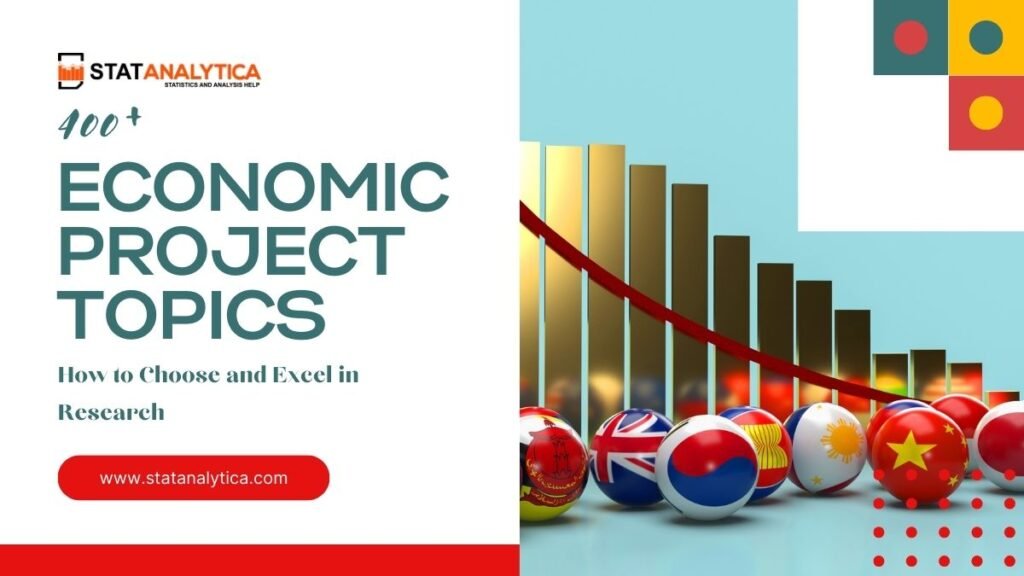
Economic project topics play a pivotal role in the academic journey of students pursuing degrees in economics or related fields. These topics serve as the foundation for research, analysis, and the development of critical thinking skills.
Selecting the right economic project topic is crucial, as it can significantly impact the success of your research and the depth of your understanding of economic principles.
In this blog, we’ll guide you through the process of choosing the right economic project topic, explore different categories of topics, and provide tips for a successful research journey.
How To Select Economic Project Topics?
Table of Contents
Before diving into the categories of economic project topics, it’s essential to understand the process of selecting a topic that aligns with your interests, expertise, and available resources. Here’s a closer look at how to choose the right topic:
Identifying Your Interests and Expertise
Passion for your research topic can be a powerful motivator. Consider areas within economics that genuinely interest you.
Do you have a fascination with microeconomic concepts like market dynamics and consumer behavior, or are you more drawn to macroeconomic issues like fiscal and monetary policies? Identifying your interests will make the research process more enjoyable and rewarding.
Moreover, leveraging your expertise can lead to a more fruitful research experience. If you have a background in a specific industry or possess unique skills, it may be wise to select a topic that aligns with your strengths.
Your existing knowledge can provide valuable insights and a competitive edge in your research.
Assessing the Relevance and Timeliness of Topics
Economic research should address current and relevant issues in the field. To ensure the significance of your project, consider the timeliness of the topic.
Are you exploring an emerging economic trend, or does your research address a longstanding issue that still requires attention?
Additionally, think about the broader implications of your research. How does your chosen topic contribute to the existing body of knowledge in economics?
Assessing the relevance and potential impact of your research can help you choose a topic that resonates with both academic and real-world audiences.
Considering Available Resources and Data
Practicality is a crucial factor in selecting an economic project topic. Assess the availability of resources and data required for your research. Do you have access to relevant datasets, surveys, or academic journals that support your chosen topic?
It’s essential to ensure that the necessary resources are accessible to facilitate your research process effectively.
400+ Economic Project Topics: Category-Wise
Economic project topics encompass a wide range of areas within the field. Here are four major categories to explore:
100+ Microeconomics Project Topics
- The impact of advertising on consumer behavior.
- Price elasticity of demand for luxury goods.
- Analyzing market structure in the tech industry.
- Consumer preferences for sustainable products.
- The economics of online streaming services.
- Factors affecting pricing strategies in the airline industry.
- The role of information asymmetry in used car markets.
- Microeconomics of fast fashion and its environmental effects.
- Behavioral economics in food choices and obesity.
- The impact of minimum wage on small businesses.
- Market competition and pharmaceutical drug prices.
- Monopoly power in the pharmaceutical industry.
- Economic analysis of the gig economy.
- Elasticity of demand for healthcare services.
- Price discrimination in the hotel industry.
- Consumer behavior in the sharing economy.
- Economic analysis of e-commerce marketplaces.
- The economics of ride-sharing services like Uber.
- Factors influencing the demand for organic foods.
- Game theory and strategic pricing in oligopolistic markets.
- Microeconomics of the coffee industry.
- Analyzing the effects of tariffs on imported goods.
- Price elasticity of demand for electric vehicles.
- The economics of artificial intelligence and job displacement.
- Behavioral economics in the stock market.
- Impact of advertising on children’s consumer choices.
- Monopolistic competition in the smartphone industry.
- Economic analysis of the video game industry.
- The role of patents in pharmaceutical pricing.
- Price discrimination in the airline industry.
- Analyzing consumer behavior in the luxury fashion industry.
- The economics of addiction and substance abuse.
- Market structure in the online advertising industry.
- Price elasticity of demand for energy-efficient appliances.
- Economic analysis of the fast-food industry.
- The impact of product recalls on consumer trust.
- Factors influencing consumer choices in the beer industry.
- Microeconomics of the music streaming industry.
- Behavioral economics and food labeling.
- Economic analysis of the fitness and wellness industry.
- The economics of organic farming and sustainability.
- Analyzing the demand for mobile app-based services.
- Price discrimination in the entertainment industry.
- Economic analysis of subscription box services.
- Consumer preferences for eco-friendly packaging.
- Game theory in online auction markets.
- Analyzing the effects of congestion pricing.
- The economics of university tuition and student loans.
- Microeconomics of the fashion resale market.
- Behavioral economics in online shopping cart abandonment.
- Market structure in the pharmaceutical distribution.
- Analyzing the economics of cryptocurrency.
- Economic analysis of the real estate market.
- Price elasticity of demand for streaming music services.
- Consumer choices in the electric vehicle market.
- The economics of food delivery services.
- Monopoly power in the cable television industry.
- Factors influencing consumer decisions in the cosmetics industry.
- Behavioral economics and charitable donations.
- Economic analysis of the online dating industry.
- The impact of healthcare regulations on prices.
- Price discrimination in the cruise line industry.
- Economic analysis of the fashion resale market.
- Analyzing the effects of subsidies on agriculture.
- Consumer preferences for eco-friendly transportation.
- Market structure in the book publishing industry.
- Microeconomics of the craft beer industry.
- Behavioral economics and impulse buying.
- Price elasticity of demand for video game consoles.
- Economic analysis of the coffee shop industry.
- The economics of mobile payment systems.
- Analyzing consumer choices in the fast-food breakfast market.
- Monopolistic competition in the smartphone app industry.
- Factors influencing consumer decisions in the beauty industry.
- Behavioral economics in the context of online reviews.
- Economic analysis of the organic skincare industry.
- The impact of government regulations on tobacco prices.
- Price discrimination in the movie theater industry.
- Microeconomics of the subscription box industry.
- Analyzing the effects of trade barriers on agricultural exports.
- Consumer preferences for sustainable fashion.
- Market structure in the video game console industry.
- The economics of mobile app monetization.
- Price elasticity of demand for streaming television services.
- Economic analysis of the organic food industry.
- Behavioral economics and the psychology of pricing.
- Analyzing consumer choices in the electric scooter market.
- Monopoly power in the cable internet service industry.
- Factors influencing consumer decisions in the wine industry.
- Economic analysis of the impact of product reviews on sales.
- The economics of online crowdfunding platforms.
- Price discrimination in the music festival industry.
- Microeconomics of the meal kit delivery industry.
- Behavioral economics and the impact of discounts on purchasing behavior.
- Analyzing the effects of trade agreements on global supply chains.
- Consumer preferences for sustainable home appliances.
- Market structure in the online marketplace for handmade goods.
- The economics of esports and gaming tournaments.
- Price elasticity of demand for online streaming subscriptions.
- Economic analysis of the fast-casual restaurant industry.
- The impact of government subsidies on renewable energy prices.
100+ Macroeconomics Project Topics
- The impact of fiscal policy on economic growth.
- Analyzing the effectiveness of monetary policy.
- Inflation targeting and its implications.
- The relationship between unemployment and inflation.
- Factors influencing exchange rates.
- The effects of globalization on income inequality.
- Assessing the economic consequences of trade wars.
- The role of central banks in financial stability.
- Economic growth in emerging markets.
- Government debt and its impact on the economy.
- The economics of healthcare reform.
- Income distribution and poverty alleviation strategies.
- The economics of renewable energy adoption.
- The impact of automation on employment.
- Economic consequences of climate change.
- The economics of the gig economy.
- The Phillips Curve and its modern relevance.
- The economics of housing bubbles.
- Economic development in sub-Saharan Africa.
- The economics of education funding.
- The impact of technology on productivity growth.
- The role of the IMF in global financial stability.
- Economic consequences of Brexit.
- The economics of cryptocurrency.
- Economic implications of aging populations.
- The economics of natural disasters.
- The effects of income tax cuts on the economy.
- The relationship between economic freedom and growth.
- The role of infrastructure investment in economic development.
- The economics of health insurance markets.
- The impact of minimum wage laws on employment.
- The economics of food security.
- The effects of government subsidies on industries.
- The role of the World Bank in global development.
- Economic consequences of government regulation.
- The economics of corporate mergers.
- The relationship between government spending and economic growth.
- Economic effects of monetary policy on asset prices.
- The economics of social safety nets.
- The impact of income inequality on economic growth.
- The role of entrepreneurship in economic development.
- Economic consequences of trade deficits.
- The effects of financial deregulation.
- The economics of the opioid crisis.
- The relationship between economic growth and environmental sustainability.
- The impact of tax evasion on government revenue.
- Economic development in post-conflict regions.
- The economics of the sharing economy.
- The role of the World Trade Organization (WTO) in international trade.
- Economic consequences of government debt crises.
- The effects of population aging on healthcare systems.
- The economics of public-private partnerships.
- The impact of economic sanctions on countries.
- Economic implications of income tax reform.
- The role of venture capital in innovation.
- The economics of foreign aid.
- The relationship between education and economic growth.
- Economic effects of natural resource extraction.
- The economics of financial market crashes.
- The role of economic incentives in behavior.
- Economic consequences of currency devaluation.
- The effects of income tax progressivity on income distribution.
- The economics of income mobility.
- The impact of government subsidies on renewable energy.
- Economic development in post-communist countries.
- The economics of intellectual property rights.
- The relationship between government corruption and economic growth.
- Economic consequences of government budget deficits.
- The effects of financial globalization.
- The role of behavioral economics in policy-making.
- The economics of healthcare access.
- The impact of automation on manufacturing jobs.
- Economic implications of population growth.
- The economics of housing affordability.
- The relationship between monetary policy and asset bubbles.
- Economic effects of immigration policies.
- The role of economic forecasting in decision-making.
- The economics of taxation on multinational corporations.
- Economic development in the digital age.
- The impact of economic shocks on consumer behavior.
- Economic consequences of natural disasters.
- The effects of income inequality on social cohesion.
- The economics of financial innovation.
- The relationship between economic freedom and entrepreneurship.
- Economic implications of healthcare reform.
- The role of gender inequality in economic development.
- The economics of climate change mitigation.
- The impact of government regulations on small businesses.
- Economic development in the Middle East.
- The economics of consumer debt.
- The relationship between trade policy and national security.
- Economic consequences of housing market crashes.
- The effects of monetary policy on income distribution.
- The economics of sustainable agriculture.
- The role of economic sanctions in international diplomacy.
- Economic implications of corporate tax reform.
- The economics of innovation clusters.
- The impact of government procurement policies on industries.
- Economic development in post-apartheid South Africa.
- The relationship between economic inequality and political instability.
100+ International Economics Project Topics
- Impact of Trade Wars on Global Economies
- Exchange Rate Determinants and Fluctuations
- The Role of Multinational Corporations in International Trade
- Effects of Brexit on International Trade
- Comparative Analysis of Free Trade Agreements
- Currency Manipulation and Its Consequences
- Economic Integration in the European Union
- Global Supply Chains and Vulnerabilities
- The Impact of China’s Belt and Road Initiative
- Trade Liberalization in Developing Countries
- Globalization and Income Inequality
- Economic Consequences of Economic Sanctions
- International Trade and Environmental Sustainability
- The Role of the World Trade Organization (WTO)
- Foreign Direct Investment and Economic Growth
- Exchange Rate Regimes: Fixed vs. Floating
- International Financial Crises and Their Causes
- NAFTA vs. USMCA: A Comparative Analysis
- The Effects of Tariffs on Import-Dependent Industries
- Trade and Economic Development in Africa
- Offshoring and Outsourcing in a Global Economy
- The Economics of Remittances
- Currency Wars and Competitive Devaluations
- International Trade and Intellectual Property Rights
- The Impact of Economic Openness on Inflation
- The Eurozone Crisis: Causes and Solutions
- Trade Imbalances and Their Consequences
- The Economics of International Migration
- Exchange Rate Volatility and Speculation
- The Silk Road: Historical and Modern Perspectives
- The Role of International Aid in Development
- Globalization and Cultural Homogenization
- International Trade and National Security
- The Economic Effects of Brexit on the EU
- Sovereign Debt Crises and Bailouts
- The Economics of Global Energy Markets
- International Trade and Human Rights
- The Asian Financial Crisis of 1997
- The Economics of International Tourism
- The Impact of Global Economic Institutions
- International Trade and Technological Innovation
- Comparative Advantage and Trade Theory
- Globalization and Income Redistribution
- International Trade and Agriculture
- The BRICS Countries in the Global Economy
- Exchange Rate Pegs and Currency Boards
- The Economics of Global Health Challenges
- International Trade and Gender Inequality
- The Effects of Economic Migration on Sending and Receiving Countries
- The Role of Non-Tariff Barriers in International Trade
- International Trade and Economic Development in Latin America
- The European Debt Crisis and Austerity Measures
- Globalization and Income Mobility
- The Impact of International Trade on Small and Medium-sized Enterprises (SMEs)
- The Economics of Regional Integration: ASEAN, Mercosur, etc.
- Trade Agreements and Dispute Resolution
- Exchange Rate Forecasting Models
- The Economics of Foreign Aid Allocation
- The Role of International Trade in Poverty Alleviation
- International Trade and Economic Freedom
- The Economics of International Banking
- Globalization and Income Convergence
- The Effects of Political Instability on International Trade
- Trade and Economic Development in South Asia
- The Role of Special Economic Zones (SEZs) in Trade
- International Trade and Labor Standards
- Economic Consequences of Trade Deficits
- The Economics of International Taxation
- Trade and Economic Development in the Middle East
- Globalization and Income Polarization
- The Impact of Global Value Chains (GVCs) on Trade
- International Trade and Health Care Systems
- The Economics of Bilateral vs. Multilateral Trade Agreements
- Trade and Economic Development in Southeast Asia
- Exchange Rate Parity Conditions
- The Economics of International Migration Policies
- The Role of Trade Facilitation Measures
- International Trade and Human Capital Development
- Globalization and Income Insecurity
- The Effects of Trade on Environmental Sustainability
- The Economics of Foreign Direct Investment (FDI) Incentives
- Trade and Economic Development in Eastern Europe
- The Role of Export Credit Agencies (ECAs) in Trade
- International Trade and Technological Transfer
- Globalization and Income Resilience
- The Impact of Global Economic Shocks
- Trade and Economic Development in Oceania
- Exchange Rate Risk Management Strategies
- The Economics of Foreign Exchange Reserves
- International Trade and Economic Geography
- The Role of Trade Promotion Agencies
- Globalization and Income Diversity
- The Effects of Exchange Rate Intervention
- International Trade and Financial Inclusion
- Trade and Economic Development in the Caribbean
- The Economics of Trade Agreements on Services
- The Role of Export Processing Zones (EPZs) in Trade
- International Trade and Income Mobility
- Globalization and Income Equality Policies
- The Impact of Trade Disputes on International Relations.
100+ Economic Policy Project Topics
- The impact of minimum wage laws on employment rates.
- The effectiveness of quantitative easing in stimulating economic growth.
- Analyzing the consequences of trade tariffs on international commerce.
- The role of government subsidies in shaping agricultural markets.
- The economic implications of healthcare reform policies.
- Examining the relationship between income inequality and economic growth.
- Evaluating the effects of corporate tax cuts on business investments.
- The impact of immigration policies on labor markets.
- Analyzing the economic consequences of climate change regulations.
- Assessing the effectiveness of financial regulations in preventing economic crises.
- The role of central banks in controlling inflation.
- The economic implications of universal basic income programs.
- Investigating the relationship between education spending and economic development.
- The impact of government debt on future generations.
- Analyzing the effects of fiscal stimulus packages on economic recovery.
- The role of monetary policy in addressing unemployment.
- Evaluating the economic consequences of government healthcare programs.
- The impact of exchange rate fluctuations on international trade.
- The economic implications of public-private partnerships in infrastructure development.
- Analyzing the effects of antitrust laws on competition in markets.
- The role of social welfare programs in poverty reduction.
- Evaluating the economic consequences of aging populations.
- The impact of housing policies on real estate markets.
- Investigating the relationship between foreign aid and economic development.
- The economic implications of globalization on income distribution.
- Analyzing the effects of regulatory capture in financial markets.
- The role of tax incentives in promoting renewable energy.
- Evaluating the economic consequences of healthcare privatization.
- The impact of immigration reform on labor market dynamics.
- Investigating the relationship between government debt and interest rates.
- The economic implications of trade liberalization agreements.
- Analyzing the effects of corporate social responsibility on profitability.
- The role of fiscal policy in addressing economic recessions.
- Evaluating the economic consequences of income tax reforms.
- The impact of technology policies on innovation and economic growth.
- Investigating the relationship between monetary policy and asset bubbles.
- The economic implications of minimum wage adjustments.
- Analyzing the effects of government regulations on the pharmaceutical industry.
- The role of foreign direct investment in economic development.
- Evaluating the economic consequences of healthcare cost containment measures.
- The impact of labor market policies on workforce participation.
- Investigating the relationship between exchange rates and export competitiveness.
- The economic implications of intellectual property rights protection.
- Analyzing the effects of fiscal austerity measures on economic stability.
- The role of government spending in stimulating economic growth.
- Evaluating the economic consequences of energy subsidies.
- The impact of trade agreements on job displacement.
- Investigating the relationship between infrastructure investment and productivity.
- The economic implications of financial market deregulation.
- Analyzing the effects of income tax credits on low-income families.
- The role of social safety nets in mitigating economic shocks.
- Evaluating the economic consequences of healthcare rationing.
- The impact of labor market flexibility on employment stability.
- Investigating the relationship between corporate governance and firm performance.
- The economic implications of government subsidies for renewable energy.
- Analyzing the effects of taxation on wealth distribution.
- The role of sovereign wealth funds in economic development.
- Evaluating the economic consequences of currency devaluation.
- The impact of government regulation on the gig economy.
- Investigating the relationship between foreign aid and political stability.
- The economic implications of healthcare privatization.
- Analyzing the effects of income inequality on social cohesion.
- The role of infrastructure investment in reducing transportation costs.
- Evaluating the economic consequences of carbon pricing policies.
- The impact of trade protectionism on domestic industries.
- Investigating the relationship between public education funding and student outcomes.
- The economic implications of housing affordability challenges.
- Analyzing the effects of labor market discrimination on wage gaps.
- The role of monetary policy in addressing asset price bubbles.
- Evaluating the economic consequences of financial market speculation.
- The impact of government procurement policies on small businesses.
- Investigating the relationship between population aging and healthcare expenditures.
- The economic implications of regional economic integration.
- Analyzing the effects of government subsidies on agricultural sustainability.
- The role of tax incentives in promoting technology startups.
- Evaluating the economic consequences of trade imbalances.
- The impact of healthcare cost containment measures on patient outcomes.
- Investigating the relationship between government debt and economic growth.
- The economic implications of housing market speculation.
- Analyzing the effects of labor unions on wage negotiations.
- The role of economic sanctions in shaping international relations.
- Evaluating the economic consequences of natural resource depletion.
- The impact of fiscal policy on income redistribution.
- Investigating the relationship between education quality and workforce productivity.
- The economic implications of government investment in green infrastructure.
- Analyzing the effects of income tax evasion on government revenue.
- The role of gender-based economic disparities in overall growth.
- Evaluating the economic consequences of healthcare fraud.
- The impact of public transportation policies on urban development.
- Investigating the relationship between corporate social responsibility and consumer behavior.
- The economic implications of government support for the arts and culture sector.
- Analyzing the effects of government subsidies on electric vehicles.
- The role of economic diplomacy in promoting international trade.
- Evaluating the economic consequences of financial market volatility.
- The impact of globalization on wage convergence or divergence.
- Investigating the relationship between economic sanctions and human rights violations.
- The economic implications of government investments in digital infrastructure.
- Analyzing the effects of government interventions in housing markets.
- The role of economic policies in addressing income mobility.
- Evaluating the economic consequences of occupational licensing regulations.
Popular Economic Project Topics
To inspire your research journey, here are some popular economic project topics within each category:
- Case Studies
1. Analyzing the Impact of COVID-19 on a Specific Industry: Examine how the pandemic affected industries like hospitality, aviation, or e-commerce.
2. Evaluating the Economic Effects of Tax Reforms: Investigate the consequences of recent tax policy changes on businesses, individuals, and government revenue.
- Research-Based Topics
1. Exploring the Relationship Between Inflation and Unemployment: Conduct empirical research to analyze the Phillips Curve and its relevance in the modern economy.
2. Investigating the Factors Influencing Consumer Spending Patterns: Use surveys and data analysis to understand what drives consumer spending behavior.
- Policy Analysis
1. Assessing the Effectiveness of a Recent Economic Stimulus Package: Evaluate the impact of government stimulus measures on economic recovery, employment, and inflation.
2. Examining the Pros and Cons of Minimum Wage Adjustments: Analyze the economic effects of changes in the minimum wage on low-wage workers, businesses, and overall employment.
Research Methodologies: Economic Project Topics
The methodology you choose for your economic project can significantly impact the outcomes of your research. Here are some common research approaches:
- Quantitative Research
Quantitative research involves collecting and analyzing numerical data. Common methods include:
1. Surveys and Questionnaires: Conduct surveys to gather data from respondents and use statistical analysis to draw conclusions.
2. Data Analysis and Regression Models: Employ statistical software to analyze datasets and establish relationships between variables using regression analysis.
- Qualitative Research
Qualitative research focuses on understanding the underlying reasons, motivations, and perceptions of individuals or groups. Common methods include:
1. Interviews and Focus Groups: Conduct interviews or group discussions to gain insights into specific economic behaviors or attitudes.
2. Content Analysis: Analyze textual or visual data, such as documents, reports, or media, to identify themes and patterns.
- Mixed-Methods Research
Mixed-methods research combines both quantitative and qualitative approaches to provide a comprehensive understanding of economic phenomena. Researchers often collect numerical data alongside qualitative insights.
Tips for Successful Project Topic Selection
To ensure a successful research journey, keep these tips in mind:
- Narrowing Down Your Focus: While it’s essential to choose a topic you’re passionate about, make sure it’s specific enough to be manageable within the scope of your project.
- Staying Informed About Current Economic Events: Stay up-to-date with economic news and events to identify emerging trends and issues that may inspire your research.
- Seeking Guidance from Professors or Advisors: Don’t hesitate to seek advice from your professors or academic advisors. They can provide valuable insights and help you refine your research questions.
Selecting the right economic project topics is a critical step in your academic journey. By identifying your interests, considering the relevance and timeliness of topics, and assessing available resources, you can embark on a rewarding research journey.
Whether you choose to delve into microeconomics, macroeconomics, international economics, or economic policy, remember that your research has the potential to contribute to the broader understanding of economic principles and their real-world applications.
Start your research journey today, and you’ll not only gain valuable knowledge but also make a meaningful contribution to the field of economics.
Related Posts
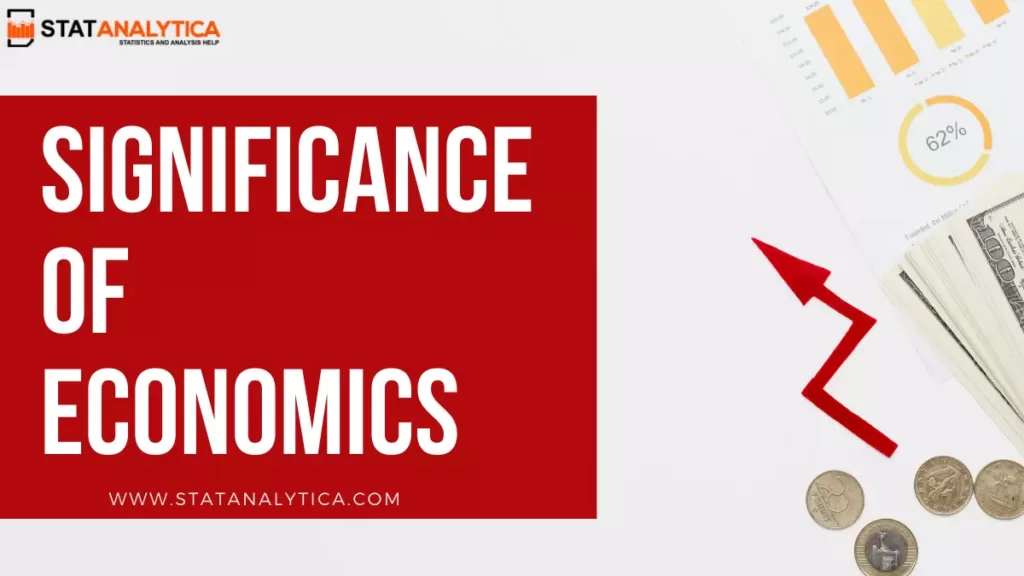
Top 8 Best Significance Of Economics Everyone Must Know
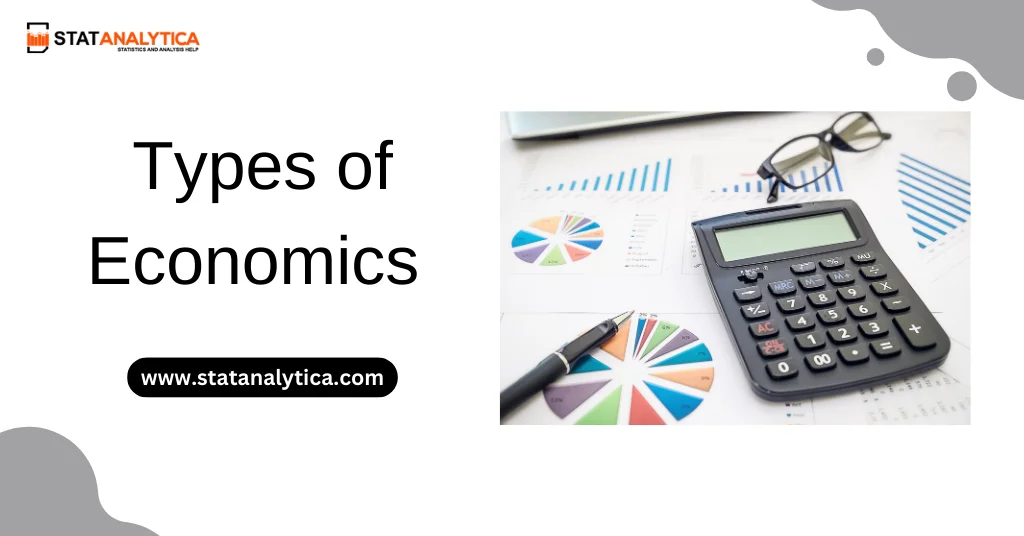
Types of Economics | Which Is The Most Popular Type of Economics?
Writing a College Paper – The List of Economics Topics to Consider
27 October, 2021
12 minutes read
Author: Kate Smith
If you are studying Economics, at some point in your student life you will get an essay or a research paper to complete. Most likely, you will have to write many of such papers in different subjects during four years of undergraduate studies and then during your Master’s. Besides this, you will have to write a degree paper to get your qualification. If such a perspective already makes you nervous, don’t worry: we will help you to get through these tasks. In this guide, we will make the definition of an Economics research paper clear to you, and also explain how to choose the best topic for writing. We will also share the latest Economics topics so that you can use them to complete your assignments.
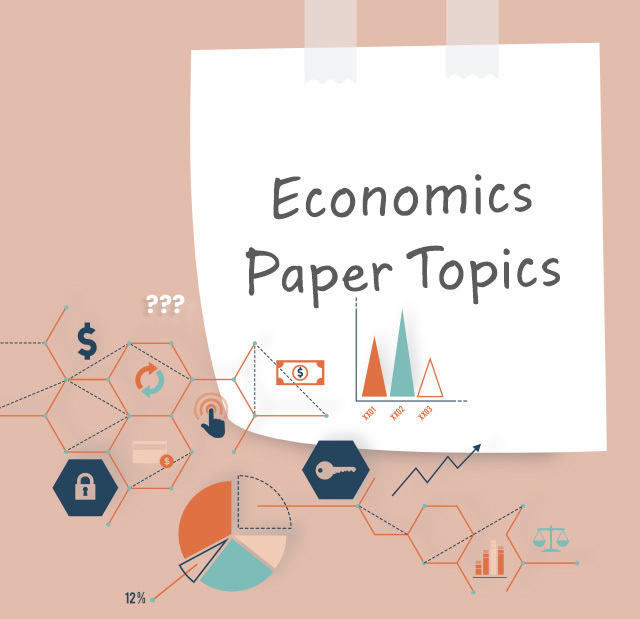
What Is an Economics Research Paper?
First of all, let’s find out what an Economics research paper is. An Economics research paper is an academic work written by students, graduates, or researchers of either of the Economics subfields. It aims to contribute to the current state of economics and help resolve potential economic issues.
There are a few types of Economics research papers you need to know. Below, you can find them and understand what kind of assignment you were given and how to approach it:
- Theoretical paper. The first type of Economics research paper is a theoretical one. While writing it, one needs to construct mathematical models to understand economic behavior. Graphical models are also possible to use in theoretical papers. But you don’t need to worry about writing them: due to their complexity, they are rarely required from undergraduate students;
- A literature survey. This is a paper that aims to review many sources on certain Economics topics that are interesting to an essay writer , compare them, and find links between them. Writing an Economics literature survey requires selecting the relevant sources on your own and reading a lot to produce a thoughtful paper.
- An empirical paper. When writing an empirical paper, a researcher needs to provide statistical data to prove or disprove their hypothesis. Also, such a paper often makes up a literature survey as its first part. Empirical papers are a popular type of assignment in colleges and universities;
- An issue paper. This paper deals with a certain position stated on a policy question. To resolve the issue, a student needs to use economic analysis and provide data to prove their point of view. You can base your analysis on the information received in classes, in additional reading, etc. Feel free to use graphs and tables in your paper as well. The more scholarly sources you find, the better;
- A case note. The last type of economic paper is a case note. This assignment deals with a certain legal case that needs to be assessed from an economic and legal point of view. In this paper, a student needs to describe the peculiarities of the case, the incident that led to a certain legal action, the procedure of investigation, and the court decision on the matter. The economic analysis is used to evaluate the relevant aspects of a court decision from an economics perspective.
A Quick Guide in Choosing the Right Topic

Now that you know the types of economic research papers, you need to understand how to choose the right economics papers topics. This is one of the most important stages of writing preparation, so pay close attention to the tips below:
- Find out what interests you the most in Economics subjects. For some reason, you have chosen Economics among dozens of other majors, so try to remember why you did it. Then, remember those economic problems you were about to resolve once you become an economist. These issues can be used as your potential Economics research paper topics;
- Create a list of the Economic topics to write about. Write down all the issues you’d like to explore while pursuing your degree in Economics. At the moment, don’t try to develop them in detail. You will do it a bit later;
- Pick a few topics that fall into the scope of a particular subject. Once you have the list of potentially interesting Economic topics, think about their relevance for the particular course you are studying. Do any of them sound reasonable for your current assignment? Mark them on your list if they do;
- Read background information on each of the topics. This step is required to understand how well these topics were researched before and how many sources you can find to base your reasoning on. Don’t omit this stage since it’s essential for writing a good paper on engaging and interesting topics in Economics;
- Discuss the chosen Economic research topics with your instructor. Now it’s time to ask your instructor to take a look at the topics of your interest and evaluate which ones fit your academic requirements best. Then, narrow down your topic to a certain issue to make your paper concrete. At this point, consider asking any questions you have regarding your research, scholarly sources, and formatting guidelines.
- Approve your topic and start working on it. Now, pick any of the economic research paper topics from our lists for instructor’s approval and start gathering references for them.
20 Undergraduates Economics Topics for Research
- The history of economic thought: from Ancient Times to the Medieval period.
- The breakthroughs in economic thought in the 20th century.
- The history of American economic thought.
- How can governments benefit from the law of self-interest?
- The law of competition: is it a major driver of the state economy?
- Role of agriculture in building a stable economy.
- The cultural heritage from an economic perspective: how can states benefit from it?
- Factors of unemployment in South America.
- Overcoming poverty in Venezuela: what can its government do in 2023?
- How does literacy influence a country’s economic success?
- Corporate social responsibility and economics: how do they correlate?
- The role of economic forecasting in building a steadfast economy?
- The structure of the USA market.
- The analysis of the workforce economics in Canada.
- Predicting the GDP of Mexico in the next five years.
- How does a stable economy help to reduce hunger?
- The importance of health insurance for wageworkers.
- The effect of chronic diseases on the middle-aged workforce in the USA.
- Is free health care beneficial for governments?
- The international trade in the 21st century: challenges and priorities.
20 Economic Debate Topics
- Pros and cons of taxes: is it still reasonable to pay them in the 21st century?
- The process of production: demand vs. supply.
- Should the government take control over the state economy?
- How can the government influence the labor market within the state?
- Capitalism vs socialism: a comparative analysis.
- Being an employer or an employee: the challenges and advantages.
- Remote work vs office work from the state economics perspective: pros and cons.
- The pros and cons of privatization of property.
- Why do governments implement neoliberal economic reforms in developing countries?
- Should Americans buy only made in USA products or imported ones?
- Should governments implement taxes for the rich?
- Should the USA compete with China?
- Credit cards should not be issued to those with low income.
- How are democracy and capitalism interconnected?
- How does war impact economic growth?
- Governments should cancel income tax: pros and cons.
- A perfect market cannot be reached anywhere in the world.
- Advantages of equal taxes for all American citizens.
- Greece’s exit from the EU did not impact other EU members.
- Homeschooling is more beneficial economically than studying in the classroom.
20 Interesting Behavioral Economics Research Topics
- Macy’s case study: the behavioral economics of discounting.
- The decoy effect and pricing: how corporations make people buy more.
- The benefits for American society from behavioral economics theory.
- The buying motivation of consumers from a behavioral economics point of view.
- The concept of the economy of trust.
- Uber case study as an example of the economy of trust.
- How consumption makes people happy and why.
- The phenomenon of shopaholism and its impact on modern world economics.
- How behavioral economists assess marketing: a detailed review.
- How to apply the theory of behavioral economics to real-life problem-solving?
- Behavioral economics as a discipline: the methods and peculiarities of teaching.
- Applying behavioral economics to environment protection: approaches and challenges.
- How can entrepreneurs benefit from behavioral economics theory in the UK?
- Why is conscious consumption good for the environment?
- Can behavioral economics principles be used to manage substance abuse in the USA?
- The impact of inflation on the consumer’s buying motivation.
- Cooperative behavior on criminals and police: a comparative analysis.
- Strategic reasoning.
- Studying morality and social preferences: how do they correlate?
- The concept of prospect theory and reference dependence.
20 Microeconomics Topics
- The methodology of Microeconomics.
- How marital status impacts the workforce composition in France.
- Analyzing consumer behavior trends: how the consumption attitude changed over the last 20 years.
- The market and competition concepts: how do they correlate?
- The sources and outcomes of inflation.
- How does competition impact pricing?
- Finding the demand and supply balance through a microeconomics perspective.
- Product expenses and profit explanation: how to spend less and get more out of goods production?
- The concept of perfect competition in microeconomics (with examples).
- Peculiarities of stock market work.
- Finding links between income changes and consumer choice.
- The correlation between salary level and economic convergence in Germany.
- The impact of demonetization on small and medium businesses.
- Salary inequalities in Virginia, USA: why do they exist and what forces are behind them?
- The concept of economics of uncertainty.
- What is the imperfect competition?
- Explaining the theory of production and its application to real-life cases.
- Studying microeconomics: the methodology of research.
- The economic nature of a firm: what purpose do we try to achieve by starting a small business?
- What is a natural monopoly and how is it regulated in the USA and Latin America?
20 Current Economic Topics
- Starting a business in pandemic times: challenges and outcomes.
- How hiring remote workers can save the state economy during COVID times?
- How to measure the state’s economic growth during a pandemic?
- How does gender influence buying capacity?
- The ways to lower consumption in the 21st century.
- Social media marketing in the USA: the potentials and challenges for new businesses.
- The role of digital marketing in consumer demand in 2023.
- The consumer buying capacity during COVID: did people start buying fewer goods?
- The future of the world economy after the pandemic ends.
- The ways to recover the state economies from the COVID recession.
- Do governments need to rethink their current economic policies in Africa?
- How to maintain the economic growth in Third World countries?
- Does overtime work contribute to the production: the case study of Nairobi leather factory.
- Green economics: the benefits for developing countries.
- The problem of unemployment in the EU and the methods of resolving it.
- The new ways to overcome poverty in North Africa.
- How to provide equal access to education in rural Asia?
- The effects of gambling on the modern US economy.
- Immigration trends and changes during COVID restrictions.
- The effects of fiscal policy on the modern EU economy.
Now that you have all the knowledge to write a proper Economics research paper, you can pick the best topic from dozens of themes in various economics subfields. The topics presented and analyzed above fit undergraduate as well as graduate students. So don’t hesitate to make your choice now, approve it with your professor, and start outlining your draft. Doing your best at every stage of writing will guarantee a high grade for your paper.

A life lesson in Romeo and Juliet taught by death
Due to human nature, we draw conclusions only when life gives us a lesson since the experience of others is not so effective and powerful. Therefore, when analyzing and sorting out common problems we face, we may trace a parallel with well-known book characters or real historical figures. Moreover, we often compare our situations with […]

Ethical Research Paper Topics
Writing a research paper on ethics is not an easy task, especially if you do not possess excellent writing skills and do not like to contemplate controversial questions. But an ethics course is obligatory in all higher education institutions, and students have to look for a way out and be creative. When you find an […]

Art Research Paper Topics
Students obtaining degrees in fine art and art & design programs most commonly need to write a paper on art topics. However, this subject is becoming more popular in educational institutions for expanding students’ horizons. Thus, both groups of receivers of education: those who are into arts and those who only get acquainted with art […]
- Department of Economics
- Postgraduate study
- PhD Programme in Economics
PhD research topics

Applications are welcomed in all Economics topics. We particularly welcome applications from candidates with research interests in the following speciality areas of our research-active staff:
Behavioural Economics
- Behavioural Health Economics and Policy
- Behavioural Labour and Organisational Economics
- Decisions under Risk and Uncertainty
- Experimental and Behavioural analyses of markets
- Charitable Behaviour
- Analysis of Conflict and Conflict Resolution
- Behavioural Welfare Economics (including subjective wellbeing)
Financial Economics and Household Finance
- Banking and financial stability
- Household portfolios
- Household wealth inequality
- Household saving
- Household financial vulnerability and asset accumulation
Gender, Race and Inequality
- Domestic violence
- Discrimination and Wellbeing
- Identity Economics (gender, ethnicity, inequality)
- Wealth inequality and racial wealth gap
- Affirmative Action Policies
Health Economics
- Healthcare and demographics
- Health, wellbeing and employment
- Long-run impact of COVID
- Aversion to inequality in multidimensional wellbeing
- Health state valuation and stated preferences
Industrial Organization
- Competition Policy
- Innovation, industrial policy and mixed markets
- Networks and Regulation
- Firms Productivity
- Tax compliance and administration
International Economics and Development
- Empirical development economics
- Foreign aid and development finance institutions
- Foreign Direct Investment and Economic Growth
- Trade models with heterogeneous firms, trade gravity and productivity growth
- Trade policies and public economics
Labour and Education Economics
- Empirical studies on the relationships between labour, health and wellbeing
- Education Economics
- Gender differences in human capital accumulation
- Labour market transitions of (young) workers
- Social mobility
- Vocational education
- Wages, employment and contract type
Macroeconomics
- Open Economy Macroeconomics
- Business Cycles
- Dynamic Stochastic General Equilibrium Modelling
- Labour Market Dynamics
- Search and Matching
Political Economy
- Elections, political ideology, institutions and economic policy
- Immigration: causes and consequences
- Terrorism, public attitudes and behavioural outcomes
- Rent-seeking and other contests
Time Series Econometrics
- Econometric detection of bubbles and crashes
- Specification testing and forecasting in non-linear Econometric/Time-Series models
- Theoretical econometrics and statistical inference
Urban and Environmental Economics
- Environmental economics and environmental policy
- Environmental reporting
- Real estate economics
- Local labour markets
- Agglomeration externalities
- Spatial distribution of economic activities and innovation
- Transport economics
- Local economic impacts and drivers of internal and external immigration
- Local and regional determinants of social mobility and inequality
- Levelling-up: drivers of local productivity and growth
Related information
How to apply for a PhD
Search for PhD opportunities at Sheffield and be part of our world-leading research.
Thesis Helpers
Find the best tips and advice to improve your writing. Or, have a top expert write your paper.
Top 50 Economic Topics For Your Research Paper Or Thesis

Choosing the best economics research topics is a major challenge for most learners pursuing economics studies. Economics entails the study of how humans use scarce resources in the production of valuables. Learners pursuing economics programs analyze how valuables are eventually distributed among society members after production.
Before learners are given economics research paper assignments, they are taught many elements that affect the economy. This enables them to understand real-life economies, as well as, daily expenditures and expenses. Such elements include medicine, politics, race, trade, unemployment, poverty, religion, and war among others.
As such, economics research topics for undergraduates should show their understanding of these issues and how they affect the economy. But, many learners have difficulties understanding different aspects of economics research. This makes choosing topics for their papers and essays difficult.
Tricks for Choosing the Best Economics Research Topics
Choosing research paper topics in economics is undoubtedly not easy for most students. That’s because a learner should choose a narrow topic so that they can delve deeper in analyzing and discussing it in their paper. But, if the topic is too narrow, it can be limiting. And, if it is too broad, the learner might not cover it exhaustively.
However, learners can still select the best economics research paper topics by following these guidelines:
Understand the subject matter and figure out whether the topic’s context is within your study field and writing ability. Select a topic that you find interesting and suitable for your understanding. Evaluate the scope of the topic to ensure that you can find the necessary information to write a comprehensive paper or essay about it. Consider the instructions provided by the instructor or professor in terms of topic selection
Before you start the actual writing of a paper or essay, brainstorm for ideas around several topics. That means you can have an economics research topics list from which to choose what to write about. Topics in this study field can be classified into different categories as follows.
Undergraduates Economics Topics for Research
Many students panic when asked to write undergraduate papers and essays. That’s because they don’t know how to choose the best economics topics for research paper. If you’re among students that are troubled by the thought of choosing a topic, here are examples presetned by our academic writers that you can choose from.
- What you should know about fiscal policy
- Describe the three opportunity costs
- How do banks set the exchange rate?
- How can profit maximization be achieved?
- Explain the major ethical rules in an economy
- How to conduct a cost-benefit analysis on your preferred action
- Explain why some resources are rare
- What does economic forecasting entail?
- Discuss the pros and cons of privatization
- How are the economies of both sides of a conflict affected by war?
These are great topics for economics research paper for undergraduate students. However, they still require in-depth research to come up with a coherent and comprehensive document.
Health Economics Research Topics
The health of citizens influences the economy of a country, though this might be unclear to some learners at first. Health research topics for economics lead to the production of papers and essays that are quite interesting to read. Here are sample topics in this category. You can also check our nursing research topics .
- How is the economy affected by a smoking ban?
- Is the world hunger affected by economics?
- How does perfect competition work in the pharmaceuticals world?
- How is free healthcare justified in the U.S?
- How do chronic diseases affect the workforce and the economy?
- Is health insurance important?
- How an unhealthy country translates into a poor country
- How can public hospitals optimize their revenue collection?
- How does an infectious disease outbreak affect the economy?
- The economics of the pharmaceutical industry
Interesting Behavioral Economics Research Topics
Some learners might not know about it but behavioral economics exists. And, some topics in this category are quite interesting to write about. Here are examples of topics that students in different study levels can write about in this category.
- Does money make most people happy?
- Why financial wellbeing makes most people happy
- What does the economy of trust mean?
- How can Uber be described as an aspect of the economy of trust?
- How does the brain change when a person is striking a great deal?
- Useful human insights that are missing in big data and how this affects the economy
- Per household economic analysis explained
- The buying capacity and gender
- How race relates to economic power
- Impact of economic stability on the social life of a person
Microeconomics Topics
Microeconomics studies revolve around trade between people. It’s trading at an individual level. This covers the basics of demand and supply. This is the category where some learners find simple research topics in economics. Here are examples of topics in this category.
- Understanding the competition and market concepts
- Inflation sources and consequences explained
- Explaining how competition influences the price
- Explaining the balance between supply and demand in microeconomics
- Opportunity costs explained from a microeconomics perspective
- Explaining production costs and profit
- How a stock market operates
- Perfect competition in microeconomics
- How unemployment affects microeconomics
- Aggregate demand and supply in microeconomics
Cool Environmental Economics Research Topics
The environment has more effects on an economy more than most people think. Ocean pollution can global warming are some of the environmental changes that affect the economy seriously. Here are some of the economics research topics for students to explore in this category.
- Cost-benefit analysis of the regulation of the environment
- Why it’s important to analyze the economics of clean drinking water
- Evolution of economics institution concerning climate change
- How greenhouses affect economic growth
- How global warming affects economic growth
- Detailed analysis of the European Union Emission Trading System
- Is waste management a rare resource?
- How technological advancement leads to economic growth
- Explain the energy markets’ economic potential
- How wildlife protection affects the economy
Students at different study levels have many research topics in economics to choose from. However, the research topic in economics that a learner chooses should be suitable for them based on their interests and academic goals. That’s because some topics are cumbersome to write about. They also require extensive knowledge and familiarity with different economic concepts to come up with a comprehensive document. Thus, they are ideal for students that are pursuing advanced studies. Nevertheless, every topic highlighted here requires in-depth economics research to come up with a concrete paper or essay.

Make PhD experience your own
Leave a Reply Cancel reply
Your email address will not be published. Required fields are marked *
International Economics Research Paper Topics

This page explores a diverse array of international economics research paper topics , providing students with a comprehensive list of ideas for their research projects. From trade policies to exchange rates, economic development to international financial systems, this page covers a wide range of key topics in international economics. Additionally, expert advice is offered to guide students in selecting the most suitable research topic, and essential tips are provided to assist in the process of writing an international economics research paper. To further support students, iResearchNet offers custom writing services, allowing them to order a tailored economics research paper with the assurance of top quality, expert writers, and timely delivery. Embrace the opportunity to enhance your understanding of global economic dynamics through engaging and well-crafted international economics research papers.
100 International Economics Research Paper Topics
To assist students in their quest to find compelling research paper topics in the field of international economics, we have curated a comprehensive list of diverse and engaging topics. These topics cover various aspects of international economics, providing students with a wide range of options to explore and delve into. The following categories present a collection of research topics that are both relevant and thought-provoking:
Academic Writing, Editing, Proofreading, And Problem Solving Services
Get 10% off with 24start discount code.
International Trade and Policies Research Paper Topics
- The Impact of Tariffs and Trade Barriers on International Trade
- Regional Trade Agreements and their Economic Effects
- Trade Liberalization and Economic Growth: A Comparative Analysis
- The Role of International Organizations in Shaping Global Trade Policies
- Trade Imbalances: Causes, Consequences, and Potential Solutions
- Global Value Chains: Trends and Implications for International Trade
- Bilateral vs. Multilateral Trade Agreements: Comparative Analysis
- Intellectual Property Rights and International Trade
- Trade in Services: Opportunities and Challenges for Global Economies
- Trade Disputes and Resolving International Trade Conflicts
Exchange Rates and Currency Markets Research Paper Topics
- Determinants of Exchange Rates: A Comparative Analysis
- Exchange Rate Regimes: Pros and Cons
- Exchange Rate Volatility and its Impact on International Trade
- Currency Manipulation: Implications for Global Financial Stability
- Optimal Currency Areas: Theory and Practice
- The Role of Central Banks in Managing Exchange Rates
- Exchange Rate Pass-Through: Effects on Domestic Prices and Inflation
- Currency Crises and Financial Contagion
- Foreign Exchange Market Efficiency: An Empirical Study
- Exchange Rate Forecasting Models: Evaluation and Comparison
Global Financial Systems Research Paper Topics
- Financial Globalization: Opportunities and Risks
- Cross-Border Capital Flows: Implications for Emerging Economies
- International Banking and Financial Intermediation
- Financial Regulations and their Impact on Global Markets
- Sovereign Debt Crisis: Causes, Contagion, and Resolution
- Financial Innovations and their Effects on Global Financial Systems
- Financial Stability and Systemic Risk in a Globalized Economy
- International Capital Markets: Trends and Challenges
- Foreign Direct Investment and its Economic Implications
- Financial Inclusion and Economic Development in Emerging Markets
Economic Development and Globalization Research Paper Topics
- Foreign Aid and its Role in Economic Development
- Sustainable Development Goals and Global Economic Progress
- The Role of Multinational Corporations in Economic Development
- Human Capital Development and Economic Growth
- Globalization and Income Inequality: Patterns and Policy Implications
- Technology Transfer and Economic Development
- The Role of Institutions in Promoting Economic Development
- Infrastructure Investment and Economic Development
- Gender Equality and Economic Empowerment in Developing Countries
- Migration and its Impact on Economic Development
International Financial Crises Research Paper Topics
- Causes and Consequences of the Global Financial Crisis
- Financial Contagion: Spillover Effects of Financial Crises
- International Financial Institutions and Crisis Management
- The Role of Government Policies in Preventing and Managing Financial Crises
- Currency Crises: Lessons from Historical Events
- Banking Sector Stability and Crisis Resilience
- Financial Risk Management in a Globalized Economy
- Systemic Risk and Macroprudential Policies
- Early Warning Systems for Financial Crises
- Crisis Recovery and Post-Crisis Reforms: Comparative Analysis
Global Economic Governance Research Paper Topics
- The Role of G7, G20, and International Monetary Fund in Global Economic Governance
- International Economic Law and its Implications for Global Trade
- Global Economic Governance and Sustainable Development
- Regional Economic Integration and its Impact on Global Governance
- International Taxation: Challenges and Policy Implications
- Intellectual Property Rights Protection in Global Trade
- Climate Change and Global Economic Governance
- Labor Standards and Social Responsibility in International Trade
- Digital Economy and its Implications for Global Governance
- Cross-Border Data Flows: Privacy and Security Concerns
Economic Policies and Macroeconomic Management Research Paper Topics
- Fiscal Policy and its Impact on Economic Growth
- Monetary Policy Strategies in a Globalized Economy
- Exchange Rate Policy and Macroeconomic Stability
- Inflation Targeting: Theory and Practice
- Public Debt Management in the Face of Global Economic Challenges
- Financial Regulation and Macroeconomic Stability
- Unemployment Policies: Comparative Analysis and Best Practices
- Economic Integration and Policy Coordination among Nations
- Structural Reforms for Sustainable Economic Development
- Income Distribution Policies in a Global Economy
Trade and Environment Research Paper Topics
- Environmental Policies and International Trade: Conflict or Compatibility?
- Carbon Pricing and its Economic Implications for Global Trade
- Sustainable Development and International Trade
- Trade and Deforestation: Challenges and Solutions
- Green Technologies and their Role in Global Trade
- Trade-Related Intellectual Property Rights and Environmental Conservation
- Climate Change Adaptation Strategies and International Trade
- Eco-labeling and Consumer Preferences in Global Markets
- Circular Economy and its Effects on International Trade
- Trade and Water Scarcity: Nexus and Policy Responses
International Labor Markets and Migration Research Paper Topics
- Labor Mobility and Economic Integration: Implications for Global Labor Markets
- International Trade and Labor Market Outcomes
- Migration Policies and their Economic Impact
- Remittances and Economic Development in Sending Countries
- Brain Drain and Brain Gain: The Economic Effects of High-Skilled Migration
- Labor Market Flexibility and Global Competitiveness
- Gender Wage Gap in International Labor Markets
- Skilled vs. Unskilled Immigration: Economic Consequences
- Labor Market Regulations and Employment Dynamics in Global Economies
- Migration and Social Integration: Challenges and Policy Approaches
Global Economic Challenges and Future Trends Research Paper Topics
- Technological Innovations and their Effects on Global Economies
- Global Economic Inequality: Causes, Consequences, and Policy Solutions
- Aging Populations and the Economic Implications for Nations
- Digital Disruption and the Transformation of Industries
- Blockchain Technology and its Potential Applications in Global Business
- Trade Wars and their Impact on International Trade
- Economic Resilience and Crisis Preparedness in a Globalized World
- Impact of Artificial Intelligence on Labor Markets and Productivity
- Economic Implications of Pandemics and Health Crises
- Economic Forecasting and Predictive Analytics in a Global Context
This list provides an extensive array of research topics in international economics. Students are encouraged to explore these categories and select a topic that aligns with their interests, research capabilities, and the availability of relevant data and resources.
International Economics Research Paper Writing Guide
Economics is a fascinating field that encompasses a wide range of topics, and one of the key areas within economics is international economics. As countries become increasingly interconnected, the study of international economics becomes vital in understanding the complexities of global markets, trade relations, and economic policies. For students pursuing a degree in economics, writing a research paper on international economics offers an opportunity to delve deeper into these intricacies and contribute to the field’s knowledge base.
This page serves as a valuable resource for students who are tasked with writing an international economics research paper. It provides a wealth of information, including a comprehensive list of international economics research paper topics, expert advice on selecting a suitable topic, and guidance on the research and writing process. Furthermore, students can take advantage of the custom writing services offered by iResearchNet to order a tailored economics research paper that meets their unique requirements.
Whether you are interested in exploring international trade, exchange rates, economic policies, or global financial systems, this page will assist you in finding an engaging and relevant research topic. Through careful examination and analysis of these topics, students can contribute to the understanding of international economics and its implications on global economic development.
Prepare to embark on a rewarding journey of research and exploration as we delve into the realm of international economics research paper topics. Discover the intriguing dynamics of the global economy and equip yourself with the knowledge and skills to make a significant contribution in this ever-evolving field.
Choosing International Economics Research Paper Topics
Choosing a compelling and relevant research paper topic in the field of international economics is a crucial step towards producing a high-quality and impactful paper. With the multitude of available topics, it can be challenging to narrow down your focus and select a topic that is both engaging and manageable. To help you navigate this process, we offer the following expert advice on choosing international economics research paper topics:
- Identify your Interests : Start by reflecting on your personal interests within the field of international economics. Consider topics that resonate with you and align with your career goals. Engaging with a topic you are passionate about will not only make the research process more enjoyable but also enhance the quality of your work.
- Stay Updated with Current Events : Keep abreast of current global economic issues and trends. Read reputable news sources, academic journals, and policy reports to identify emerging topics or areas of debate in international economics. Analyzing and addressing these contemporary issues will add relevance and significance to your research.
- Explore Controversial Topics : Consider researching topics that have varying viewpoints or controversial aspects. These topics often spark interesting discussions and allow you to critically analyze different perspectives. However, ensure that you approach controversial topics with objectivity and rigor, presenting a balanced view in your research.
- Consult with Professors or Experts : Seek guidance from your professors or experts in the field of international economics. They can provide valuable insights, suggest research areas, or share their expertise on specific topics. Their input can help you refine your research question and provide direction for your study.
- Review Existing Literature : Conduct a thorough review of existing literature in international economics. Identify gaps or areas where further research is needed. Building upon existing knowledge or exploring new dimensions of a topic can contribute to the advancement of the field and make your research more impactful.
- Consider Data Availability : Assess the availability of relevant data for your chosen topic. Data plays a crucial role in empirical research, and access to reliable and comprehensive data sets will strengthen the empirical analysis in your paper. Ensure that you have access to suitable data sources before finalizing your research topic.
- Balance Breadth and Depth : Strive to strike a balance between the breadth and depth of your research topic. While a broad topic can provide a comprehensive overview, a narrow focus allows for a more in-depth analysis. Consider the scope of your research project, the available resources, and the time constraints when selecting the level of breadth or depth for your topic.
- Collaborate and Discuss : Engage in discussions with your peers, classmates, or fellow researchers. Brainstorming and exchanging ideas can stimulate new perspectives and inspire unique research topics. Collaborative efforts can also lead to joint research projects, enabling you to explore complex topics or conduct cross-country studies.
- Consider Policy Relevance : Evaluate the policy relevance of your chosen topic. International economics research often addresses real-world economic issues and informs policy decisions. Selecting a topic with policy implications can make your research more impactful and applicable in the context of economic development and global governance.
- Seek Feedback : Once you have narrowed down your research topic, seek feedback from your professors, peers, or research advisors. Their insights can help you refine your research question, provide additional suggestions, or highlight potential challenges in your chosen topic.
By following these expert tips, you can select a compelling and relevant research topic in international economics that aligns with your interests, contributes to the field, and enables you to produce a high-quality research paper. Remember to approach your chosen topic with curiosity, rigor, and a commitment to advancing knowledge in the field of international economics.
How to Write an International Economics Research Paper
Writing a research paper in the field of international economics requires careful planning, rigorous analysis, and effective communication of your findings. To help you navigate the process, we provide a step-by-step guide on how to write an international economics research paper:
- Understand the Assignment : Familiarize yourself with the assignment guidelines provided by your instructor. Clarify the research question, required format, citation style, and any specific requirements or expectations for your paper.
- Conduct Preliminary Research : Begin by conducting preliminary research on your chosen topic. Review relevant academic literature, empirical studies, and policy reports to gain a comprehensive understanding of the topic and identify key research gaps or areas for further investigation.
- Develop a Clear Research Question : Formulate a clear and concise research question that defines the scope of your study. Ensure that your research question is specific, measurable, and aligned with the objectives of your research.
- Create an Outline : Develop an outline that organizes your paper and outlines the structure of your research. A typical research paper structure includes an introduction, literature review, research methodology, data analysis, findings, discussion, and conclusion.
- Conduct In-Depth Literature Review : Conduct a comprehensive literature review to identify the existing knowledge and research on your topic. Analyze and synthesize the findings from previous studies, highlighting the key theories, models, and empirical evidence that are relevant to your research question.
- Choose a Suitable Research Methodology : Select an appropriate research methodology that aligns with your research question and data availability. Common research methodologies in international economics include quantitative analysis, econometric modeling, case studies, or qualitative approaches. Justify your chosen methodology and explain how it will address your research question.
- Gather and Analyze Data : Collect relevant data to support your research findings. Ensure that your data collection methods are appropriate and reliable. Conduct rigorous data analysis using appropriate statistical techniques or qualitative methods, depending on the nature of your research.
- Interpret and Present Findings : Interpret your research findings and present them in a clear and organized manner. Use tables, charts, or graphs to visually represent your data. Provide a detailed analysis and explanation of your findings, relating them back to your research question and existing literature.
- Engage in Critical Discussion : Engage in a critical discussion of your findings by analyzing their implications, limitations, and significance. Discuss any discrepancies or unexpected results and provide possible explanations. Compare your findings with previous research and highlight their contributions to the field of international economics.
- Write a Coherent Conclusion : Summarize your research findings and main arguments in a concise and coherent conclusion. Restate your research question and objectives, and discuss the implications of your findings. Suggest avenues for future research and areas where further investigation is needed.
- Revise and Edit : Proofread your research paper carefully to ensure clarity, coherence, and proper grammar. Check for consistency in formatting, citations, and references. Revise and edit your paper multiple times to improve its overall quality and coherence.
- Seek Feedback : Share your research paper with peers, professors, or research advisors to gather feedback and suggestions for improvement. Incorporate constructive feedback into your paper to strengthen your arguments and enhance its overall quality.
By following these steps, you can effectively plan, conduct, and present your research in the field of international economics. Remember to maintain a rigorous and objective approach throughout your research process and communicate your findings in a clear and concise manner. Good luck with your international economics research paper!
Custom Writing Services
If you are looking for assistance with your economics research paper, our writing services are here to help. At iResearchNet, we offer custom economics research paper writing services to students like you who want to ensure a high-quality and well-crafted paper. Here’s how our services can benefit you:
- Expert Degree-Holding Writers : We have a team of experienced and knowledgeable writers who hold advanced degrees in economics. They have expertise in various subfields of economics, including international economics, econometrics, macroeconomics, microeconomics, and more. Our writers are skilled in conducting in-depth research, analyzing data, and producing well-structured and well-referenced research papers.
- Custom Written Works : When you order a research paper from us, you can be confident that it will be custom-written to meet your specific requirements. We follow your instructions and adhere to the highest academic standards to deliver a paper that is tailored to your needs.
- In-Depth Research : Our writers are adept at conducting comprehensive research on your chosen topic. They have access to reputable academic databases, scholarly journals, and reliable sources of economic data. They ensure that your research paper is grounded in solid theoretical frameworks and supported by relevant empirical evidence.
- Custom Formatting : We understand the importance of adhering to specific formatting styles in academic writing. Whether you require APA, MLA, Chicago/Turabian, Harvard, or any other formatting style, our writers will ensure that your research paper is formatted correctly and consistently throughout.
- Top Quality : We are committed to delivering research papers of the highest quality. Our writers meticulously review and edit their work to ensure clarity, coherence, and logical flow of ideas. They pay attention to detail, address all the requirements, and provide a well-structured and engaging paper.
- Timely Delivery : We understand the importance of meeting deadlines. When you place an order with us, we ensure that your research paper is delivered within the specified timeframe. Our writers work efficiently to complete the paper and allow sufficient time for revisions if needed.
- Confidentiality and Privacy : We prioritize the confidentiality and privacy of our clients. Your personal information and order details are kept strictly confidential. We use secure systems and protocols to protect your data and ensure that it remains secure.
- 24/7 Support : Our customer support team is available round the clock to assist you with any queries or concerns you may have. Whether you need assistance with placing an order, communicating with your writer, or tracking the progress of your research paper, our support team is here to help.
- Easy Order Tracking : We provide a user-friendly platform that allows you to easily track the progress of your order. You can communicate directly with your assigned writer, provide additional instructions or clarifications, and monitor the status of your paper.
- Money Back Guarantee : We are confident in the quality of our work. If, for any reason, you are not satisfied with the final research paper, we offer a money-back guarantee. Your satisfaction is our top priority, and we strive to ensure that you receive a paper that meets your expectations.
- Free Revisions : We understand that you may have specific requirements or preferences for your research paper. If you feel that any revisions or adjustments are necessary, we offer free revisions to ensure that the final paper meets your expectations. Your satisfaction is our priority, and we are committed to delivering a research paper that fulfills your requirements.
- Easy Ordering Process : Our ordering process is designed to be simple and user-friendly. Just provide us with the details of your research paper, including the topic, length, deadline, and any specific instructions or requirements. Once you submit your order, our team will review it and assign a suitable writer with expertise in your area of study. You can then communicate directly with your writer to discuss any additional details or clarifications.
Ordering a custom economics research paper from iResearchNet is a convenient and reliable way to obtain a well-researched and professionally written paper. Our team of expert writers is dedicated to helping you achieve academic success. Place your order today and experience the benefits of our custom writing services.
Take the Next Step Today!
Are you ready to take the stress out of writing your economics research paper? Look no further than iResearchNet. Our custom writing services are here to provide you with top-quality research papers tailored to your specific needs.
Take the first step towards a successful research paper by placing an order with iResearchNet. Simply visit our website, fill out the order form, and provide us with the details of your research paper. Our team will handle the rest, ensuring that you receive a high-quality, custom-written research paper that meets your requirements.
Don’t let the pressure of writing an economics research paper weigh you down. Trust our reliable and professional writing services to deliver the results you need. Place your order today and experience the difference iResearchNet can make in your academic journey.
ORDER HIGH QUALITY CUSTOM PAPER

- Browse All Articles
- Newsletter Sign-Up
DevelopmentEconomics →
No results found in working knowledge.
- Were any results found in one of the other content buckets on the left?
- Try removing some search filters.
- Use different search filters.
Research Topics & Ideas: Finance
120+ Finance Research Topic Ideas To Fast-Track Your Project
If you’re just starting out exploring potential research topics for your finance-related dissertation, thesis or research project, you’ve come to the right place. In this post, we’ll help kickstart your research topic ideation process by providing a hearty list of finance-centric research topics and ideas.
PS – This is just the start…
We know it’s exciting to run through a list of research topics, but please keep in mind that this list is just a starting point . To develop a suitable education-related research topic, you’ll need to identify a clear and convincing research gap , and a viable plan of action to fill that gap.
If this sounds foreign to you, check out our free research topic webinar that explores how to find and refine a high-quality research topic, from scratch. Alternatively, if you’d like hands-on help, consider our 1-on-1 coaching service .
Overview: Finance Research Topics
- Corporate finance topics
- Investment banking topics
- Private equity & VC
- Asset management
- Hedge funds
- Financial planning & advisory
- Quantitative finance
- Treasury management
- Financial technology (FinTech)
- Commercial banking
- International finance

Corporate Finance
These research topic ideas explore a breadth of issues ranging from the examination of capital structure to the exploration of financial strategies in mergers and acquisitions.
- Evaluating the impact of capital structure on firm performance across different industries
- Assessing the effectiveness of financial management practices in emerging markets
- A comparative analysis of the cost of capital and financial structure in multinational corporations across different regulatory environments
- Examining how integrating sustainability and CSR initiatives affect a corporation’s financial performance and brand reputation
- Analysing how rigorous financial analysis informs strategic decisions and contributes to corporate growth
- Examining the relationship between corporate governance structures and financial performance
- A comparative analysis of financing strategies among mergers and acquisitions
- Evaluating the importance of financial transparency and its impact on investor relations and trust
- Investigating the role of financial flexibility in strategic investment decisions during economic downturns
- Investigating how different dividend policies affect shareholder value and the firm’s financial performance
Investment Banking
The list below presents a series of research topics exploring the multifaceted dimensions of investment banking, with a particular focus on its evolution following the 2008 financial crisis.
- Analysing the evolution and impact of regulatory frameworks in investment banking post-2008 financial crisis
- Investigating the challenges and opportunities associated with cross-border M&As facilitated by investment banks.
- Evaluating the role of investment banks in facilitating mergers and acquisitions in emerging markets
- Analysing the transformation brought about by digital technologies in the delivery of investment banking services and its effects on efficiency and client satisfaction.
- Evaluating the role of investment banks in promoting sustainable finance and the integration of Environmental, Social, and Governance (ESG) criteria in investment decisions.
- Assessing the impact of technology on the efficiency and effectiveness of investment banking services
- Examining the effectiveness of investment banks in pricing and marketing IPOs, and the subsequent performance of these IPOs in the stock market.
- A comparative analysis of different risk management strategies employed by investment banks
- Examining the relationship between investment banking fees and corporate performance
- A comparative analysis of competitive strategies employed by leading investment banks and their impact on market share and profitability
Private Equity & Venture Capital (VC)
These research topic ideas are centred on venture capital and private equity investments, with a focus on their impact on technological startups, emerging technologies, and broader economic ecosystems.
- Investigating the determinants of successful venture capital investments in tech startups
- Analysing the trends and outcomes of venture capital funding in emerging technologies such as artificial intelligence, blockchain, or clean energy
- Assessing the performance and return on investment of different exit strategies employed by venture capital firms
- Assessing the impact of private equity investments on the financial performance of SMEs
- Analysing the role of venture capital in fostering innovation and entrepreneurship
- Evaluating the exit strategies of private equity firms: A comparative analysis
- Exploring the ethical considerations in private equity and venture capital financing
- Investigating how private equity ownership influences operational efficiency and overall business performance
- Evaluating the effectiveness of corporate governance structures in companies backed by private equity investments
- Examining how the regulatory environment in different regions affects the operations, investments and performance of private equity and venture capital firms

Asset Management
This list includes a range of research topic ideas focused on asset management, probing into the effectiveness of various strategies, the integration of technology, and the alignment with ethical principles among other key dimensions.
- Analysing the effectiveness of different asset allocation strategies in diverse economic environments
- Analysing the methodologies and effectiveness of performance attribution in asset management firms
- Assessing the impact of environmental, social, and governance (ESG) criteria on fund performance
- Examining the role of robo-advisors in modern asset management
- Evaluating how advancements in technology are reshaping portfolio management strategies within asset management firms
- Evaluating the performance persistence of mutual funds and hedge funds
- Investigating the long-term performance of portfolios managed with ethical or socially responsible investing principles
- Investigating the behavioural biases in individual and institutional investment decisions
- Examining the asset allocation strategies employed by pension funds and their impact on long-term fund performance
- Assessing the operational efficiency of asset management firms and its correlation with fund performance
Hedge Funds
Here we explore research topics related to hedge fund operations and strategies, including their implications on corporate governance, financial market stability, and regulatory compliance among other critical facets.
- Assessing the impact of hedge fund activism on corporate governance and financial performance
- Analysing the effectiveness and implications of market-neutral strategies employed by hedge funds
- Investigating how different fee structures impact the performance and investor attraction to hedge funds
- Evaluating the contribution of hedge funds to financial market liquidity and the implications for market stability
- Analysing the risk-return profile of hedge fund strategies during financial crises
- Evaluating the influence of regulatory changes on hedge fund operations and performance
- Examining the level of transparency and disclosure practices in the hedge fund industry and its impact on investor trust and regulatory compliance
- Assessing the contribution of hedge funds to systemic risk in financial markets, and the effectiveness of regulatory measures in mitigating such risks
- Examining the role of hedge funds in financial market stability
- Investigating the determinants of hedge fund success: A comparative analysis
Financial Planning and Advisory
This list explores various research topic ideas related to financial planning, focusing on the effects of financial literacy, the adoption of digital tools, taxation policies, and the role of financial advisors.
- Evaluating the impact of financial literacy on individual financial planning effectiveness
- Analysing how different taxation policies influence financial planning strategies among individuals and businesses
- Evaluating the effectiveness and user adoption of digital tools in modern financial planning practices
- Investigating the adequacy of long-term financial planning strategies in ensuring retirement security
- Assessing the role of financial education in shaping financial planning behaviour among different demographic groups
- Examining the impact of psychological biases on financial planning and decision-making, and strategies to mitigate these biases
- Assessing the behavioural factors influencing financial planning decisions
- Examining the role of financial advisors in managing retirement savings
- A comparative analysis of traditional versus robo-advisory in financial planning
- Investigating the ethics of financial advisory practices

The following list delves into research topics within the insurance sector, touching on the technological transformations, regulatory shifts, and evolving consumer behaviours among other pivotal aspects.
- Analysing the impact of technology adoption on insurance pricing and risk management
- Analysing the influence of Insurtech innovations on the competitive dynamics and consumer choices in insurance markets
- Investigating the factors affecting consumer behaviour in insurance product selection and the role of digital channels in influencing decisions
- Assessing the effect of regulatory changes on insurance product offerings
- Examining the determinants of insurance penetration in emerging markets
- Evaluating the operational efficiency of claims management processes in insurance companies and its impact on customer satisfaction
- Examining the evolution and effectiveness of risk assessment models used in insurance underwriting and their impact on pricing and coverage
- Evaluating the role of insurance in financial stability and economic development
- Investigating the impact of climate change on insurance models and products
- Exploring the challenges and opportunities in underwriting cyber insurance in the face of evolving cyber threats and regulations
Quantitative Finance
These topic ideas span the development of asset pricing models, evaluation of machine learning algorithms, and the exploration of ethical implications among other pivotal areas.
- Developing and testing new quantitative models for asset pricing
- Analysing the effectiveness and limitations of machine learning algorithms in predicting financial market movements
- Assessing the effectiveness of various risk management techniques in quantitative finance
- Evaluating the advancements in portfolio optimisation techniques and their impact on risk-adjusted returns
- Evaluating the impact of high-frequency trading on market efficiency and stability
- Investigating the influence of algorithmic trading strategies on market efficiency and liquidity
- Examining the risk parity approach in asset allocation and its effectiveness in different market conditions
- Examining the application of machine learning and artificial intelligence in quantitative financial analysis
- Investigating the ethical implications of quantitative financial innovations
- Assessing the profitability and market impact of statistical arbitrage strategies considering different market microstructures
Treasury Management
The following topic ideas explore treasury management, focusing on modernisation through technological advancements, the impact on firm liquidity, and the intertwined relationship with corporate governance among other crucial areas.
- Analysing the impact of treasury management practices on firm liquidity and profitability
- Analysing the role of automation in enhancing operational efficiency and strategic decision-making in treasury management
- Evaluating the effectiveness of various cash management strategies in multinational corporations
- Investigating the potential of blockchain technology in streamlining treasury operations and enhancing transparency
- Examining the role of treasury management in mitigating financial risks
- Evaluating the accuracy and effectiveness of various cash flow forecasting techniques employed in treasury management
- Assessing the impact of technological advancements on treasury management operations
- Examining the effectiveness of different foreign exchange risk management strategies employed by treasury managers in multinational corporations
- Assessing the impact of regulatory compliance requirements on the operational and strategic aspects of treasury management
- Investigating the relationship between treasury management and corporate governance
Financial Technology (FinTech)
The following research topic ideas explore the transformative potential of blockchain, the rise of open banking, and the burgeoning landscape of peer-to-peer lending among other focal areas.
- Evaluating the impact of blockchain technology on financial services
- Investigating the implications of open banking on consumer data privacy and financial services competition
- Assessing the role of FinTech in financial inclusion in emerging markets
- Analysing the role of peer-to-peer lending platforms in promoting financial inclusion and their impact on traditional banking systems
- Examining the cybersecurity challenges faced by FinTech firms and the regulatory measures to ensure data protection and financial stability
- Examining the regulatory challenges and opportunities in the FinTech ecosystem
- Assessing the impact of artificial intelligence on the delivery of financial services, customer experience, and operational efficiency within FinTech firms
- Analysing the adoption and impact of cryptocurrencies on traditional financial systems
- Investigating the determinants of success for FinTech startups

Commercial Banking
These topic ideas span commercial banking, encompassing digital transformation, support for small and medium-sized enterprises (SMEs), and the evolving regulatory and competitive landscape among other key themes.
- Assessing the impact of digital transformation on commercial banking services and competitiveness
- Analysing the impact of digital transformation on customer experience and operational efficiency in commercial banking
- Evaluating the role of commercial banks in supporting small and medium-sized enterprises (SMEs)
- Investigating the effectiveness of credit risk management practices and their impact on bank profitability and financial stability
- Examining the relationship between commercial banking practices and financial stability
- Evaluating the implications of open banking frameworks on the competitive landscape and service innovation in commercial banking
- Assessing how regulatory changes affect lending practices and risk appetite of commercial banks
- Examining how commercial banks are adapting their strategies in response to competition from FinTech firms and changing consumer preferences
- Analysing the impact of regulatory compliance on commercial banking operations
- Investigating the determinants of customer satisfaction and loyalty in commercial banking
International Finance
The folowing research topic ideas are centred around international finance and global economic dynamics, delving into aspects like exchange rate fluctuations, international financial regulations, and the role of international financial institutions among other pivotal areas.
- Analysing the determinants of exchange rate fluctuations and their impact on international trade
- Analysing the influence of global trade agreements on international financial flows and foreign direct investments
- Evaluating the effectiveness of international portfolio diversification strategies in mitigating risks and enhancing returns
- Evaluating the role of international financial institutions in global financial stability
- Investigating the role and implications of offshore financial centres on international financial stability and regulatory harmonisation
- Examining the impact of global financial crises on emerging market economies
- Examining the challenges and regulatory frameworks associated with cross-border banking operations
- Assessing the effectiveness of international financial regulations
- Investigating the challenges and opportunities of cross-border mergers and acquisitions
Choosing A Research Topic
These finance-related research topic ideas are starting points to guide your thinking. They are intentionally very broad and open-ended. By engaging with the currently literature in your field of interest, you’ll be able to narrow down your focus to a specific research gap .
When choosing a topic , you’ll need to take into account its originality, relevance, feasibility, and the resources you have at your disposal. Make sure to align your interest and expertise in the subject with your university program’s specific requirements. Always consult your academic advisor to ensure that your chosen topic not only meets the academic criteria but also provides a valuable contribution to the field.
If you need a helping hand, feel free to check out our private coaching service here.
You Might Also Like:

thank you for suggest those topic, I want to ask you about the subjects related to the fintech, can i measure it and how?
Submit a Comment Cancel reply
Your email address will not be published. Required fields are marked *
Save my name, email, and website in this browser for the next time I comment.
- Print Friendly
Areas of research
Budget, taxes and public investment.
EPI’s work on federal fiscal policy analyzes revenues, spending and deficits, but always within the context of the overall economy. EPI believes that the federal budget is the embodiment of our nation’s priorities, but recognizes that the state of budget balance is simply a tool to meet larger economic goals, not an end-goal in itself.
Child Labor
The Economic Policy Institute’s child labor research examines the role of strong labor standards in ensuring equal economic and educational opportunity for all children. Our work, including ground-breaking research, thought leadership, and advocacy, is focused on assessing the strengths or weaknesses of existing state and federal child labor policies, documenting ongoing coordinated attacks on protections for young workers, and proposing reforms to advance children’s rights to safe, age-appropriate work and fair compensation. As part of this agenda, EPI works in close coordination with partners in the Economic Analysis and Research Network (EARN) and in national child labor coalitions, provides expert analysis to the media and other stakeholders, and seeks to raise awareness through public events.
Economic Growth
EPI’s research on economic growth assesses how policymaking and economic institutions either help or hinder efforts to insure that the U.S. economy is operating at full employment and to generate sustainable growth in average living standards as rapidly as possible.
EPI documents impacts of social and economic inequality on student achievement, and suggests policies, within school and out, to narrow outcome gaps between middle class and disadvantaged students. EPI research refutes false assumptions behind politically inspired attacks on public education, teachers, and their unions.
Green Economics
EPI’s research in this arena focuses on the role that public investment, regulation, and tax policy play in making the economy more sustainable and equitable.
EPI analyzes the U.S. health care system through the lens of low- and moderate-income families’ living standards, with special attention to employer-sponsored health insurance, the burden of health costs, and disparities in access and outcomes.
Immigration
EPI proposes reforms that would allow the immigration system to respond and adjust to the shifting needs of the U.S. labor market while improving wages and safeguarding labor standards for American and immigrant workers.
Inequality and Poverty
As the United States recovers from the Great Recession, EPI’s research in this area examines the increasing levels of economic inequality in connection with decreasing levels of economic mobility and rising levels of poverty.
Jobs and Unemployment
EPI’s thorough research in this area is as critical as ever and focuses on understanding the intricacies and impact of the slow recovery in the U.S. labor market, including our persistent high unemployment, near-record long-term unemployment, mass underemployment, and weak labor force participation.
Minimum Wage
The minimum wage is a critical labor standard meant to ensure a fair wage for this country’s lowest paid workers. EPI researchers have examined how the minimum wage affects workers and the economy, who benefits from the minimum wage, and how the declining value of the federal minimum wage over time has contributed to the growth in U.S. income inequality.
Race and Ethnicity
EPI’s Program on Race, Ethnicity, and the Economy works to advance policies that ensure racial and ethnic minorities participate fully and benefit equitably as workers in the American economy.
Raising America’s Pay
EPI’s efforts to raise the profile of wage issues and generate ideas for stimulating wage growth are overseen by an advisory board of eminent policymakers, academics, policy experts, and civic engagement leaders. See the list of board members .
The debate over the effect of regulatory changes on employment has intensified in the wake of the Great Recession and the still-high levels of unemployment that are its legacy. But assertions that government regulations are holding back the economy ignore the roots of our economy’s problems, namely the collapse of the housing and financial sectors and inadequate demand. EPI research debunks claims that regulations impede job creation, finding that they can create jobs and confer other critical benefits that outweigh costs. This work is critical to fighting attempts to roll back laws that protect the environment and guarantee worker protections.
EPI’s retirement program examines the inequities in the current system and promotes initiatives that protect Social Security and lead to universal, secure, and adequate retirement policies.
Trade and Globalization
Trade and globalization policies have major effects on the wages and incomes of American workers and on the vitality of American industries such as manufacturing. EPI research identifies the economic benefits accruing to the nation, states, and congressional districts from negotiating better trade agreements and curbing currency manipulation and other unfair trade practices.
Unions and Labor Standards
Strong unions and employee organizing rights foster a vibrant middle class because the protections, rights, and wages that unions secure affect union and nonunion workers alike. Unfortunately, eroded labor standards, weakening unions, changing norms, guestworker policies that undercut wages, and monetary policies that prioritize controlling inflation over lowering unemployment have helped depress wages and erode living standards for all workers. EPI monitors factors that affect American work lives, including unpaid overtime, wage theft, the minimum wage, immigration laws, and collective bargaining rights.
Wages, Incomes, and Wealth
Ensuring that economic growth benefits hard-working Americans in the form of higher wages and rising living standards is the central economic challenge of our time. Unfortunately, wages for most workers grew exceptionally slowly between 1979 and 2012, despite productivity—which essentially measures the economy’s potential for providing rising living standards for all—rising 64%. In other words, most Americans, even those with college degrees, are treading water—despite working more productively (and being better educated) than ever. EPI research demonstrates that wage stagnation, weak income growth, and wealth disparities can be traced to policy decisions that have eroded the bargaining power of low- and middle-wage workers.
Sign up to stay informed
New research, insightful graphics, and event invites in your inbox every week.
Track EPI on Twitter
The Economics of Infertility: Evidence from Reproductive Medicine
WHO estimates that as many as 1 in 6 individuals of reproductive age worldwide are affected by infertility. This paper uses rich administrative population-wide data from Sweden to construct and characterize the universe of infertility treatments, and to then quantify the private costs of infertility, the willingness to pay for infertility treatments, as well as the role of insurance coverage in alleviating infertility. Persistent infertility causes a long-run deterioration of mental health and couple stability, with no long-run “protective” effects (of having no child) on earnings. Despite the high private non-pecuniary cost of infertility, we estimate a relatively low revealed private willingness to pay for infertility treatment. The rate of IVF initiations drops by half when treatment is not covered by health insurance. The response to insurance is substantially more pronounced at lower income levels. At the median of the disposable income distribution, our estimates imply a willingness to pay of at most 22% of annual income for initiating an IVF treatment (or about a 30% chance of having a child). At least 40% of the response to insurance coverage can be explained by a liquidity effect rather than traditional moral hazard, implying that insurance provides an important consumption smoothing benefit in this context. We show that insurance coverage of infertility treatments determines both the total number of additional children and their allocation across the socioeconomic spectrum.
We are grateful for helpful comments from seminar participants at the University of Michigan, Stanford University, University of Zurich, the Becker Friedman Health Economics Initiative Annual Conference, and the Whistler Junior Health Economics Summit. We thank Iliriana Shala at the Research Institute for Industrial Economics for excellent research assistance. We also gratefully acknowledge support from the National Science Foundation (CAREER SES-2144072, Persson), 2022 Stanford Discovery Innovation Fund (Polyakova), the National Institute on Aging (K01AG05984301, Polyakova), and the Sweden-America Foundation (Moshfegh). The content is solely the responsibility of the authors and does not necessarily represent the official views of the National Science Foundation or the National Institute on Aging. The views expressed herein are those of the authors and do not necessarily reflect the views of the National Bureau of Economic Research.
MARC RIS BibTeΧ
Download Citation Data
More from NBER
In addition to working papers , the NBER disseminates affiliates’ latest findings through a range of free periodicals — the NBER Reporter , the NBER Digest , the Bulletin on Retirement and Disability , the Bulletin on Health , and the Bulletin on Entrepreneurship — as well as online conference reports , video lectures , and interviews .

Economics for Disaster Prevention and Preparedness in Europe
Europe is facing overwhelming losses and destruction from climate-related disasters. From 1980 to 2022, weather and climate-related events across the EU caused total losses of about €650 billion , or around €15.5 billion per year. Recent disasters, such as floods in 2022 and wildfires in 2023, have highlighted the vulnerabilities of critical infrastructure, including emergency response buildings such as fire stations, but also roads and power lines.
To guide priority investments in disaster and climate resilience and strengthen financial resilience, the report series Economics for Disaster Prevention and Preparedness —developed by the World Bank and the European Commission—offers evidence and tools to help countries take a more strategic approach to boost their climate resilience. These approaches are also being promoted and operationalized through the ongoing Technical Assistance Financing Facility for Disaster Prevention and Preparedness (TAFF) , funded by the European Commission, and implemented by the World Bank and the Global Facility for Disaster Reduction and Recovery ( GFDRR ).
From Data to Decisions: Tools for making smart investments in prevention and preparedness in Europe
Half of EU Member States have fire stations located in areas with high levels of multiple hazards including wildfires, landslides, floods, or earthquakes. Investing in disaster resilience makes economic sense , and there is an urgency to scale up investments in disaster and climate resilience in a cost-effective and smart manner. This report provides guidance and examples on how to make focused and smart investments to increase the disaster and climate resilience of critical sectors, including those that provide emergency-response services. Risk data, analytical tools, and examples can guide decision-making toward high-priority areas and enable a strategic approach that maximizes benefits of investing in resilience.
Investing in Resilience: Climate adaptation costing in a changing world
The report provides new insights into the costs for a country to adapt to the impacts of climate change, new costing approaches, and best practices with estimated ranges for various sectors and multiple risks. While the estimated cost of climate adaptation varies significantly, in the EU, climate change adaptation costs up to the 2030s are estimated(based on extrapolation from national studies) to be between €15 billion to €64 billion. As Europe grapples with the escalating risks of climate change , the urgency to develop 'adaptation pathways' is paramount. These decision-making approaches enable countries to prepare and act amidst uncertainty, informed by current and future climate risks.
Financially Prepared: The case for pre-positioned finance
Floods, earthquakes, landslides and storms, wildfires and droughts, extreme heat risks create additional pressure on already constrained response and recovery budgets. The size of a potential funding gap due to major earthquakes and floods varies between €13 billion to €50 billion . Should a drought or a wildfire happen in a year where a major earthquake or flood has already occurred, there would be no funding available at the EU level to respond to a wildfire or drought event. Countries in Europe need to enhance their financial resilience through better data utilization and innovative financial instruments, including risk transfer to the private sector.
Related reports
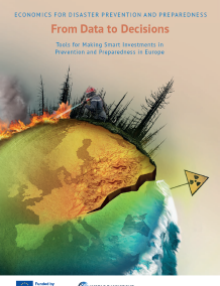
DOWNLOAD PDF

SUMMARY | BACKGROUND REPORT

This site uses cookies to optimize functionality and give you the best possible experience. If you continue to navigate this website beyond this page, cookies will be placed on your browser. To learn more about cookies, click here .
share this!
May 13, 2024
This article has been reviewed according to Science X's editorial process and policies . Editors have highlighted the following attributes while ensuring the content's credibility:
fact-checked
Research examines factors of resilient city development
by Higher Education Press
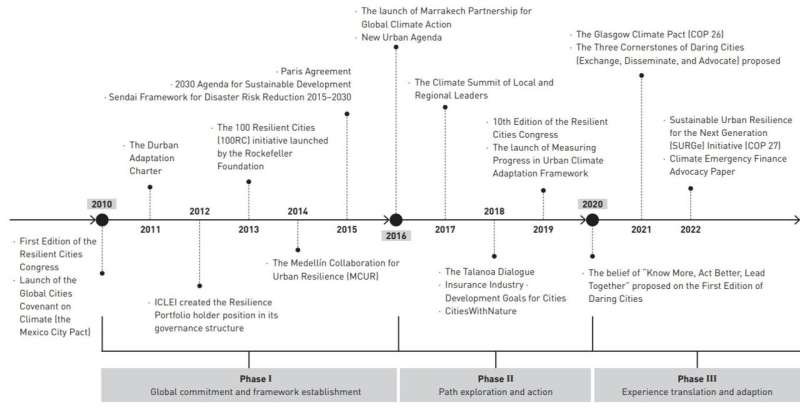
In recent years, with rapid urbanization, the global landscape of science and technology, industry, energy, and finance has undergone profound changes. Concurrently, emergencies or sudden events including natural disasters, human-induced disasters, and socio-economic crises are posing unrelenting threats to regional environment and security.
The concept of the "resilient city," as an important principle in contemporary urban planning, emphasizes that the capacity of urban systems to absorb the impacts and pressures caused by uncertain events while maintaining essential functions, structures, and characteristics.
The Resilient Cities Congress was initiated by ICLEI (International Council for Local Environment Initiatives)–Local Governments for Sustainability in 2010, as the first annual global forum dedicated to resilient cities studies.
In 2020, the Resilient Cities Congress was renamed the "Daring Cities," with the aim of building on the legacy of the Resilient Cities Congress series, enhancing the leadership role of governments, researchers, business leaders , and community organizers in urban decision-making process when responding to emergencies or sudden events, and forming new methods of urban governance and multi-stakeholder partnership models.
Drawing from the materials and scholarly work presented at these congresses, this research comprehensively reviews the evolution of resilient cities over the last decade through the lenses of policies and actions, summarizing the cutting-edge and current trends.
The work titled " From Resilient Cities Congress to Daring Cities: Policies, Actions, and Hot Trends of Resilient City Development " was published in the journal Landscape Architecture Frontiers .
Overall, the journey of global resilient cities unfolds in three phases of global commitment and framework establishment, path exploration and action, and experience translation and adaption. And after synthesizing the cases of global pioneering resilient city and regional construction cases from the Daring Cities, the experience of resilience actions can be summarized in five aspects:
- Multi-level governance and multi-stakeholder collaboration.
- Developing circular economy, and financing resilience and insuring cities.
- Nature-based solutions.
- Equal opportunities and access to basic services.
- Open data and strong data governance capability.
Throughout the previous Resilient Cities Congress series, the development of resilient cities in the past decade has evolved from theoretical exploration, framework establishment, and formulation of target strategies towards the implementation of regional and local actions and follow-up assessment, while integrating theoretical research into political decision-making that has in turn driven the progress of urban sustainable development.
Nowadays, with the development of big data and analytics technology, the construction of resilient cities not only requires deepening implementation at economic and social aspects, but also necessitates a series of effective measures in the field of cyber resilience to seize opportunities and mitigate risks, where information technology can and will play a vital role.
Looking ahead, it is crucial to further promote local resilience actions and practices, and to put more effort in filling the gaps of empirical research on resilient cities. It is of great practical significance to translate international resilience development results and action experience into localized efforts both in theory and practice at the national, regional, and city scales, so as to promote the full implementation of climate action and resilience building worldwide.
Provided by Higher Education Press
Explore further
Feedback to editors

Mystery CRISPR unlocked: A new ally against antibiotic resistance?
20 minutes ago

Researchers develop a detector for continuously monitoring toxic gases

Sea otter study finds tool use allows access to larger prey, reduces tooth damage

Accelerated discovery research unveils 21 novel materials for advanced organic solid-state laser technology

Breaking bonds to form bonds: New chemical reaction with potential applications in medicinal chemistry

Protein prediction technology yields accurate results to efficiently find the best drug candidate for many conditions

Scientists demonstrate the survival of quantum coherence in a chemical reaction involving ultracold molecules

New sensor gives unprecedented look at changes in ATP levels inside a cell

Study finds saying 'please' may not be so polite in everyday requests

Shedding light on perovskite hydrides using a new deposition technique
Relevant physicsforums posts, the secrets of prof. verschure's rosetta stones.
4 hours ago
A very puzzling rock or a pallasite / mesmosiderite or a nothing burger
May 8, 2024
M 4.8 - Whitehouse Station, New Jersey, US
What is global warming due to, large eruption at ruang volcano, indonesia.
May 2, 2024
Tidal friction and global warming
Apr 20, 2024
More from Earth Sciences
Related Stories

Are sponge cities a solution to growing urban flooding problems?
Oct 5, 2022

What next after 100 Resilient Cities funding ends?
Jun 6, 2019

Building African cities that cope with climate shocks—experts outline what it will take
Nov 30, 2023

Turning to nature to improve vital water treatment
Apr 22, 2024

Transforming urban sustainability: New study reveals cities' crucial contribution to meeting decarbonization goals
Aug 31, 2023

Defining a city using cell-phone data
Apr 5, 2024
Recommended for you

Carbon pricing works, major meta-study finds
2 hours ago

'Forever chemicals' found to rain down on all five Great Lakes
3 hours ago

Floating robots reveal just how much airborne dust fertilizes the Southern Ocean—a key climate 'shock absorber'

Summers warm up faster than winters, fossil shells from Antwerp show
May 15, 2024

Global methane emissions automatically detected in satellite imagery using AI

2023 was the hottest summer in 2,000 years, study finds
May 14, 2024
Let us know if there is a problem with our content
Use this form if you have come across a typo, inaccuracy or would like to send an edit request for the content on this page. For general inquiries, please use our contact form . For general feedback, use the public comments section below (please adhere to guidelines ).
Please select the most appropriate category to facilitate processing of your request
Thank you for taking time to provide your feedback to the editors.
Your feedback is important to us. However, we do not guarantee individual replies due to the high volume of messages.
E-mail the story
Your email address is used only to let the recipient know who sent the email. Neither your address nor the recipient's address will be used for any other purpose. The information you enter will appear in your e-mail message and is not retained by Phys.org in any form.
Newsletter sign up
Get weekly and/or daily updates delivered to your inbox. You can unsubscribe at any time and we'll never share your details to third parties.
More information Privacy policy
Donate and enjoy an ad-free experience
We keep our content available to everyone. Consider supporting Science X's mission by getting a premium account.
E-mail newsletter
A .gov website belongs to an official government organization in the United States.
A lock ( ) or https:// means you've safely connected to the .gov website. Share sensitive information only on official, secure websites.
- Preventing Chronic Diseases: What You Can Do Now
- Living with a Chronic Condition
- Chronic Disease Data
- Community Health Workers
- Workgroup on Translation Tools
- National Center for Chronic Disease Prevention and Health Promotion (NCCDPHP)
Fast Facts: Health and Economic Costs of Chronic Conditions
At a glance.
Chronic diseases account for most illness, disability, and deaths in the United States and are the leading drivers of health care costs.

The impact of chronic diseases in America
Ninety percent of the nation's $4.5 trillion in annual health care expenditures are for people with chronic and mental health conditions. 1 2 Interventions to prevent and manage these diseases have significant health and economic benefits .
Heart disease and stroke
Nothing kills more Americans than heart disease and stroke . More than 934,500 Americans die of heart disease or stroke every year—that's more than 1 in 4 deaths. 3 These diseases take an economic toll, as well, costing our health care system $251 billion per year and causing $156 billion in lost productivity on the job. Costs from cardiovascular diseases are projected to top $1 trillion by 2035. 3
See the health and economic benefits of high blood pressure interventions .
Each year in the United States, 1.7 million people are diagnosed with cancer , and more than 600,000 die from it, making it the second leading cause of death. The cost of cancer care continues to rise and is expected to reach more than $240 billion by 2030. 4
See the health and economic benefits of interventions for breast cancer , cervical cancer , colorectal cancer , and skin cancer .
More than 38 million Americans have diabetes , and another 98 million adults in the United States have prediabetes, which puts them at risk for type 2 diabetes. Diabetes can cause serious complications, including heart disease, kidney failure, and blindness. In 2022, the total estimated cost of diagnosed diabetes was $413 billion in medical costs and lost productivity. 5
See the health and economic benefits of diabetes interventions .
Obesity affects 20% of children and 42% of adults, putting them at risk of chronic diseases such as type 2 diabetes, heart disease, and some cancers. Over 25% of young people aged 17 to 24 are too heavy to join the U.S. military. Obesity costs the U.S. health care system nearly $173 billion a year. 6
Arthritis affects 53.2 million adults in the United States, which is about 1 in 5 adults. 7 It is a leading cause of work disability in the United States, one of the most common chronic conditions, and a leading cause of chronic pain. Arthritis costs appear to be increasing and were estimated at over $600 billion in 2019. 8 9
Alzheimer's disease
Alzheimer's disease , a type of dementia, is an irreversible, progressive brain disease that affects nearly 7 million Americans, including 1 in 9 adults aged 65 and older. Two-thirds of these older adults (4.1 million) are women. Deaths due to Alzheimer's disease more than doubled between 2000 and 2019, increasing 145%. The cost of caring for people with Alzheimer's and other dementias was an estimated $345 billion in 2023, with projected increases to nearly $1 trillion (in today's dollars) by 2050. 10
In the United States, about 3 million adults and about half a million children and teens younger than 18 have active epilepsy —meaning that they have been diagnosed by a doctor, had a recent seizure, or both. Adults with epilepsy report worse mental health, more cognitive impairment, and barriers in social participation compared to adults without epilepsy. In 2019, total health care costs (epilepsy-attributable and other health-related costs) for noninstitutionalized people with epilepsy was $13.4 billion, of which $5.4 billion were directly attributable to epilepsy. 11
Tooth decay
Cavities (also called tooth decay) are one of the most common chronic diseases in the United States. One in six children aged 6 to 11 years and 1 in 4 adults have untreated cavities. Untreated cavities can cause pain and infections that may lead to problems eating, speaking, and learning. On average, 34 million school hours are lost each year because of unplanned (emergency) dental care, and almost $46 billion is lost in productivity due to dental disease. 12 13
See the health and economic benefits of oral disease interventions .
Risk Factors
Cigarette smoking.
Cigarette smoking is the leading cause of preventable death and disease in the United States. More than 16 million Americans have at least one disease caused by smoking. This amounts to more than $240 billion in health care spending that could be reduced every year if we could prevent young people from starting to smoke and help every person who smokes quit. 14
See the health and economic benefits of tobacco use interventions .
Physical inactivity
Not getting enough physical activity comes with high health and financial costs. It can lead to heart disease, type 2 diabetes, some cancers, and obesity. 15 Physical inactivity also costs the nation $117 billion a year for related health care. 16
Excessive alcohol use
Excessive alcohol use is responsible for 140,000 deaths in the United States each year, including 1 in 5 deaths among adults aged 20 to 49 years. 17 18 Binge drinking is responsible for over 40% these deaths. 17 In 2010, excessive alcohol use cost the U.S. economy $249 billion, or $2.05 a drink, and $2 of every $5 of these costs were paid by the public. 19 Three-quarters of these costs were due to binge drinking.
- Buttorff C, Ruder T, Bauman M. Multiple Chronic Conditions in the United States . Rand Corp.; 2017.
- National health expenditure data: historical. Center for Medicare & Medicaid Services. Updated December 13, 2023. Accessed February 6, 2024. https://www.cms.gov/data-research/statistics-trends-and-reports/national-health-expenditure-data/historical
- Centers for Disease Control and Prevention, National Center for Health Statistics. Multiple Cause of Death 1999–2019 on CDC WONDER Online Database website. http://wonder.cdc.gov/mcd-icd10.html . Accessed February 1, 2023.
- Mariotto AB, Enewold L, Zhao J, Zeruto CA, Yabroff KR. Medical care costs associated with cancer survivorship in the United States. Cancer Epidemiol Biomarkers Prev. 2020;29:1304–1312.
- Parker ED, Lin J, Mahoney T, et al. Economic costs of diabetes in the U.S. in 2022. Diabetes Care. 2023. doi: 10.2337/dci23-0085
- Ward ZJ, Bleich SN, Long MW, Gortmaker SL. Association of body mass index with health care expenditures in the United States by age and sex. PLoS One . 2021;16(3):e0247307.
- Fallon EA, Boring MA, Foster AL, et al. Prevalence of diagnosed arthritis—United States, 2019–2021. MMWR Morb Mortal Wkly Rep . 2023;72:1101–1107.
- Murphy LB, Cisternas MG, Pasta DJ, Helmick CG, Yelin EH. Medical expenditures and earnings losses among US adults with arthritis in 2013. Arthritis Care Res (Hoboken) . 2018;70(6):869–876.
- Lo J, Chan L, Flynn S. A systematic review of the incidence, prevalence, costs, and activity and work limitations of amputation, osteoarthritis, rheumatoid arthritis, back pain, multiple sclerosis, spinal cord injury, stroke, and traumatic brain injury in the United States: a 2019 Update. Arch Phys Med Rehabil . 2021;102(1):115–131.
- Alzheimer's Association. 2023 Alzheimer's disease facts and figures. Alzheimers Dement . 2023;19(4).
- Moura LMVR, Karakis I, Zack MM, Tian N, Kobau R, Howard D. Drivers of US health care spending for persons with seizures and/or epilepsies, 2010-2018. Epilepsia . 2022;63(8):2144–2154.
- Righolt AJ, Jevdjevic M, Marcenes W Listl S. Global-, regional-, and country-level economic impacts of dental diseases. J Dent Res. 2018;97(5):501–507.
- Naavaal S, Kelekar U. Hours lost due to planned and unplanned dental visits among US adults. Health Behav Policy Rev. 2018;5(2):66–73.
- Xu X, Shrestha SS, Trivers KF, Neff L, Armour BS, King BA. U.S. healthcare spending attributable to cigarette smoking in 2014. Prev Med . 2021;150:106529.
- U.S. Department of Health and Human Services. Step It Up! The Surgeon General's Call to Action to Promote Walking and Walkable Communities . Office of the Surgeon General; 2015.
- Carlson SA, Fulton JE, Pratt M, Yang Z, Adams EK. Inadequate physical activity and health care expenditures in the United States . Prog Cardiovasc Dis . 2015;57:315–323.
- Centers for Disease Control and Prevention (CDC). Alcohol-Related Disease Impact (ARDI).
- Esser MB, Leung G, Sherk A, et al. Estimated deaths attributable to excessive alcohol use among US adults aged 20 to 64 years, 2015 to 2019. JAMA Netw Open . 2022;5(11):e2239485. doi: 10.1001/jamanetworkopen.2022.39485
- Sacks JJ, Gonzales KR, Bouchery EE, Tomedi LE, Brewer RD. 2010 national and state costs of excessive alcohol consumption. Am J Prev Med 2015;49(5):e73–e79.
Chronic Disease
Prevalence, costs, risks, prevention, and management of chronic diseases in the United States
For Everyone
Public health.
When the Export-Import Bank closed up, US companies saw global sales plummet

In recent years, export credit agencies have become a focal point of debate among policymakers and economists. These agencies, established by governments to facilitate international trade by providing assistance to companies, have come under scrutiny from critics who argue they waste taxpayer money by predominantly benefiting large corporations that don’t face financial constraints.
However, a new study coauthored by Chenzi Xu , an assistant professor of finance at Stanford Graduate School of Business, challenges this narrative. Xu is a faculty fellow at the Stanford Institute for Economic Policy Research (SIEPR).
Analyzing the impact of the temporary shutdown of the Export-Import Bank of the United States (EXIM) between 2015 and 2019, Xu and her coauthors find that companies relying on its support experienced a significant downturn in exports and saw their global sales plummet an average of 10 percent relative to similar firms.
This shock also led to a permanent reduction in EXIM-supported companies’ investments and employee headcount, underscoring the importance of trade financing. However, the study, published by the National Bureau of Economic Research , found no real difference in these companies’ return on assets. This finding challenges the prevailing notion that export credit simply bolsters profits without having a real impact on companies’ operations.
“Some people take a very dim view of export credit agencies, thinking that companies don’t need this support, considering it as corporate charity or a handout. However, our paper argues that these credit facilities serve a very important economic purpose,” Xu says.
Governments around the world have set up export credit agencies to help companies get financing for international trade when private sources are difficult to access. These agencies are ubiquitous in both advanced economies and developing countries. However, there’s disagreement about how much they help.
Proponents say they boost exports, create jobs, and help the domestic economy grow by filling gaps in private lending. Critics argue that they cause economic distortions, such as misallocating resources by extending taxpayer-funded support to companies that otherwise would be unable to export.
However, this notion is challenged by the new findings from Xu, Adrien Matray, an acting assistant professor of finance at Stanford GSB, and their colleagues Poorya Kabir and Karsten Müller of the National University of Singapore. Their paper shows that the decrease in global sales resulting from the shutdown of EXIM from 2015 to 2019 was mainly seen in firms with high returns to capital investment. This suggests that the agency wasn’t channeling resources to less-efficient firms.
Additionally, the paper finds that the EXIM closure caused a much bigger drop in sales — about five times higher — for companies that were already highly productive, based on their marginal revenue product of capital. This implies that the shutdown made it harder for money to flow to the most productive companies. And that could mean that cutting export credit subsidies might increase, rather than decrease, the misallocation of resources.
“Export credit agencies play a massive role in supporting companies facing financial obstacles in financing their exports. So there are huge potential economic consequences of curtailing export credit subsidies, as some critics have called for,” Xu says.
Closed for business
The EXIM closed in 2015 after the U.S. Congress did not renew its charter. As a result, the value of the agency’s financial support to firms declined by almost 85 percent between 2014 and 2019. It wasn’t until late 2019 that the agency’s charter was renewed and support for exports resumed.
One of the key questions Xu and Matray’s study raises is why companies benefiting from EXIM support were so significantly affected by its closure. Their research attributes this impact to these firms being financially constrained, perhaps because they were already highly leveraged, making it difficult to replace EXIM support with private sector support.
Xu and her colleagues also find that EXIM might be filling a lending gap left by the private financial sector. “As an agency of the U.S. government, it can have better loan loss recovery than a private bank might,” she explains. “This makes it profitable for EXIM to finance trade even to very risky countries in which the private sector is unlikely to operate.”
The study’s implications go beyond the immediate impacts of EXIM’s closure, raising broader questions about the effectiveness of export credit subsidies and their role in supporting productivity and trade. The findings suggest that policymakers must carefully consider the ramifications of reducing support for export credit agencies, as it could lead to inefficiencies in resource allocation and, ultimately, hinder economic growth.
“Our paper also found that industries that depended more on EXIM support experienced a bigger decline in exports — implying that the decrease in exports at the firm level also had broader effects on entire industries, rather than just shifting market share among U.S. companies in favor of those supported by EXIM,” Xu says.
“Can governments boost exports by providing targeted trade financing?” Xu, Matray, and their coauthors ask. “The results in this paper… suggest that the answer is yes.”
A version of this story was originally published May 3, 2024 by Stanford Graduate School of Business Insights.
More News Topics
Facebook went away. political divides didn't budge..
- Research Highlight
- Politics and Media
Adrien Auclert appointed as an economic advisor to French government
- Awards & Appointments
- Taxes and Public Spending
- Global Development and Trade
IMF's Gita Gopinath: Geopolitics and its impact on global trade and the dollar
- Money and Finance
Numbers, Facts and Trends Shaping Your World
Read our research on:
Full Topic List
Regions & Countries
- Publications
- Our Methods
- Short Reads
- Tools & Resources
Read Our Research On:
- Half of Latinas Say Hispanic Women’s Situation Has Improved in the Past Decade and Expect More Gains
3. Educational and economic differences among Latinas today
Table of contents.
- Assessing the progress of Hispanic women in the last 10 years
- Views of Hispanic women’s situation in the next 10 years
- Views on the gender pay gap
- Latinas’ educational attainment
- Latinas’ labor force participation
- Latinas’ earnings
- Latinas as breadwinners in their relationships
- Bachelor’s degrees among Latinas
- Labor force participation rates among Latinas
- Occupations among working Latinas
- Earnings among Latinas
- Latinas as breadwinners in 2022
- Appendix: Supplemental charts and tables
- Acknowledgments
- The American Trends Panel survey methodology
- Methodology for the analysis of the Current Population Survey
Though Latinas have collectively seen socioeconomic gains, their educational and economic circumstances are varied. Younger Latinas and U.S.-born Latinas, for instance, are more likely to report having a bachelor’s degree than older and immigrant Latinas, respectively. This chapter explores how other characteristics such as spouse or partner ethnicity and presence of their children at home are associated with differences in educational and economic outcomes.
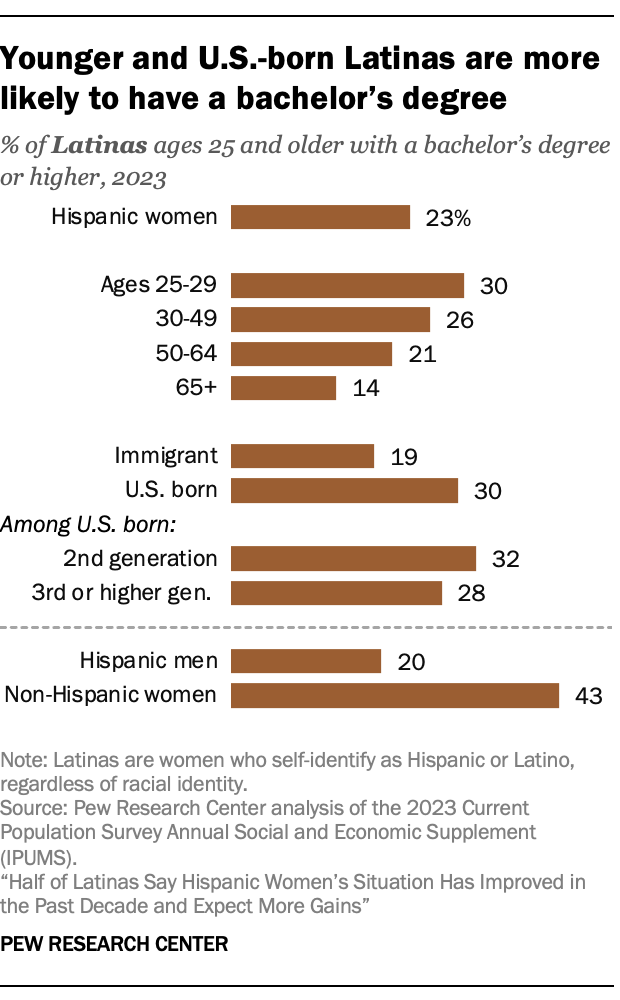
Some Latinas are more likely than others to have a bachelor’s degree.
- Age: Younger Latinas (ages 25 to 29) are about twice as likely as older Latinas (ages 65 or older) to hold a bachelor’s degree (30% vs. 14%).
- Nativity: U.S.-born Latinas are more likely than those born outside the U.S. to hold a bachelor’s degree (30% vs. 19%).
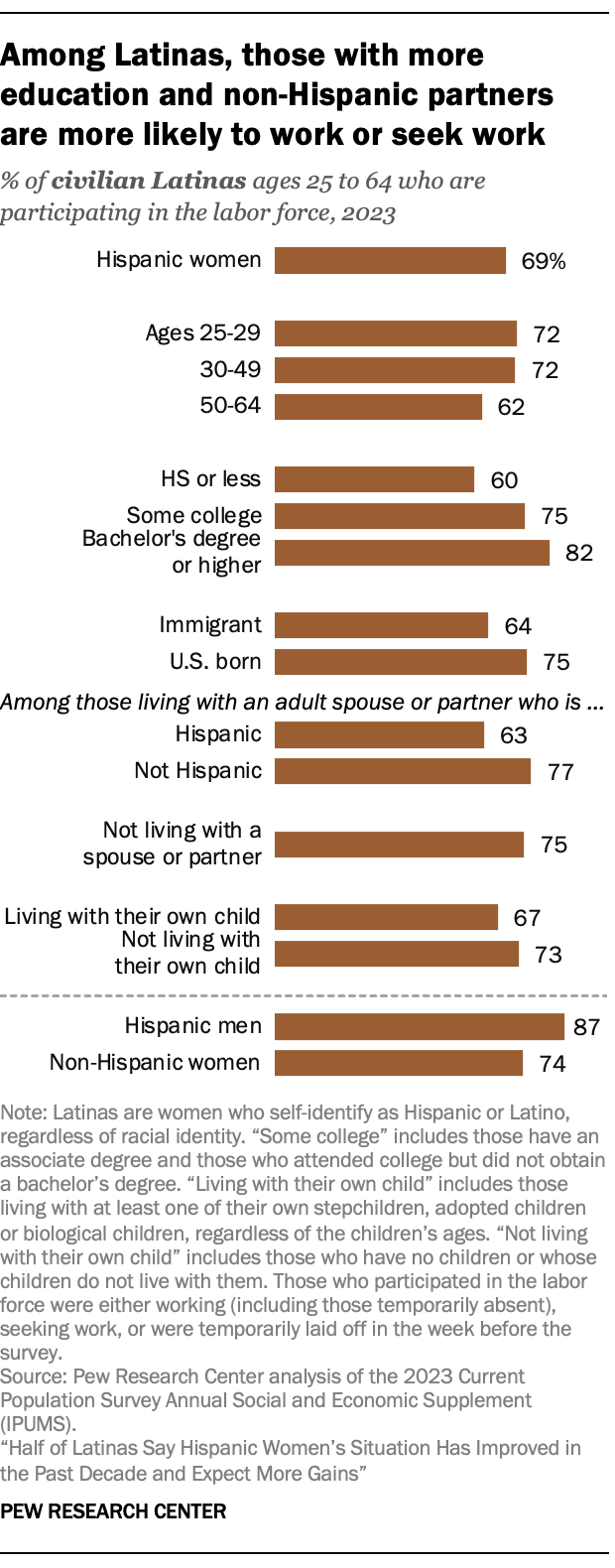
Though labor force participation rates have increased in the last two decades for Latinas overall, some are more likely to be employed or seeking work. Among civilians ages 25 to 64:
- Education: Latinas with a bachelor’s degree or higher are more likely than those with a high school education or less to participate in the labor force (82% vs. 60%).
- Nativity: U.S.-born Latinas are more likely than Latinas born outside the U.S. to participate in the labor force (75% vs. 64%).
- Spouse or partner: Latinas who are living with a Hispanic spouse or partner are less likely to work or seek work than those living with a non-Hispanic partner (63% vs. 77%).
- Children at home: Latinas with children in the home are less likely to work or seek work than Latinas without (67% vs. 73%).
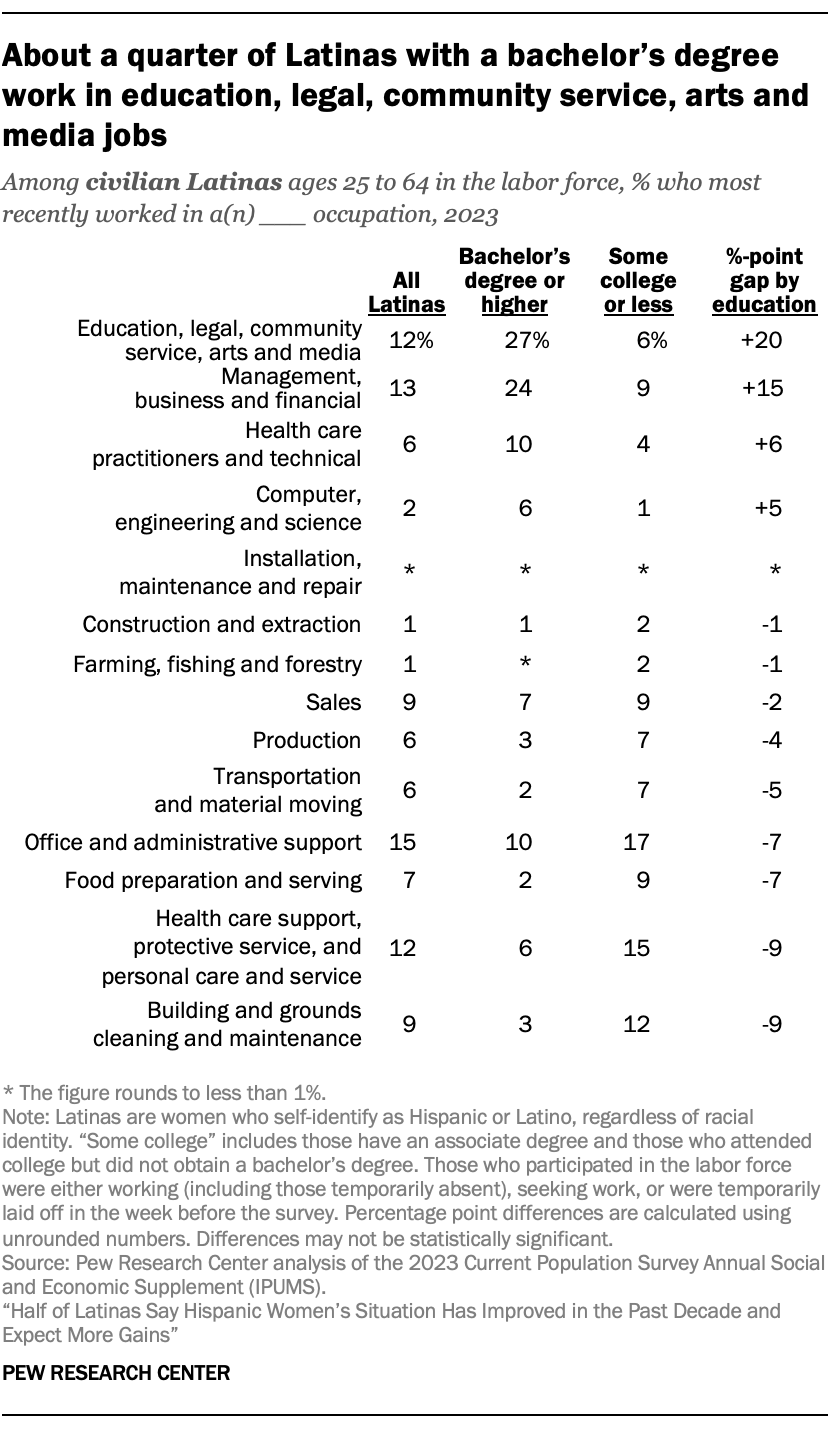
Among civilian Latinas ages 25 to 64 who were employed or looking for work in 2023, 15% work in office and administrative support occupations. Similar shares work in management, business and financial occupations (13%) and education, legal, community service, arts and media occupations (12%).
The kinds of occupations Latinas most recently worked in are also associated with whether they have a bachelor’s degree. Among civilian Latinas ages 25 to 64 who were employed or looking for work in 2023:
- Those with a bachelor’s are most likely to have education, legal, community service, arts and media jobs (27%) or management, business and financial jobs (24%).
- For those without a bachelor’s, the most common occupational groups are office and administrative support (17%) and health care support, protective service, and personal care and service (15%).
- Those with a bachelor’s degree are less likely than those without one to work in health care support, protective service, and personal care and service occupations (6% vs. 15%, respectively) and building and grounds cleaning and maintenance occupations (3% vs. 12%).
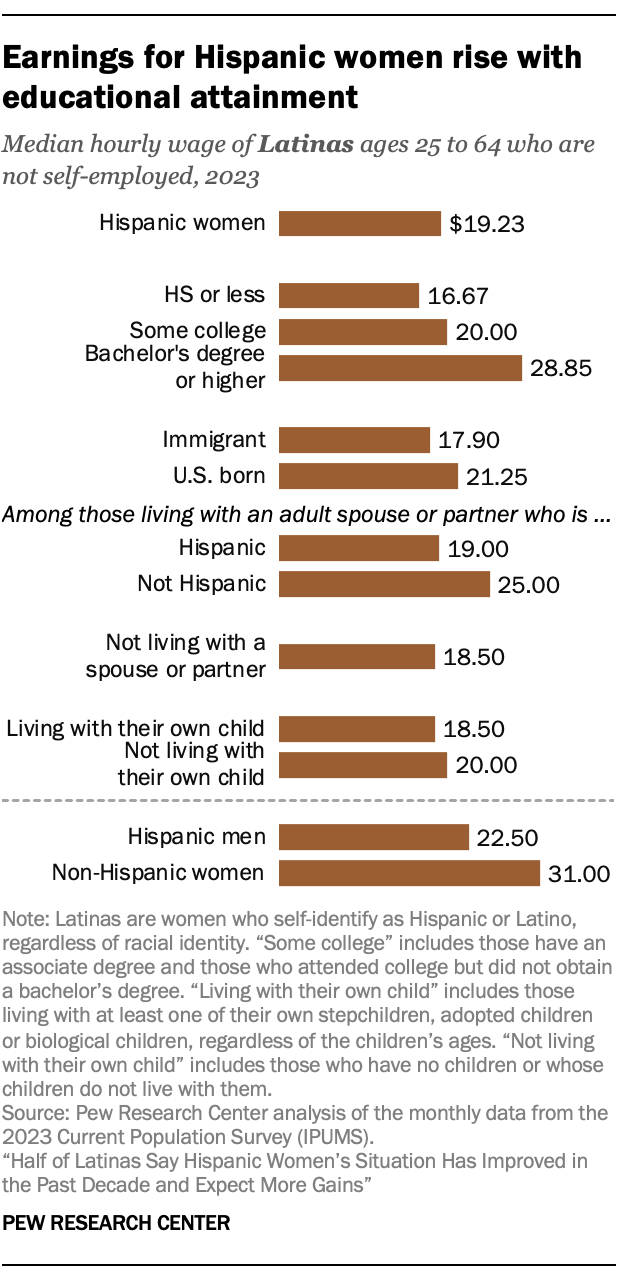
Though wages have increased for Latinas overall in the last two decades, some earn more than others. Among Latinas ages 25 to 64 who are not self-employed:
- Education: Latinas with a bachelor’s degree make $28.85 per hour (at the median) while those with a high school education or less earn $16.67 per hour.
- Nativity: U.S.-born Latinas make more per hour than immigrant Latinas ($21.25 vs. $17.90).
- Spouse or partner: Hispanic women who live with a spouse or partner earn roughly the same as those without a spouse or partner. However, Hispanic women living with a non- Hispanic spouse or partner make significantly more at the median than those living with a Hispanic spouse or partner ($25.00 vs. $19.00).
- Children at home: Latinas living with their children earn about the same as Latinas not living with their children ($18.50 vs. $20.00).
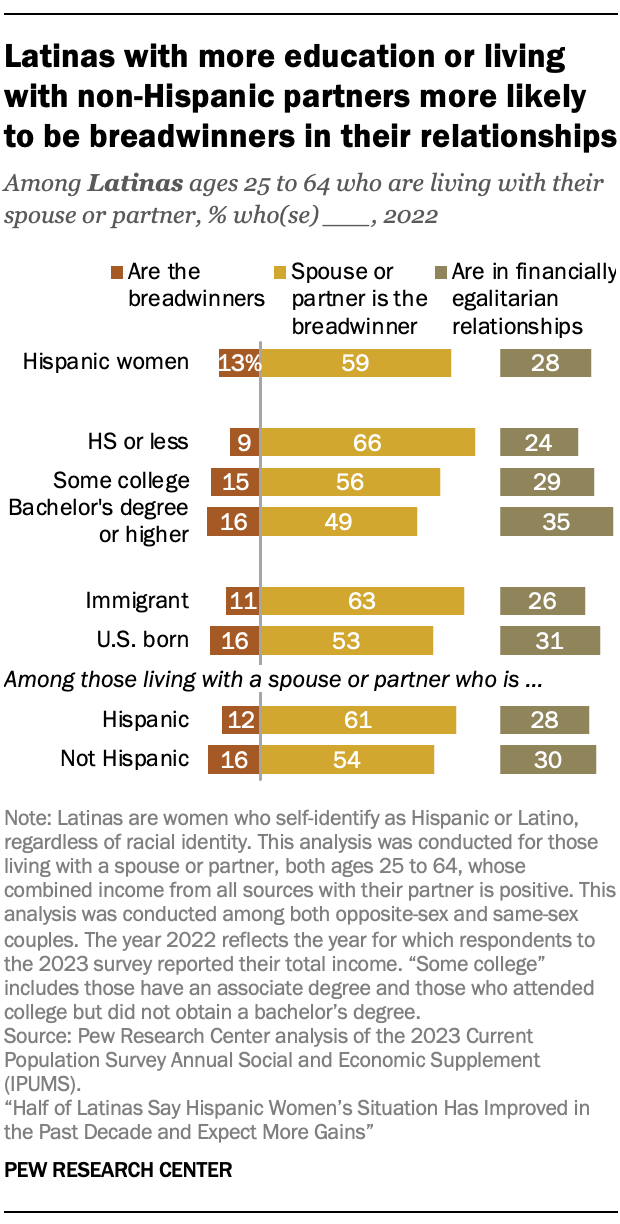
Overall, 13% of Hispanic women living with their spouse or partner are the breadwinners of their couples. Another 28% of Latinas are in financially egalitarian relationships, while the remaining 59% are living with a breadwinner spouse or partner.
Some Latinas are more likely than others to be either their relationships’ breadwinners or in financially egalitarian relationships with their spouse or partner.
- Education: Latinas with a bachelor’s degree or higher were more likely than those with a high school education or less to be breadwinners (16% vs. 9%, respectively) or in financially egalitarian relationships (35% vs. 24%).
- Spouse or partner: Hispanic women living with a partner or spouse who is not Hispanic were more likely than those with a Hispanic spouse or partner to be the breadwinner of their relationship (16% vs. 12%, respectively). They were also less likely than their Hispanic-partnered counterparts to say their spouse or partner was the breadwinner (54% vs. 61%).
Sign up for our weekly newsletter
Fresh data delivery Saturday mornings
Sign up for The Briefing
Weekly updates on the world of news & information
- Economics, Work & Gender
- Education & Gender
- Educational Attainment
- Gender & Work
- Gender Equality & Discrimination
- Gender Pay Gap
- Higher Education
- Hispanics/Latinos
- Hispanics/Latinos & Education
Key facts about U.S. Latinos with graduate degrees
Hispanic enrollment reaches new high at four-year colleges in the u.s., but affordability remains an obstacle, u.s. public school students often go to schools where at least half of their peers are the same race or ethnicity, what’s behind the growing gap between men and women in college completion, for u.s. latinos, covid-19 has taken a personal and financial toll, most popular, report materials.
1615 L St. NW, Suite 800 Washington, DC 20036 USA (+1) 202-419-4300 | Main (+1) 202-857-8562 | Fax (+1) 202-419-4372 | Media Inquiries
Research Topics
- Age & Generations
- Coronavirus (COVID-19)
- Economy & Work
- Family & Relationships
- Gender & LGBTQ
- Immigration & Migration
- International Affairs
- Internet & Technology
- Methodological Research
- News Habits & Media
- Non-U.S. Governments
- Other Topics
- Politics & Policy
- Race & Ethnicity
- Email Newsletters
ABOUT PEW RESEARCH CENTER Pew Research Center is a nonpartisan fact tank that informs the public about the issues, attitudes and trends shaping the world. It conducts public opinion polling, demographic research, media content analysis and other empirical social science research. Pew Research Center does not take policy positions. It is a subsidiary of The Pew Charitable Trusts .
Copyright 2024 Pew Research Center

COMMENTS
Development Economics Research Topics. The relation between development and incentive for migration. The economic consequences of population growth in developing countries. The determinants of high-performing institutions in emerging economies. The impact of globalization on income distribution in emerging economies.
Economics Research Topics are as follows: The impact of technological change on income inequality. An analysis of the relationship between exchange rates and foreign direct investment. The effects of tax incentives on small business growth and development. The determinants of economic growth in developing countries.
Macroeconomics Research Topics. 1. The relationship between economic growth and unemployment in [your country] 2. Global recession and factors that contribute to it. 3. Impact of government expenditure on economic growth in [country] 4. The impact of company income tax revenue on the developing economies- A comparative analysis of Kenya, India ...
All NBER research is categorized into topic areas that collectively span the field of economics. Featured Topics. COVID-19. ... National Bureau of Economic Research. Contact Us 1050 Massachusetts Avenue Cambridge, MA 02138 617-868-3900 [email protected] [email protected]. Homepage; Accessibility Policy;
The economics of alcohol abuse problems. In this thesis, students can develop several essential issues. First, they can examine how poverty is connected to alcohol abuse. Second, they can see the link between alcohol consumption and productivity. To sum up, students can elaborate on the economic costs of alcohol abuse.
This study sheds light on the political pathology of fraudulent, illegal, and corrupt business practices. Features of the Chinese system—including regulatory gaps, a lack of formal means of property protection, and pervasive uncertainty—seem to facilitate the rise of mafia systems. 02 Feb 2021. Working Paper Summaries.
Inspiring Young Women to Pursue Economics. A January Open Vault post previewed a February 2021 event that is "designed to inspire young women and underrepresented minorities who may be interested in econ—and to encourage those pursuing a degree to persist.". The next Women in Economics Symposium is set for Feb. 23-24, 2022.
This list of economics research paper topics is intended to provide students and researchers with a comprehensive guide for selecting research topics in the field of economics. The guide is organized into 20 categories covering a broad range of economic research topics. These categories include economic theory, microeconomics, macroeconomics, econometrics, international economics, behavioral ...
Global projections of the economic impacts of climate change have usually focused on rising average temperatures. Now, two studies depict more complex and gloomier scenarios by incorporating ...
Labs and Centers. Our faculty and affiliated researchers work across a wide range of disciplines and interest areas, using economic science to help tackle the complex issues surrounding global poverty, health care, education, and more. Learn more about our labs and centers.
What Are Economics Research Topics? Economics is a social science that studies how people, businesses, and governments make decisions about how to use resources. It deals with issues like production, distribution, and consumption of goods and services. As a student, you might be given to write a research paper on research topics in economics.
What is IDEAS? IDEAS is the largest bibliographic database dedicated to Economics and available freely on the Internet. Based on RePEc, it indexes over 4,700,000 items of research, including over 4,200,000 that can be downloaded in full text.. RePEc is a large volunteer effort to enhance the free dissemination of research in Economics which includes bibliographic metadata from over 2,000 ...
Five-page review of literature relevant to research paper topic due at the beginning of class. •March 20. Five-page description of model or data to be used in research paper due at the beginning of class. •April 10. Five-page summary of research paper results due at the beginning of class. •May 1. Completed research paper (drawing on but
The Weiss Fund for Research in Development Economics is funded by the CRI Foundation and aims to sponsor research that will positively affect the lives of poor people in poor countries. Learn more. Faculty Feature. Professor Robin Lee and his co-author, Professor Kate Ho, have just been announced as the winners of the 2020 Frisch Medal of the ...
400+ Economic Project Topics: How to Choose and Excel in Research. Economic project topics play a pivotal role in the academic journey of students pursuing degrees in economics or related fields. These topics serve as the foundation for research, analysis, and the development of critical thinking skills. Selecting the right economic project ...
Approve your topic and start working on it. Now, pick any of the economic research paper topics from our lists for instructor's approval and start gathering references for them. 20 Undergraduates Economics Topics for Research. The history of economic thought: from Ancient Times to the Medieval period.
Applications are welcomed in all Economics topics. We particularly welcome applications from candidates with research interests in the following speciality areas of our research-active staff: Behavioural Economics. Behavioural Health Economics and Policy; Behavioural Labour and Organisational Economics; Decisions under Risk and Uncertainty
Here are some of the economics research topics for students to explore in this category. Cost-benefit analysis of the regulation of the environment. Why it's important to analyze the economics of clean drinking water. Evolution of economics institution concerning climate change. How greenhouses affect economic growth.
100 International Economics Research Paper Topics. To assist students in their quest to find compelling research paper topics in the field of international economics, we have curated a comprehensive list of diverse and engaging topics. These topics cover various aspects of international economics, providing students with a wide range of options ...
New research on development economics from Harvard Business School faculty on issues including the between mental health and economic productivity, the "Argentina Paradox," and strategy and execution for emerging markets.
The department divides its research and extension programs into four broad categories: Environmental and Resource Economics; Food Systems; Growth, Development and Trade and Public Sector Economics. Environmental and Resource Economics Managing Natural Resources and Safeguarding Environmental Quality Food Systems Production, Distribution and Consumption of Safe, Affordable Food
A comprehensive list of research topics and ideas in finance, including corporate finance, fintech, banking and many more. About Us; Services. 1-On-1 Coaching. Topic Ideation; Research Proposal; ... The folowing research topic ideas are centred around international finance and global economic dynamics, delving into aspects like exchange rate ...
Child Labor. The Economic Policy Institute's child labor research examines the role of strong labor standards in ensuring equal economic and educational opportunity for all children. Our work, including ground-breaking research, thought leadership, and advocacy, is focused on assessing the strengths or weaknesses of existing state and federal ...
DOI 10.3386/w32445. Issue Date May 2024. WHO estimates that as many as 1 in 6 individuals of reproductive age worldwide are affected by infertility. This paper uses rich administrative population-wide data from Sweden to construct and characterize the universe of infertility treatments, and to then quantify the private costs of infertility, the ...
To guide priority investments in disaster and climate resilience and strengthen financial resilience, the report series Economics for Disaster Prevention and Preparedness —developed by the World Bank and the European Commission—offers evidence and tools to help countries take a more strategic approach to boost their climate resilience.
In recent years, with rapid urbanization, the global landscape of science and technology, industry, energy, and finance has undergone profound changes. Concurrently, emergencies or sudden events ...
More than 934,500 Americans die of heart disease or stroke every year—that's more than 1 in 4 deaths. 3 These diseases take an economic toll, as well, costing our health care system $251 billion per year and causing $156 billion in lost productivity on the job. Costs from cardiovascular diseases are projected to top $1 trillion by 2035. 3.
Filter Publications by Topic; Centers and Initiatives. California Policy Research Initiative (CAPRI) Stanford Center on China's Economy and Institutions (SCCEI) ... Xu is a faculty fellow at the Stanford Institute for Economic Policy Research (SIEPR). Analyzing the impact of the temporary shutdown of the Export-Import Bank of the United States ...
Education: Latinas with a bachelor's degree make $28.85 per hour (at the median) while those with a high school education or less earn $16.67 per hour. Nativity: U.S.-born Latinas make more per hour than immigrant Latinas ($21.25 vs. $17.90). Spouse or partner: Hispanic women who live with a spouse or partner earn roughly the same as those ...